ColorWhistle
Digital Web Design Agency India


Explore our Market-Fit Services
We ensure to establish websites with the latest trends as we believe that, products whose value satisfies the needs of the market and its potential customers can be efficiently successful.
Quick Links
- About Us – ColorWhistle
- Engagement Models
- Testimonials
- Case Studies
- Agency Services
- Web Development
- Web App Development
- Digital Marketing
- Travel Website Development Services Company
- Real Estate Website Development Services Company
- Education Website Development Services Company
- Healthcare Website Development Services Company
- Hotel and Restaurant Website Development Services
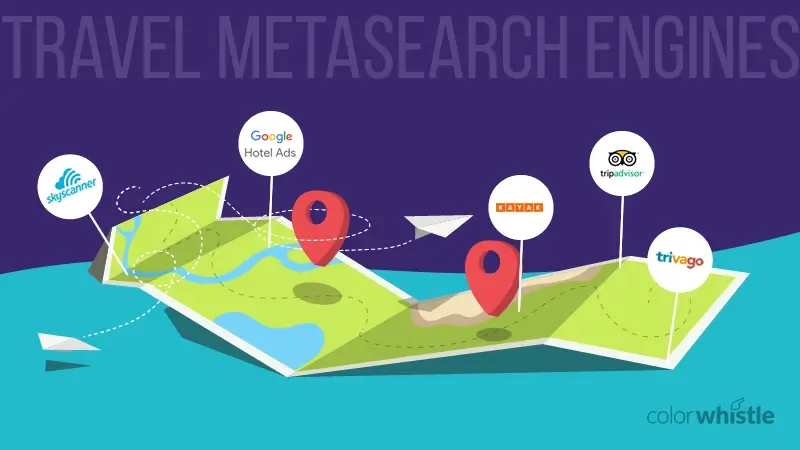
Category: Travel
Date: December 18, 2023
What Are Travel Meta Search Engines and How it Impacts Travel Agencies?
Travel metasearch engines have been around for some time. But, recently, it has become one of the hottest trends in the travel industry as more and more travelers are choosing it as their preferred method for finding and comparing prices.
In this blog, let’s find out how travel metasearch engines can help your hotel gain more online visibility and sell more rooms.
What is a Travel Meta Search Engine?
A travel metasearch engine is a price comparison website that compares hotel rates from different sources across the internet, OTAs (online travel agents) or directly from hotels. It must be noted that these metasearch engines are not a booking channel. They are merely a platform through which booking channels can market themselves.
The business model of travel metasearch engines is similar to most digital advertising platforms. They earn money through CPC (cost per click), CPI (cost per impression), CPA (cost per acquisition) and hybrid ads (a combination of CPC and CPA).
According to Koddi, these are the top 10 metasearch markets in the world.
What are the top 5 travel meta search engines.
Here are some of the most famous travel metasearch engines.
How Are Travel Metasearch Engines Changing the Industry?
Initially, travel engines aggregated rates by gathering them from sites across the internet so that consumers can compare it before making a final decision. Their main partners were OTAs such as Expedia and Priceline. But due to a complicated setup process and campaign management, many hoteliers avoided using the medium.
Things have changed now. Most hotels can easily get listed depending on the booking engine. For example, instant booking features where users remain on the metasearch site to book has produced a hybrid online booking environment.
One of the biggest changes is being driven by the search giant Google. When it comes to traffic growth and CPC, Google Hotel Ads is overtaking other metas. The search giant has integrated rates into Google maps. They are way ahead of the game and their meta is the most preferred choice for travelers. As more and more vendors get listed on Google Hotel Ads, Google will have more power to dictate the booking preference in the years to come. Hoteliers must maximize this channel or else it will cause a decrease in direct bookings.
Now, the online world is slowly shifting to voice-based search. The major meta-search engines are beginning to create their presence on Google Home and Amazon’s Alexa. Hoteliers who are worried about this shift can rest assured that metasearch engines will come to the rescue.
Why Should Hotels Get Listed in Travel Metasearch Engines?
Marketplaces that compare prices which vendors offer help consumers make an informed decision. Every consumer wants to feel like they are doing their due diligence before choosing a price. By listing on metasearch engines, hoteliers can give users the knowledge that they are getting a great deal.
Moreover, listing hotels in metasearch engines is not only about growing revenue. It gives hotels a chance to engage with an entirely new set of customers.
PACE Dimensions’ analyzed 10,000 travel websites and found out that metasearch accounts for over 45% of global unique visitors in travel. This number is greater than the number of unique visitors for OTAs in the US.
Metasearch is a valuable space for hotels because it gives them a greater opportunity to compete with bigger travel agencies and get more direct bookings. Plus, they can spend their marketing budget in an efficient way because the bidding system gives hotels control over how they show up with other competitors. Over time, it will give them more freedom to adjust the marketing strategy and increase ROI.
Within 10 years, the hotel metasearch has progressed into a sector that generates $6 billion in advertising. Metasearch engines such as Google Hotel Ads and Tripadvisor is becoming a one-stop-shop for researching and booking hotels. So, it is the perfect time for hotels to start investing in metasearch.
Interesting Statistics About Travel Meta Search Engines
Mirai, an expert in hotel distribution gathered many important data which depicts the growing importance of travel metasearch engines. Here are some of the major findings.
1. Investment made in ads (Google & Bing) vs metasearch engines.
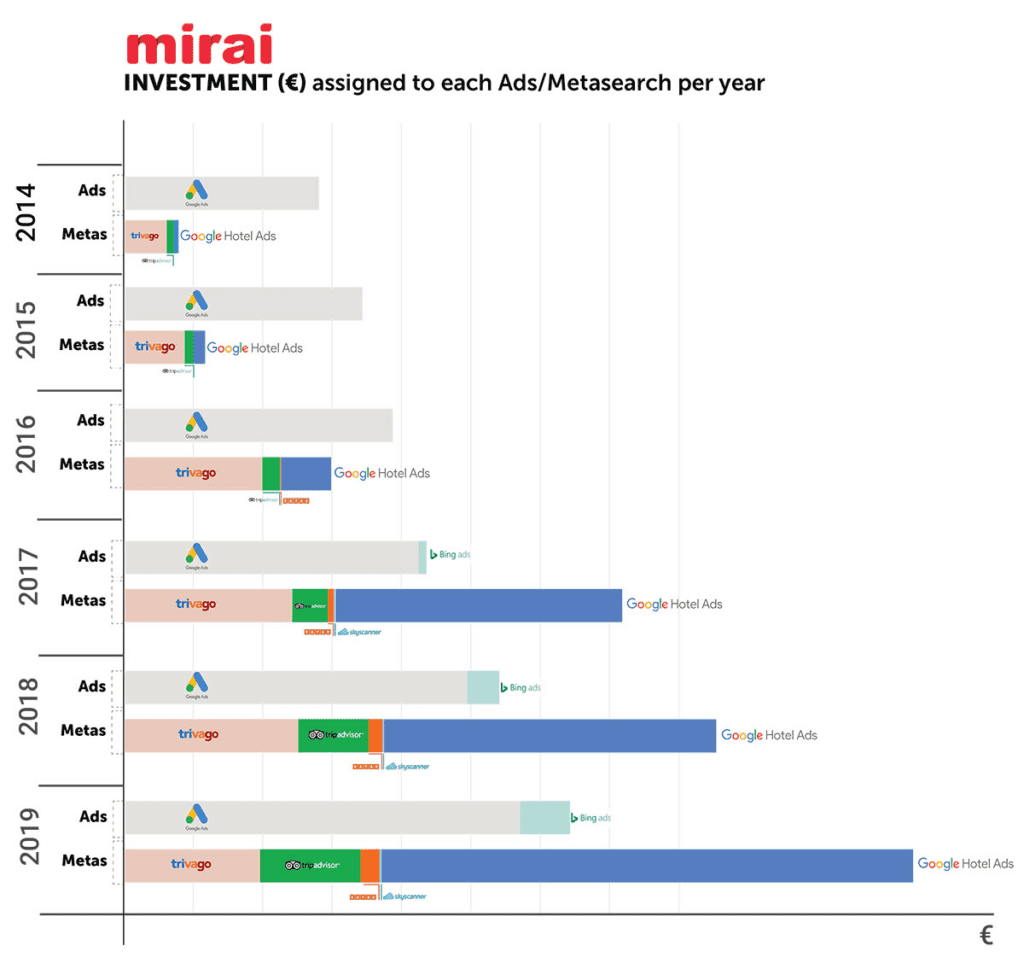
2. Number of times the investment in metasearch grows than ads.
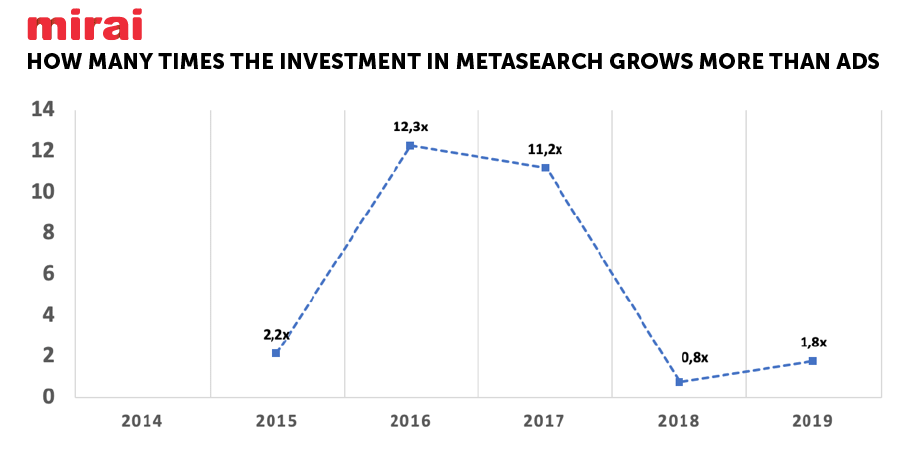
3. How metasearch engines are dominating the traditional ads?
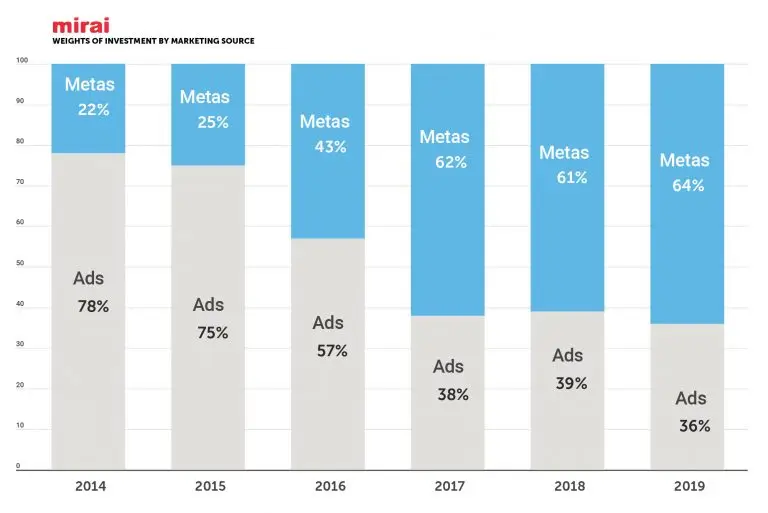
4. Dominance of Google Hotel Ads over others
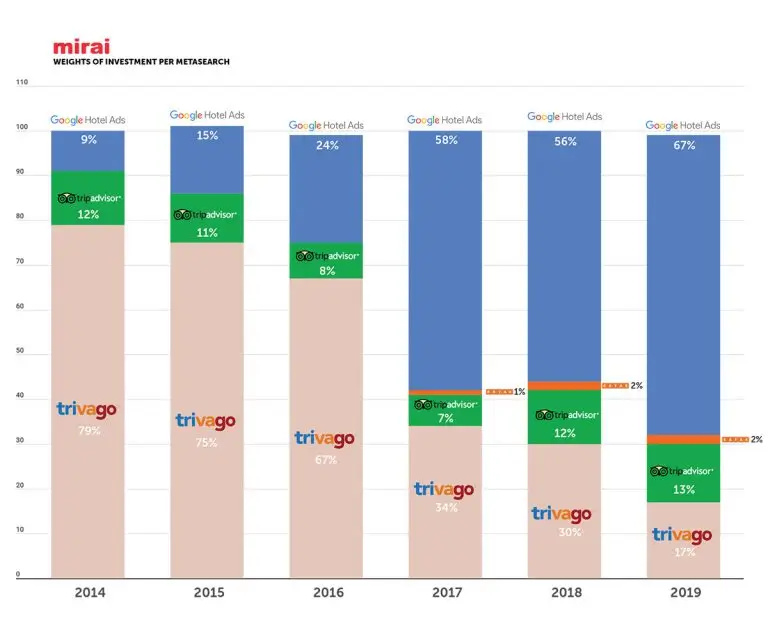
5. How Google is the leading company in terms of investment
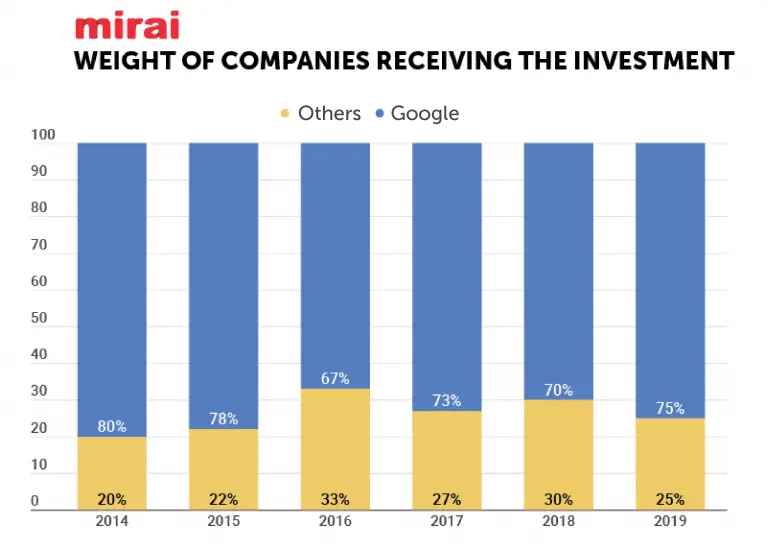
What Are the Pros and Cons of Travel Meta Search Engines?
Travel metasearch engines have its fair share of advantages and disadvantages. Let’s find out about them.
- Improved online brand visibility and better ROI
- Lists all the hotel rates in one place
- Price transparency
- Provides reviews in one place which helps customers to make better decisions
- Always displays the best rates
- Increased direct channel bookings
- Cost of getting listed on meta appears to be excessive for some hoteliers
- No proper customer service or support to solve disputes
- Amount of choice can be overwhelming to customers
- Managing the marketing department adds extra responsibility
Before you make the decision to list your hotel on metasearch engines, you must take the above points into consideration. Do you have help to manage your campaigns? Does your budget permit the allocation of third-party optimization services? And are you prepared to pay commission fees for direct booking?
If you don’t have a team of marketers, you will not be able to manage the volume of work required to rank high in the metasearch engines. In such situations, you can outsource the work to get instant advertising expertise from professionals who can offer focused attention on a daily basis. If you are looking for such kind of assistance, you can get help from our digital marketing experts at ColorWhistle .
Drive Conversions and Boost your Business with Expert Travel Website Development.
In conclusion, travel metasearch engines is going to be a real game changer.
Travel metasearch engines will help hoteliers to reign control of their distribution pricing. This means that hotels must take serious steps to create a strong presence in meta sites.
But, hoteliers take an off-hands approach. Many are in the mindset that once they are listed, bookings will keep flowing. This is a misconception. Hoteliers must start thinking of meta sites as an online advertising platform.
Since meta sites work with real-time data, dynamic price marketing is gaining momentum. To succeed, advertising budgets must be set on a daily, weekly, and monthly basis. Most meta sites offer real-time bid management and ROAS (Return On Advertisement Spending) tracking. So, you can easily measure how well your marketing dollars are being spent.
Even though travel metasearch engines are changing the hotel marketing game, clients do not get a complete value proposition. For hoteliers, driving traffic is the only part role in this equation. Positive reviews and word of mouth is still essential for building trust.
In addition to spending and managing budget , listen to the needs of customers and promptly address the negative feedback in these mediums. Above all, make sure that your hotel is offering true value and amazing service to your customers.
ColorWhistle’s agility in learning travel tech helps to keep our consumers ahead of the curve. If you need any help in travel website development for your travel agency don’t hesitate to contact us . We are always happy to help.
Which travel metasearch engines are you using to advertise your hotel? Share your experience in the comments section below.
More Resources
- Online Travel Agencies – A Brief Introduction
- How to Build a Travel Aggregator Website?
- Best Travel Website Design Ideas And Inspirations For 2024
In quest of the Perfect Travel Tech Solutions Buddy?
Be unrestricted to click the other trendy writes under this title that suits your needs the best!
- GDS Travel Agency Guide
- GDS OTA Travel Meta Searchengines
- Travel Aggregator Website
- Best Travel Websites Inspiration
- Travel Website Features
- Top WordPress Travel Website Themes
- Vacation Rental Booking Sites vs Traditional Accommodation
Related Posts
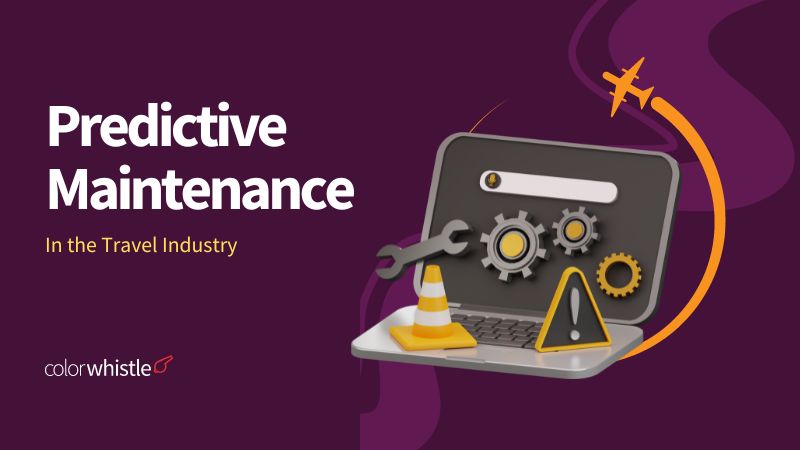
How Predictive Maintenance Can Help the Travel Industry

Exploring the World Through AI and VR in the Travel Industry
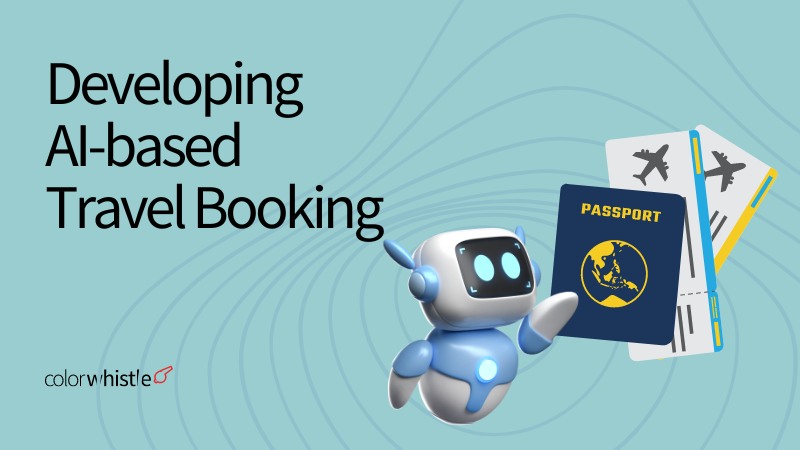
How AI-based Travel Booking Applications Can be Developed?
About the Author - Anjana
Anjana is a full-time Copywriter at ColorWhistle managing content-related projects. She writes about website technologies, digital marketing, and industries such as travel. Plus, she has an unhealthy addiction towards online marketing, watching crime shows, and chocolates.
View Our Services
Have an idea? Request a quote
Share This Blog
Leave a Reply Cancel reply
Your email address will not be published. Required fields are marked *
Ready to get started?
Let’s craft your next digital story

Sure thing, leave us your details and one of our representatives will be happy to call you back!
Eg: John Doe
Eg: United States
Eg: [email protected]
More the details, speeder the process :)
Advertiser Disclosure
Many of the credit card offers that appear on this site are from credit card companies from which we receive financial compensation. This compensation may impact how and where products appear on this site (including, for example, the order in which they appear). However, the credit card information that we publish has been written and evaluated by experts who know these products inside out. We only recommend products we either use ourselves or endorse. This site does not include all credit card companies or all available credit card offers that are on the market. See our advertising policy here where we list advertisers that we work with, and how we make money. You can also review our credit card rating methodology .
OTA vs. Metasearch: A Quick Vocabulary Lesson!
Erin Miller
Content Contributor
188 Published Articles
Countries Visited: 26 U.S. States Visited: 28
Stella Shon
News Managing Editor
87 Published Articles 626 Edited Articles
Countries Visited: 25 U.S. States Visited: 22

Online Travel Agency
Metasearch engine, final thoughts.
We may be compensated when you click on product links, such as credit cards, from one or more of our advertising partners. Terms apply to the offers below. See our Advertising Policy for more about our partners, how we make money, and our rating methodology. Opinions and recommendations are ours alone.
Let’s delve into a brief lesson on the basic concept of OTAs vs. metasearch engines.
Previously, these terms were fairly straightforward to define, but technology has progressed and there are now many ways in which these services overlap. We’ll do our best to make a decent distinction between them here, but we’ll warn you…it’s not always that simple!
Online Travel Agency : a website that traditionally offers both search and booking capabilities. OTA services usually include flights, hotels, and rental cars, with some also offering vacation rentals, cruises, and events/activities. OTAs often offer bundles to secure greater discounts when booking multiple services together.
An OTA is a sort of “middle-man” between the user and the airline/hotel/etc. While they no longer make commissions on flights, OTAs may take a cut of 15%-20% of your booking fee from the hotel.
Additionally, OTAs also often have toll-free phone numbers for personal assistance with booking/re-booking reservations.
Big players you’ve likely heard of in the OTA industry include Expedia , Hotels.com , Travelocity , Orbitz , Priceline , and Booking.com , among others.
Metasearch Engine : one overarching search engine that aggregates data from various sources (including other third-party search engines, OTAs, hotel websites, etc.) to provide a more comprehensive results page. This tool basically does what you’d do yourself by checking multiple different websites to compare airfares; it just checks more sites much faster… and no offense, but it’s probably smarter!
In the past, metasearch engines only offered the capability to search, directing the user to a third party OTA or individual airline to book and charging a small fee for their services. That’s no longer always the case, as we’re seeing some metasearch engines emerge with the capability to book directly through their websites.
Similar to OTAs, metasearch engine services usually include flights, hotels, and car rentals; some even provide packages to rival OTA’s discounted prices when booking services together.
Big players you’ve likely heard of in the metasearch industry include Google Flights , Kayak , Momondo , and Hipmunk, among others.
Here’s where it gets confusing. Most OTAs now offer price comparison features that essentially stack their results up against other search results, providing a more metasearch-like result. However, this option usually allows users a max of 3-4 comparison sites, whereas metasearch engines compare many more.
In addition, some metasearch engines like Hipmunk now offer assistance with travel planning, booking, canceling, etc., whereas before this was strictly OTA territory.
Things get even more convoluted when an OTA (ex: Expedia) buys a metasearch site like Kayak. Or when a metasearch site like Hipmunk uses an OTA (Travelocity, owned by parent company Expedia ) to power their hotel bookings. Or when a metasearch site like Skyscanner offers various OTAs (Kiwi.com, lastminute.com, etc.) through which to book your flight.
Lastly, we all know OTAs rank their results. How do they do that? Is it fair? Our friends at Duetto Research provide an eye opening report into the ins and outs of OTA search results.
The list goes on, but by now your head may be swimming!
The point is, whether you choose to use multiple OTAs or a certain metasearch engine is really personal preference, and truly depends on how much digging you want to do yourself.
We list both types in our travel resource post on flight searches and go into our thoughts on the best of the best in a separate post.
Additionally, we’ve got an entire article dedicated to the best websites for booking hotels at the cheapest prices.
After all, it is an extensive look into travel resources, and we wouldn’t be Upgraded Points if we didn’t go in-depth!
Frequently Asked Questions
What is the difference between an ota and a metasearch engine.
An Online Travel Agency is a website that traditionally offers both search and booking capabilities. OTA services usually include flights, hotels, and rental cars, with some also offering vacation rentals, cruises, and events/activities.
A Metasearch Engine is one overarching search engine that aggregates data from various sources (including other third-party search engines, OTAs, hotel websites, etc.) to provide a more comprehensive results page.
Was this page helpful?
About Erin Miller
An experienced points hacker, Erin is Alex’s partner-in-crime and contributes to Upgraded Points with in-depth guides and relationship management. Erin’s work has been cited in multiple major publications.
INSIDERS ONLY: UP PULSE ™

Get the latest travel tips, crucial news, flight & hotel deal alerts...
Plus — expert strategies to maximize your points & miles by joining our (free) newsletter.
We respect your privacy . This site is protected by reCAPTCHA. Google's privacy policy and terms of service apply.
Related Posts

UP's Bonus Valuation
This bonus value is an estimated valuation calculated by UP after analyzing redemption options, transfer partners, award availability and how much UP would pay to buy these points.

What is a travel metasearch engine, and how can travel brands benefit from it?
Travel brands are always on the hunt for new ways to attract travelers and direct bookings. They use display ads, search engine ads, native videos, and social media to drive engagement. An ideal marketing strategy would be to use a good mix of all these marketing channels. However, in today’s travel marketing scene, travel metasearch is emerging as a big platform to market. Metasearch advertising generated an economic value worth 6 billion USD in the last decade. As many as 60% of independent hoteliers consider metasearch the most effective marketing channel.
Here in this article, we dissect travel metasearch for you, what it is, how your brand can benefit from it, and conclude by listing major engines.
What is a travel metasearch engine?
For travelers, metasearch is a platform where they can get an aggregated list of available rooms and their respective rates, saving them the trouble of visiting every travel website individually and checking for rates.
Travel businesses see metasearch as a platform to market their brands and bring direct or sales-qualified leads to their website. Therefore, it also works as an acquisition channel. But please note metasearch is not a booking engine. It is a platform that pulls room rate and availability data from multiple sources on the internet. The bidding metasearch engine works on conventional CPC (Cost per click). You or your marketing representative will bid for your brand, and every redirection to your website will have a cost similar to how Google AdWords works.
How travel brands can benefit from metasearch engines
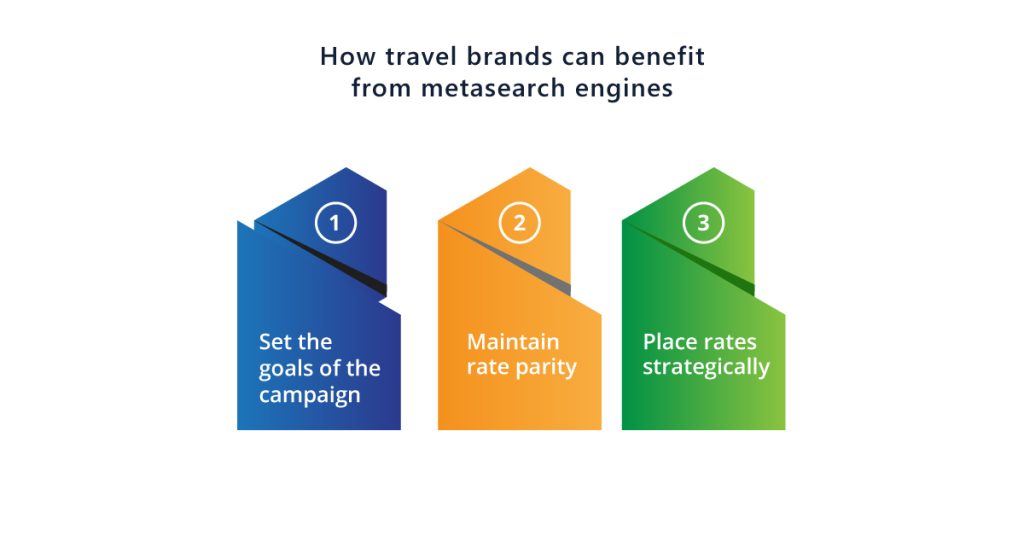
Metasearch can help travel brands in many ways. The brand can lift the conversion numbers without doing anything disruptive. Triptease report says “If your metasearch rates are accurate, your conversion rates can increase up to 300%”. It was about the ultimate outcome, but how do you activate it? As someone who’s just starting to use metasearch, what’s the ideal strategy to go ahead with? We are breaking it down for you in a three-tier approach, which will help you effectively get started with travel metasearch.
- Set the goals of the campaign
Implementation of metasearch certainly boosts direct booking numbers, yet to make it a success, you have to set realistic expectations and plan your future budgets accordingly. For instance, if you are 10% direct booking, with metasearch, you can aim around 13-14%, take 5-7x return on ad spend for metasearch. Then, start the campaign. Once your campaign matures, you will have a clearer picture of how to adjust the budget.
- Maintain rate parity
Travel metasearch engines optimize the rate to the user’s location and currency. Therefore, the odds of rate differentiation go higher, and if you are not keeping rate parity, you are giving your competition free winning edges. That’s why you must maintain rate parity across your distribution channels.
- Place rates strategically
Placements of rates can have significant impacts on conversion. Only the advertisement competitive rates on metasearch will not be enough. When potential travelers land on your page, you must ensure that the first rate they see matches your advertised rate. The pricing technique is also famous with the name BAR (Best available rate) – always show BAR first.
What are major travel metasearch engines, and who owns them?
If we talk in terms of crude numbers, there are five major metasearch engines, Google Hotel ads planner, Tripadvisor, Skyscanner, kayak, and Trivago. Let’s look at them objectively one at a time.
- Google Hotels
Google Hotels is arguably the market leader. The metasearch engine leverages google maps and Gmail to offer personalized recommendations to travelers. Google Hotels delivers travelers price tracking and deals directly to their inboxes.
- TripAdvisor
TripAdvisor is also a well-known travel metasearch engine. You should have your TripAdvisor account up and running as soon as your hotel starts accepting bookings. The existence of your hotel brand on Tripadvisor gives you wider reach and acceptability. TripAdvisor Metasearch offers travelers direct booking and allows comparison shopping.
- Skyscanner
Skyscanner is both a metasearch engine and travel agency. The booking tool is quite popular among gen-Z and millennials. Skyscanner offers its users’ destination research and booking travel products like flights, hotels, and cabs.
- Kayak
Kayak is also both an online travel agency (OTA) and a metasearch engine. Kayak is a part Booking.com group, the group wholly owns the platform. Therefore, it’s not easy for other hotels to get ad placement on this metasearch engine. Though, hotels can get into partnerships with airlines and place packaged offerings on Kayak to derive the most value out of the metasearch engine.
- Trivago
Trivago is a proper metasearch engine that fetches room rates and availability from different booking sites and shows it in one place. It has a revenue model like Google Hotels, booking sites have to pay a fee every time a potential customer clicks on a specific offering.
Recommended: What Is Hotel Upsell Software? And How To Choose One?
Ownership of metasearch engines matters a lot. Apart from Google Hotel and Tripadvisor the other three engines, Skyscanner, Trivago, and Kayak, are retailer-owned, so they send the major share of direct traffic to their own website. At the same time, media-owned travel meta-search engines are democratic and run transparent bidding systems.
Metasearch is a powerful medium to get quality direct traffic to your travel website. Ideally, go with media owned metasearch engine and use the implementation strategy we mentioned earlier in this article. You will be all set to benefit from travel metasearch engines.
About Vervotech:
Vervotech is a leading Hotel Mapping and Room Mapping API that leverages the power of AI and ML to quickly and accurately identify each property listing through the verification of multiple parameters. With one of the industry’s best coverage of 98% and an accuracy of 99.999%, Vervotech is quickly becoming the mapping software of choice for all leading global companies operating in the travel and hospitality industry. To learn more about Vervotech and the ways it can enhance your business in the long run contact us: [email protected]
Previous Post Hotel property management system: Key features to look for and benefits
Next post 40+ different hotel content attributes that users check before booking a hotel , related posts.
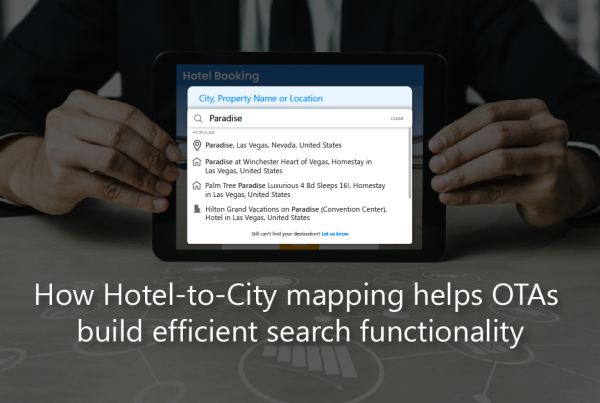
Six economic theories to handle demand fluctuations in OTA operations

Six leading in-room hotel technology trends in 2024
Comments are closed.
For Sales Enquiry
- For US/Canada: 1 (833) 451-5836
- For Other Countries: +91 9923592502
- [email protected]
- Hotel Mapping
- Room Mapping
- Hotel Curated Content
- Press & Media
- Tech Partner
- Supplier Partner
- Walkthrough Videos
- Documentation
- Case Studies
- Infographics
Privacy Policy
Copyright © 2024 Vervotech Solutions Pvt. Ltd.
- Wall of Love
- Free Sample Data
- Brand Mapping
- Extranet Mapping
- Sync History
- Leadership Team
- Growth Story
- How We Innovate
- Values & Life at Vervotech
- Help Center
- Client Portal
- Provider Portal
- Contact Sales
Vervotech Affiliate Partner Application Form
Which Vervotech product(s) do you want to promote? Please select all that apply. Hotel Mapping Room Mapping Hotel Curated Content
What will you need to be successful partner? (for example: image assets, product training, brand guidelines, etc.)
I accept the
terms & conditions
REFERRAL PARTNER AGREEMENT
THIS REFERRAL FORM EXECUTED BY REFERRAL PARTNER WITH COMPANY AND BETWEEN VERVOTECH SOLUTIONS PRIVATE LIMITED, HAVING ITS REGISTERED OFFICE AT FIRST FLOOR, FLAT NO. 101, E BUILDING, RICH WOODS, PLOT NO. 150, SECTOR 11, PCNTDA, CHIKHALI, PIMPRI CHINCHWAD, PUNE, MAHARASHTRA, 411019, IN, (“THE COMPANY”) AND YOU AS AN INDIVIDUAL REFERRAL PARTNER OR ANY SOLE PROPREITOR, PARTNERSHIP, LIMITED LIABILITY PARTNERSHIP, PRIVATE LIMITED COMPANY OR PUBLIC LIMITED COMPANY OR ANY OTHER BUSINESS ENTITY EXECUTING THE REFERRAL FORM (“THE REFERRAL PARTNER”) IS GOVERNED UNDER THE TERMS OF THIS REFERRAL PARTNER AGREEMENT (“AGREEMENT”). PLEASE READ THIS AGREEMENT CAREFULLY. BY CLICKING “ACCEPTED AND AGREED TO” REFERRAL PARTNER AGREES TO THE AGREEMENT APPLICABLE TO THE REFERRAL FORM.
REFERRAL PARTNER ACKNOWLEDGES THAT IT HAS READ THIS AGREEMENT, UNDERSTANDS IT, AND AGREES TO BE BOUND BY ITS TERMS, AND IF THE REFERRAL PARTNER IS A PERSON WHO IS SIGNING ON ITS BEHALF HAS BEEN AUTHORIZED TO DO SO AND THE COMPANY DOES NOT HAVE ANY LIABILITY TOWARDS VERIFYING THE AUTHORITY OF THE PERSON WHO HAS SIGNED THE AGREEMENT ON BEHALF OF THE REFERRAL PARTNER.
APPOINTMENT REFERRALS
Appointment. Company hereby appoints Referral Partner, and Referral Partner hereby accepts such appointment, as Company’s non-exclusive referral partner for the marketing and promotion of Services and the referral of leads for the sale of Services, as further set forth in this Agreement.
Scope of Authority Referral Partner's sole authority shall be to (a) market and promote Services as set forth in this Agreement, and (b) provide sales leads to Company for Company to contact in its sole discretion. The Parties agree that Company will directly enter into agreements with customers for the provision of Services to such customers.
DUTIES AND RESPONSIBILITIES OF THE REFERRAL PARTNER
Prior to undertaking any solicitation efforts of a prospective customer or client ("Prospect”) relating to the services or products or offerings of the Company as set out at https://vervotech.com/vervotech-affiliate-program ("Services”), Referral Partner shall submit a referral form, in a format shared by the Company ("Referral Form”), for written approval of the Company. The Referral Partner agrees to provide the necessary information, data and materials as may be requested by Company in respect of the Prospect. Referral Partner shall fill out a Referral Form and shall provide Company with the names of the Prospect to which Referral Partner intends to refer to the Services). If the Prospect is a large business entity, Referral Partner shall specify the name of division of such large entity in the customer list.
If a Prospect is approved by Company as a potential customer, Company will confirm such acceptance or rejection of such Prospect in writing via email to Referral Partner (“Referral Date”). Notwithstanding anything to the contrary, the Company will be entitled to accept or reject a Prospect at its own discretion, without providing any justifications or reasons in relation to the same. For the avoidance of doubt, Company reserves the right to decline to enter into a transaction with any prospect for lack of creditworthiness or for any other reason. Prospect which are not approved by Company are considered out of scope of Referral Fee. In the event Company does not notify Referral Partner of acceptance of the Prospect, it shall be deemed to be rejected.
In case Company notifies Referral Partner of its approval of a Prospect, the Referral Partner will provide assistance to the Company in establishing contact between the Prospect and the appropriate contact at Company, without any additional costs.
If the foregoing activities result in the Prospect entering into and executing a formal customer agreement with Company (hereinafter, a “Qualifying Transaction”), Referral Partner shall be entitled to a Referral Fee subject to receipt of amount invoiced to the customer for sale of Services through Qualifying Transaction (hereinafter, a “Qualified Sale”) and subject to the other conditions set forth under this Agreement; provided, however, that such Qualifying Transaction is consummated no later than six (6) months following the Referral Date.
A Prospect may not qualify as such, if, as on the Referral Date: (a) it is an existing customer of Company; (b) it has previously been contacted by Company, Company’ s affiliates or any other agent, reseller, vendor who markets Company’ s products and services; (c) it has previously been introduced or referred to Company as a potential prospect by a third party or (d) it is parent, subsidiary or affiliate of Company.
RESPONSIBILITIES OF THE REFERRAL PARTNER
Limited Authority Referral Partner will make no representations, warranties or guarantees on behalf of Company. Referral Partner has no authority to distribute or resell Services, or to make any commitments, agreements, or to incur any liabilities whatsoever on behalf of Company. Company will not be liable for any acts, omissions to act, contracts, commitments, promises or representations made by Referral Partner hereto. Referral Partner's activities under this Agreement shall be at its own cost and risk. Referral Partner shall not, without prior approval from Company, submit proposals, accept orders, negotiate and conclude contracts, and/or alter, vary or modify in any manner any of the terms and conditions of Company' s offer/ proposal / contract.
Assistance. Referral Partner shall make best efforts in performance of its responsibilities under the Agreement and provide reasonable support to Company.
Quarterly Meetings. Referral Partner agrees to meet, either in person or via teleconference, no less frequently than once every calendar quarter to discuss the status of the relationship contemplated herein and emerging opportunities and as directed by Company from time to time.
Training. Company shall have no obligations to provide the Referral Partner any training regarding the Services. Upon request of Referral Partner and in case the Referral Partner is an organization, Company shall make good faith efforts to provide sales training focused on the marketing and promotion of Services to Referral Partner employees, at REFERRAL PARTNER’s own cost.
Subcontracting. Referral Partner shall not subcontract any of its obligations under this Agreement.
Competing Products and Business Practices. During the term of this Agreement, Referral Partner shall promptly inform Company of Referral Partner promotion, marketing, or distribution of any product or service offering similar functionality to Services. Referral Partner (a) shall conduct its business under this Agreement in a manner that reflects favorably upon Company, Services, and Company's goodwill and reputation, (b) shall not engage in illegal, deceptive, misleading, or unethical trade practices, and (c) shall not, and shall not permit any of its subsidiaries or affiliates, or any of its or their respective directors, officers, managers, employees, independent contractors, representatives, or agents to, promise, authorize, or make any payment, or otherwise contribute any item of value, directly or indirectly, to any third party and in each case, in violation of the applicable anti-bribery or anti-corruption law.
Data Protection and Privacy. In the performance of the services set forth herein Referral Partner may receive or have access to personal data of the Company and its personnel. Referral Partner agrees to comply with the terms set forth in this Agreement, in its collection, receipt, transmission, storage, disposal, use and disclosure of such personal data. Referral Partner agrees to ensure compliance with applicable laws, rules and regulations, including but not limited to laws, rules and regulations related to personal data protection and data privacy. To the extent the Referral Partner will share any personal data with the Company, the Referral Partner shall be responsible for obtaining informed consent from such individuals for the processing of their personal data. The Referral Partner agrees to take all necessary steps to ensure compliance, including but not limited to executing appropriate contractual agreements as may be necessary as per applicable laws.
REPRESENTATIONS AND WARRANTIES
Representations and Warranties. Referral Partner represents and warrants that (a) it has the full corporate right, power and authority to enter into this Agreement and to perform its obligations hereunder, (b) the execution of this Agreement and the performance of its obligations hereunder does not and will not conflict with or result in a breach (including with the passage of time) of any other agreement to which it is a party, and (c) this Agreement has been duly executed and delivered by such Party and constitutes the valid and binding agreement of such Party, enforceable against such Party in accordance with its terms. Referral Partner further represents and warrants that it shall comply with all applicable data privacy laws while performing its obligations under the Agreement, and that it has all rights necessary to provide the Referral Form to Company for Company’s use pursuant to this Agreement. Referral Partner specifically represents and warrants that it has procured from all data subjects whose personal information it is disclosing to Company an explicit consent to disclose their personal information to Company for use in contacting them for marketing and/or other business purposes.
GENERAL DISCLAIMERS- EACH OF COMPANY AND REFERRAL PARTNER ACKNOWLEDGES AND AGREES THAT, IN ENTERING INTO THIS AGREEMENT, EXCEPT AS EXPRESSLY SET FORTH HEREIN, IT HAS NOT RELIED UPON ANY WARRANTIES, EXPRESS OR IMPLIED, AND THAT NEITHER PARTY HAS MADE ANY REPRESENTATIONS, ASSURANCES, OR PROMISES THAT COMPANY WILL RECEIVE ANY NEW REFERRED CUSTOMERS OR NEW BUSINESS OR THAT REFERRAL PARTNER WILL RECEIVE ANY REFERRAL FEES AS A RESULT OF THIS AGREEMENT. COMPANY DISCLAIMS ALL REPRESENTATIONS AND WARRANTIES REGARDING THE SERVICES, WHICH ARE PROVIDED AS-IS, WHETHER EXPRESS, IMPLIED, OR STATUTORY, ORAL OR IN WRITING, ARISING UNDER ANY LAWS, INCLUDING WITH RESPECT TO ERROR-FREE OPERATION, MERCHANTABILITY, FITNESS FOR A PARTICULAR PURPOSE, OR NON-INFRINGEMENT.
In consideration of the Services provided by the Referral Partner in accordance with the Agreement, Company will pay to the Referral Partner as per the Referral Fee specified below, which shall be Company’ s sole payment obligation.
Referral Fee: For any invoices issued pursuant to Qualified Sales received by Company from customer during the referral period, Company shall pay Referral Partner a Referral Fee as per the % (mentioned on the referral Page) of the amount actually collected by Company from customer as a one-time Referral Fee.
Company shall make payment of undisputed invoice raised by Referral Partner within Sixty (60) days of the date of Company' invoice to customer for the Qualified Sales.
Company shall not pay or reimburse Referral Partner for any expenses related to this Agreement, unless expressly agreed to by Company in writing, before such expenses were incurred.
Limitation on Referral Fee:
Company will not pay more than one (1) Referral Fee in connection with any given Qualified Sales.
Referral Partner will receive the Referral Fee only as one-time fee.
Referral Partner will not be entitled to receive any Referral Fees for any subsequent services which are beyond the first transaction.
A renewal of a Qualified Sale shall not be considered a new Qualifying Transaction and shall not entitle Referral Partner to any Referral Fee.
Referral Fee shall be paid only when the actual invoicing amount have been collected from Qualified Sales. Referral Partner shall not be entitled to receive payment of Referral Fees for Qualifying Transactions remaining unpaid.
LICENSES AND OWNERSHIP
Company Marks. Subject to the terms and conditions set forth in this Agreement and solely for the purposes hereof, Company grants to Referral Partner a non-transferable, non-exclusive license, without right of sublicense, to use the Company trademarks, service marks, and logos as approved by Company (the “Company Marks”) to perform its obligations set forth in this Agreement. The use of all Company Marks, including placement and sizing, shall be subject to Company’s then-current trademark use guidelines, if any, provided by the Company. If the Company Marks become, or in Company’s opinion are likely to become, the subject of an infringement claim, Company may at its option modify or replace the Company Marks and require Referral Partner to cease use of the allegedly infringing Company Marks. Referral Partner shall promptly provide Company with samples of all materials that use the Company Marks for Company’s quality control purposes. If, in Company’s discretion, the Referral Partner’s use of the Company Marks does not meet Company’s then-current trademark usage policy, Company may, at its option, require Referral Partner to revise such material and re-submit it under this Section prior to display, or release of further materials bearing or containing such Company Marks. Except for the right to use the Company Marks set forth above, nothing contained in this Agreement shall be construed to grant to Referral Partner any right, title or interest in or to the Company Marks, and all right, title, and interest in and to the Company Marks shall be retained by Company. Referral Partner acknowledges that Company asserts its exclusive ownership of the Company Marks and the renown of the Company Marks worldwide. Referral Partner shall not take any action inconsistent with such ownership and further agrees to take all actions that Company reasonably requests to establish and preserve its exclusive rights in and to the Company Marks. Referral Partner shall not adopt, use, or attempt to register any trademarks or trade names that are confusingly similar to the Company Marks or in such a way as to create combination marks with the Company Marks.
Company Materials. Subject to the terms and conditions set forth in this Agreement and solely for the purposes hereof, Company grants to Referral Partner a non-transferable, non-exclusive license, without right of sublicense, to distribute the Company Materials exactly as provided to Referral Partner by Company to perform Referral Partner’s obligations under this Agreement.
Ownership. As between Referral Partner and Company, Company retains all right, title, and interest to (a) the Company Marks, (b) the Services, any of its products, material or pre-existing intellectual property rights (c) the high-level description of the Company Products and the Company Materials, and (d) all Intellectual Property Rights related to any of the foregoing. There are no implied licenses under this Agreement.
No Intellectual Property Rights. Parties agree that no intellectual property rights are conceived or developed under this Agreement. If any intellectual property rights are conceived or developed, the intellectual property rights will vest with Company, unless otherwise agreed by the parties.
CONFIDENTIALITY
In connection with this Agreement, “Confidential Information” means all data and information of a confidential nature of Company disclosed by Company to the Referral Partner under this Agreement, as well as information that Referral Partner knows or reasonably should know that the Company regards as confidential, including business practices, software, technical information, future product/services plans, programming/design techniques or plans, know-how, trade secrets, prospects, customers, end users suppliers, development plans or projects, and services. Confidential Information may be communicated orally, in writing, or in any other recorded or tangible form.
Confidentiality. Referral Partner shall maintain in confidence all Confidential Information disclosed to it by the Company. Referral Partner shall not use for any purpose outside the scope of this Agreement, or disclose to any third party such Confidential Information except as expressly authorized by this Agreement. To the extent that disclosure is authorized by this Agreement, the Referral Partner shall obtain prior agreement from its employees, contractors, agents, and consultants to whom disclosure is to be made to hold in confidence and not make use of such information for any purpose other than those permitted by this Agreement. Referral Partner shall use at least the same standard of care as it uses to protect its own most confidential information (and in no event less than reasonable care) to ensure that such employees, contractors, agents, and consultants do not disclose or make any unauthorized use of such Confidential Information. Referral Partner shall promptly notify the other upon discovery of any unauthorized use or disclosure of the Confidential Information. Notwithstanding any other provision in this Agreement to the contrary, the obligations set forth in this section 7 shall survive any termination or expiration of this Agreement for perpetuity.
Exceptions. The obligations of confidentiality contained in this section 7 shall not apply to the extent that it can be established by the Referral Partner by competent proof that such Confidential Information:
was already known to the Referral Partner, other than under an obligation of confidentiality, at the time of disclosure by the Company;
was generally available to the public or was otherwise part of the public domain at the time of its disclosure to the Referral Partner;
became generally available to the public or otherwise became part of the public domain after its disclosure, other than through any act or omission of the Referral Partner in breach of this Agreement; or
was disclosed to the receiving Party, other than under an obligation of confidentiality, by a third party who had no obligation not to disclose such information to others.
Authorized Disclosure. Notwithstanding any provision to the contrary, the Referral Partner may disclose Confidential Information (a) to the extent required by law or any governmental authority, or (b) on a “need to know” basis under an obligation of confidentiality to its legal counsel or accountants, provided, that such Referral Partner shall to the extent practicable (and except to the extent it would jeopardize the filing or prosecution of letters patent) use commercially reasonable efforts to assist the Company in securing confidential treatment of such information required to be disclosed. Prior to disclosing any Confidential Information under this section 7 Referral Partner shall take reasonable steps to give the Company sufficient notice of the disclosure request for the Company to contest the disclosure request.
Referral Partner shall indemnify, defend, and hold Company harmless from and against any and all liabilities, losses, damages, costs, fees, and expenses (including reasonable attorneys’ fees) resulting from or arising out of any Claims based on allegations that (a) Referral Partner breached any obligations including with limitation Confidential Information, representation or warranty contained herein, or has breached any applicable laws, rules and regulations, or (b) Referral Partner made a representation or warranty regarding Company or the Services that is inconsistent with the written high-level description of Services provided to Referral Partner by Company, or is otherwise unauthorized by Company.
Indemnification Procedure. An indemnifying party hereunder shall be liable for any costs and damages to third parties incurred by the other party which are attributable to any such Claims, provided that such other party (i) notifies the indemnifying party promptly in writing of the claim, (ii) gives the indemnifying party the sole authority to defend, compromise or settle the claim, with prior approval of the Company and (iii) provides all available information, assistance, and authority at the indemnifying party’s reasonable request and at the indemnifying party’s reasonable expense to enable the indemnifying party to defend, compromise, or settle such claim. Any indemnifying party hereunder shall diligently pursue any defense required to be rendered hereunder, shall keep the indemnified party informed of all significant developments in any action defended by the indemnified party, and shall not enter into any settlement affecting the indemnified party’s interests without the prior consent of the indemnified party.
LIMITATION OF LIABILITY
COMPANY SHALL NOT BE LIABLE TO REFERRAL PARTNER OR ANY THIRD PARTY FOR ANY INDIRECT DAMAGES INCLUDING TOWARDS COSTS OF PROCUREMENT OF SUBSTITUTE GOODS, LOST PROFITS OR ANY OTHER SPECIAL, CONSEQUENTIAL, INCIDENTAL OR INDIRECT DAMAGES, HOWEVER CAUSED, AND WHETHER BASED ON CONTRACT, TORT (INCLUDING NEGLIGENCE), PRODUCTS LIABILITY OR ANY OTHER THEORY OF LIABILITY, REGARDLESS OF WHETHER COMPANY HAS BEEN ADVISED OF THE POSSIBILITY OF SUCH DAMAGES. NOTWITHSTANDING ANYTHING TO THE CONTRARY, THE MAXIMUM AGGREGATE LIABILITY OF COMPANY FOR DIRECT DAMAGES FOR ANY REASON SHALL BE LIMITED TO AMOUNTS PAID BY COMPANY IN RESPECT OF THE QUALIFYING SALE . THESE LIMITATIONS WILL APPLY NOTWITHSTANDING THE FAILURE OF THE ESSENTIAL PURPOSE OF ANY REMEDY.
NON-SOLICITATION OF PERSONNEL
The Referral Partner shall not engage or hire as an employee or engage as independent contractor, Company’ s employees or independent contractors during the term of this Agreement and for a period of one (1) year following expiration or termination of this Agreement except as may be mutually agreed in writing.
TERM AND TERMINATION:
Term. The term of this Agreement shall be one (1) year from the Effective Date unless terminated earlier in accordance with the provisions of this Section. This Agreement shall renew automatically for additional one-year terms unless one Party provides the other written notice no later than thirty (30) days prior to the expiration of the then-current term of the Agreement of its intention to allow the Agreement to expire at the end of such term.
Termination for Breach. Either Party may terminate this Agreement for cause resulting from the material breach of this Agreement by the other Party by providing the breaching party written notice of such material breach and the intention to terminate for cause. The Party receiving such notice shall have thirty (30) days to cure such material breach. If at the end of such thirty (30) day period, the breach has not been cured to the reasonable satisfaction of the Party seeking to terminate the Agreement, the Agreement shall terminate.
Termination for Convenience. Either Party may terminate this Agreement for convenience upon ninety (90) days’ written notice.
Effect of Termination; Duties of the Parties Upon Termination. Upon any termination or expiration of this Agreement, Referral Partner shall (a) refrain thereafter from representing itself as a promoter or marketer of Company Products, or as a referral partner of Company, (b) immediately cease all use of any Company Marks, and (c) return to Company the Company materials and Confidential Information and all tangible items in Referral Partner’s possession or under its control containing Confidential Information of Company. Upon any termination or expiration of this Agreement, Company shall return to Referral Partner all tangible items in Company’s possession or under its control containing Referral Partner’s Confidential Information. Upon any termination or expiration of this Agreement, all licenses granted under this Agreement shall terminate.
Survival. Any clauses which by their very nature survive termination of the Agreement, will survive.
MISCELLANEOUS:
Construction. The Parties have participated jointly in the negotiation and drafting of this Agreement. In the event an ambiguity or question of intent or interpretation arises, this Agreement shall be construed as if drafted jointly by the Parties and no presumption or burden of proof shall arise favoring or disfavoring any Party by virtue of the authorship of any of the provisions of this Agreement. As used in this Agreement, the singular shall include the plural and vice versa, and the terms “include” and “including” shall be deemed to be immediately followed by the phrase “without limitation.” The captions and headings in this Agreement are inserted for convenience and reference only and in no way define or limit the scope or content of this Agreement and shall not affect the interpretation of its provisions.
Governing Law and Dispute Resolution: This Agreement will be governed by and construed in accordance with the laws of the India, without reference to its conflict-of-laws principles. The Parties shall resolve any difference or dispute arises out of this Agreement by way of negotiations. If such negotiation process fails, then all disputes arising from or related to this Agreement shall be resolved before exclusive jurisdiction of courts in Pune, India.
NOTICES: All notices including hereunder shall be given in writing by hand delivery, courier service or email at the addresses set forth below:
If to Company
If to REFERRAL PARTNER
Attention: Sanjay Ghare
Email: [email protected]
Address: 3rd Floor, Amar Tech Centre, Sakore Nagar, Viman Nagar, Pune, Maharashtra 411014
Non-Waiver: A party's failure or delay in enforcing any provision of the Agreement will not be deemed a waiver of that party's rights with respect to that provision or any other provision of the Agreement. A party's waiver of any of its rights under the Agreement is not a waiver of any of its other rights with respect to a prior, contemporaneous or future occurrence, whether similar in nature or not.
Captions: The captions in the Agreement are not part of the Agreement, but are for the convenience of the parties. References to Sections are to sections of this Agreement.
Counterparts. Any documents signed in connection with the Agreement may be signed in multiple counterparts, which taken together will constitute one original.
Severability: In the event any term of the Agreement is held unenforceable by a court having jurisdiction, the remaining portion of the Agreement will remain in full force and effect, provided that the Agreement without the unenforceable provision(s) is consistent with the material economic incentives of the parties leading to the Agreement.
Relationship between the Parties. The relationship of Referral Partner and Company is that of independent contractors. Regardless of the use of the word "partner" in the title of this Agreement, neither Party is, nor shall be deemed to be, a partner, joint venturer, agent, or legal representative of the other Party for any purpose. Neither Party shall be entitled to enter into any contracts in the name of or on behalf of the other Party, and neither Party shall be entitled to pledge the credit of the other Party in any way or hold itself out as having authority to do so. No Party shall incur any debts or make any commitments for the other, except to the extent, if at all, explicitly provided herein.
Assignment. Referral Partner shall not assign or transfer this Agreement, in whole or in part, whether by operation of law or otherwise, or delegate any of its obligations hereunder, without the express written consent of Company. Subject to the foregoing, this Agreement shall be binding upon the successors and permitted assigns of the Parties. Any assignment in violation of the foregoing shall constitute a material breach of this Agreement and shall be null and void.
Force Majeure. Neither Party shall be liable for any failure or delay in fulfilling the terms of this Agreement due to fire, strike, war, civil unrest, terrorist action, government regulations, acts of nature or other causes which are unavoidable and beyond the reasonable control of the Party claiming force majeure.
Entire Agreement. The Agreement constitutes and contains the complete, final and exclusive understanding and agreement of the Parties and cancels and supersedes any and all prior negotiations, correspondence, understandings, and agreements, whether oral or written, between the Parties respecting the subject matter thereof. Parties agree that, their engagement with each other is on non-exclusive basis and either Party is free to appoint any third party for performance of their respective obligations.
Electronic Record. This Agreement is an electronic record in the form of an electronic contract formed under Information Technology Act, 2000 and rules made thereunder and the amended provisions pertaining to electronic documents / records in various statutes as amended by the Information Technology Act, 2000. This Agreement does not require any physical, electronic or digital signature. This Agreement constitutes a legally binding document between the Subscriber and the Company.
hfghfghfshdfhd
Referer's Information:
Referral information:, referral details:.

Pravin Mahadik
Chief Financial Officer
Pravin Bandu Mahadik is an ICMAI fellow and accomplished Cost and Management Accountant (CMA) with over a decade of experience in accounts and finance.
As a leader, Pravin has worked across various financial domains, including commercial operations, accounts and finance, auditing, taxation, MIS, transfer pricing, and export management.
He consistently introduces and implements systems to fortify financial control and improve Vervotech’s net organizational efficiency.
Marvel Puri
Chief Revenue Officer
As chief revenue officer (CRO), Marvel is responsible for every process at Vervotech that generates revenue. He has been instrumental in connecting different revenue-related functions, from sales, customer success, pricing, and revenue operations. His focus-driven approach to improving sales performance, and creating great product and pricing strategy, and delivering customer satisfaction has helped Vervotech to acquire 100 clients within a short stint of 2 years.
With the experience of over 15+ years in sales and business development at SaaS-based organizations, Marvel has flourished throughout his career by creating and leading experienced and diverse teams. To Marvel, growth has not only been to hit quotas but is broad and holistic: open new paths to revenue and build the processes to get there.

Ganesh Pawade
Ganesh is a Problem Solver and a Thought Leader. Throughout his 13 yrs professional journey, he helped businesses to identify their platform areas, define solutions and architecture, and make a more technically-informed decision on their current and future business as well as the technology roadmap.
His passion for good code often results in him being engaged in animated discussions with his team of architects and engineers, pushing them to think beyond what is possible. His specialties include Solution Architecture, Full stack specialist, AWS, Azure and Google cloud.

Dharmendra Ladi
Dharmendra Ladi has been instrumental in positioning Vervotech as the “World’s Best Mapping Provider” and is focused on transforming how the industry presents accommodation data to its customers. With his 14+ years of experience in travel and innovative technologies, he is the principal architect behind designing Vervotech’s AI-driven products that are today helping its clients worldwide do business seamlessly.
He leads new product development. Under his leadership, Vervotech has is credited with going from 0 to 100 customers within 2 years of business establishment. Dharmendra is also an inspiring thought leader, and regularly speaks at large scale events, webinars and has been interviewed by multiple media houses.

Sanjay Ghare
CEO & MD
Sanjay brings over 16+ years of entrepreneurial, general management, and senior executive experience with proven expertise in business development, corporate strategy, and product & program management. Sanjay, being an Industry veteran, and an influencer, leads and drives Vervotech’s vision of “Organizing World’s Accommodation Data.” Before he founded Vervotech, he was a VP of Tavisca Solutions, where he took the started SaaS division and grown with customers in more than 15 countries.
With his business acumen, Sanjay is on the trajectory of revolutionizing the accommodation data segment. He’s also a member of the Forbes Technology Council and often puts actionable growth strategies into perspective in his Forbes column.

Anurag Mittal
Chief Marketing Officer
Anurag Mittal is a seasoned technology executive who has led multiple marketing teams at SaaS-based organizations. At Vervotech, Anurag is responsible for marketing and strategy formulation and setting up a growth-oriented marketing & prospecting team. Anurag comes with an experience working with Organizations like Deloitte and ACCELQ, where he led the marketing initiatives for their SaaS product lines and has worn many hats including devising marketing strategies for business growth, managing GTM with alliances and partners, conceptualizing and orchestrating marketing campaigns, end-to-end event management, and demand generation activities to deliver a qualified sales pipeline.
He has been strategic face for the launch of Vervotech’s website and digital presence and have led several winning campaigns that has led to successful brand development and customer acquisition.
Start Free Trial
Get free trial.
Business Email *
Company Name
Schedule a Demo
Error: Contact form not found.
Easy, right?
Within 48 hours, we will email you the entire list of mapped hotels with Vervotech ID
Company Name *
Name of Suppliers (separated by comma) *
Rohit Shukla
Chief Product Officer
As Vervotech’s Chief Product Officer, Rohit is responsible for the product strategy and teams working to advance Vevotech’s position as a leading accommodation data company for OTAs, bed banks, DMCs, and Tour operators.
Rohit has been in the technology space for the last 15+ years, working with companies at different stages of growth within Travel, E-commerce, and FinTech Industries. In his previous roles, he drove product strategies for start-ups and SMEs and was instrumental in building platforms and product lines that generated $900 million in revenues and half a million paid customers. The products included flights, hotels, car rentals, activities & vacation packages.
Archana Garg
Financial Advisor
Archana has more than 15 years of experience in finance and operations management. Archana is proven leader in building and scaling companies as a result of her focus on financial strategy and operational excellence. She is motivated by understanding the customers she serves, and providing value at all levels of a business while building strong relationships with her colleagues.
She is a Chartered Accountant and is responsible for driving the Vervotech’s overall financial strategy, including the growth plans. Her experience navigating high growth companies, developing new business strategies and overall operational mindset delivers meaningful results for growth stage of Vervotech.
Business Email * Company Name *
Get your free EBOOK!
Job openings.
I'd like to Ask a product question Schedule a Demo Talk to sales Invite to RFI/RFP Partner with Vervotech Other
Your information will be used to send you this and other relevant offers by email. We will never sell your information to any third parties. You can, of course, unsubscribe at any time. View our full Privacy Statement .
- Today's news
- Reviews and deals
- Climate change
- 2024 election
- Fall allergies
- Health news
- Mental health
- Sexual health
- Family health
- So mini ways
- Unapologetically
- Buying guides
Entertainment
- How to Watch
- My watchlist
- Stock market
- Biden economy
- Personal finance
- Stocks: most active
- Stocks: gainers
- Stocks: losers
- Trending tickers
- World indices
- US Treasury bonds
- Top mutual funds
- Highest open interest
- Highest implied volatility
- Currency converter
- Basic materials
- Communication services
- Consumer cyclical
- Consumer defensive
- Financial services
- Industrials
- Real estate
- Mutual funds
- Credit cards
- Balance transfer cards
- Cash back cards
- Rewards cards
- Travel cards
- Online checking
- High-yield savings
- Money market
- Home equity loan
- Personal loans
- Student loans
- Options pit
- Fantasy football
- Pro Pick 'Em
- College Pick 'Em
- Fantasy baseball
- Fantasy hockey
- Fantasy basketball
- Download the app
- Daily fantasy
- Scores and schedules
- GameChannel
- World Baseball Classic
- Premier League
- CONCACAF League
- Champions League
- Motorsports
- Horse racing
- Newsletters
New on Yahoo
- Privacy Dashboard
Online travel agencies vs. "meta search" airfare sites
What's the difference between an "online travel agency" (OTA) such as Expedia, Orbitz and Travelocity vs. so-called "meta search" travel site such as TripAdvisor Flights ? For one thing, online travel agencies have toll-free numbers with agents standing by to help you book or re-book a flight; meta search sites such as Kayak don't, because they don't sell airfares; they send you directly to airlines or to online travel agencies to book. Both an online travel agency and a meta search site will let you know if the best deal is on a combination of airlines (say, going out on US Airways and coming back on United).
But neither type of site will show you fares on all airlines (Southwest and Allegiant are excluded) and neither will always have fares that the airlines are keeping for their own websites (airlines sometimes hold back fares and inventory for their own sites in order to entice users to book direct).
But, unlike airline sites which try to keep you on the airline's own network, OTAs and meta search websites do show you the widest range of schedules and fares. Occasionally, an online travel agency such as Expedia or Travelocity will have fares that meta search sites don't. For example, over the summer American Airlines had business class fares to Europe for peak summer travel at prices lower than economy class for the same dates; Travelocity had these deals, Kayak didn't. In general, however, meta search sites do a better job of finding "airline-site-only" fares than do online travel agencies. On the other hand, online agencies offer air plus hotel packages that can sometimes save you serious cash, whereas meta search sites don't.
Bottom line: you need to consult meta search sites, online travel agencies, and airline sites if you really want to find the best deal.
Follow Airfarewatchdog on Twitter @airfarewatchdog to track unadvertised airfare sales that sometimes last only a few hours.
Recommended Stories
Nfl draft: packers fan upset with team's 1st pick, and lions fans hilariously rubbed it in.
Not everyone was thrilled with their team's draft on Thursday night.
NFL to allow players to wear protective Guardian Caps in games beginning with 2024 season
The NFL will allow players to wear protective Guardian Caps during games beginning with the 2024 season. The caps were previously mandated for practices.
Michael Penix Jr. said Kirk Cousins called him after Falcons' surprising draft selection
Atlanta Falcons first-round draft pick Michael Penix Jr. said quarterback Kirk Cousins called him after he was picked No. 8 overall in one of the 2024 NFL Draft's more puzzling selections.
Panthers owner David Tepper stopped by Charlotte bar that criticized his draft strategy
“Please Let The Coach & GM Pick This Year" read a sign out front.
Korey Cunningham, former NFL lineman, found dead in New Jersey home at age 28
Cunningham played 31 games in the NFL with the Cardinals, Patriots and Giants.
NBA playoffs: Tyrese Hailburton game-winner and potential Damian Lillard Achilles injury leaves Bucks in nightmare
Tyrese Haliburton hit a floater with 1.1 seconds left in overtime to give the Indiana Pacers a 121–118 win over the Milwaukee Bucks. The Pacers lead their first-round playoff series two games to one.
Based on the odds, here's what the top 10 picks of the NFL Draft will be
What would a mock draft look like using just betting odds?
Luka makes Clippers look old, Suns are in big trouble & a funeral for Lakers | Good Word with Goodwill
Vincent Goodwill and Tom Haberstroh break down last night’s NBA Playoffs action and preview several games for tonight and tomorrow.
Fantasy Baseball Waiver Wire: Widely available players ready to help your squad
Andy Behrens has a fresh batch of priority pickups for fantasy managers looking to close out the week in strong fashion.
Dave McCarty, player on 2004 Red Sox championship team, dies 1 week after team's reunion
The Red Sox were already mourning the loss of Tim Wakefield from that 2004 team.
UPS and FedEx find it harder to replace gas guzzlers than expected
Shipping companies like UPS and FedEx are facing uncertainty in U.S. supplies of big, boxy electric step vans they need to replace their gas guzzlers.
Jackson Holliday sent back to Triple-A after struggling in first 10 games with Orioles
Holliday batted .059 in 34 at-bats after being called up April 10.
These are the slowest-selling new cars of 2024
iSeeCars cited value and compelling products as drivers for fast-selling car brands' success, and some are doing much better than others.
Arch Manning dominates in the Texas spring game, and Jaden Rashada enters the transfer portal
Dan Wetzel, Ross Dellenger & SI’s Pat Forde react to the huge performance this weekend by Texas QB Arch Manning, Michigan and Notre Dame's spring games, Jaden Rashada entering the transfer portal, and more
Chiefs make Andy Reid NFL's highest-paid coach, sign president Mark Donovan, GM Brett Veach to extensions
Reid's deal reportedly runs through 2029 and makes him the highest-paid coach in the NFL.
These are the cars being discontinued for 2024 and beyond
As automakers shift to EVs, trim the fat on their lineups and cull slow-selling models, these are the vehicles we expect to die off soon.
NBA playoffs: Who's had the most impressive start to the postseason? Most surprising?
Our NBA writers weigh in on the first week of the playoffs and look ahead to what they're watching as the series shift to crucial Game 3s.
Yankees' Nestor Cortés told by MLB his pump-fake pitch is illegal
Cortés' attempt didn't fool Andrés Giménez, who fouled off the pitch.
Donald Trump nabs additional $1.2 billion 'earnout' bonus from DJT stock
Trump is entitled to an additional 36 million shares if the company's share price trades above $17.50 "for twenty out of any thirty trading days" over the next three years.
During 2024 NFL Draft coverage, Nick Saban admits Alabama wanted Toledo CB Quinyon Mitchell to transfer to the Tide
Mitchell went No. 22 to the Philadelphia Eagles.
- TODAY’S TOP FARES
- WEEKEND DEALS
- SEARCH FARES FROM A CITY
- SEARCH FARES TO A CITY
- SEE CHEAPEST MONTH TO FLY
- SEARCH & COMPARE FLIGHT DEALS
- SET UP FARE PRICE ALERTS
- ALL AIRLINE DEALS
- ALASKA DEALS
- AMERICAN AIRLINE DEALS
- DELTA DEALS
- JETBLUE DEALS
- SOUTHWEST DEALS
- UNITED DEALS
- ALASKA AIRLINES
- ALLEGIANT AIR
- AMERICAN AIRLINES
- DELTA AIRLINES
- FRONTIER AIRLINES
- HAWAIIAN AIRLINES
- SOUTHWEST AIRLINES
- SPIRIT AIRLINES
- SUN COUNTRY AIRLINES
- UNITED AIRLINES
- AIRLINE BAGGAGE FEES
- AIRLINE CODES GUIDE
- SEE ALL BLOG POSTS
- RECENT FARE SALES
- TRAVEL TIPS & ADVICE
- TRAVEL GEAR
- SEE MY ALERTS
- MY ALERTS Get Money-Saving Alerts Sign Into Your Account Get Alerts By proceeding, you agree to our Privacy and Cookies Statement and Terms of Use Or Sign In
- SEARCH HOTEL DEALS BY DESTINATION
- SEARCH FAVORITE HOTEL BRANDS
- SET UP ALERTS
Online travel agencies vs. "meta search" airfare sites
See recent posts by George Hobica
What's the difference between an "online travel agency" (OTA) such as Expedia, Orbitz and Travelocity vs. so-called "meta search" travel site such as TripAdvisor Flights ? For one thing, online travel agencies have toll-free numbers with agents standing by to help you book or re-book a flight; meta search sites such as Kayak don't, because they don't sell airfares; they send you directly to airlines or to online travel agencies to book. Both an online travel agency and a meta search site will let you know if the best deal is on a combination of airlines (say, going out on US Airways and coming back on United).
But neither type of site will show you fares on all airlines (Southwest and Allegiant are excluded) and neither will always have fares that the airlines are keeping for their own websites (airlines sometimes hold back fares and inventory for their own sites in order to entice users to book direct).
But, unlike airline sites which try to keep you on the airline's own network, OTAs and meta search websites do show you the widest range of schedules and fares. Occasionally, an online travel agency such as Expedia or Travelocity will have fares that meta search sites don't. For example, over the summer American Airlines had business class fares to Europe for peak summer travel at prices lower than economy class for the same dates; Travelocity had these deals, Kayak didn't. In general, however, meta search sites do a better job of finding "airline-site-only" fares than do online travel agencies. On the other hand, online agencies offer air plus hotel packages that can sometimes save you serious cash, whereas meta search sites don't.
Bottom line: you need to consult meta search sites, online travel agencies, and airline sites if you really want to find the best deal.
Follow Airfarewatchdog on Twitter @airfarewatchdog to track unadvertised airfare sales that sometimes last only a few hours.
More Stories You'll Love
- JetBlue Vacations End of Year Sale
- The 7 Best Waterproof Backpacks for Travel
- The 15 Best Boots for Winter Travel
- 12 Travel Essentials We're Buying on Mega-Sale Now
Trending Stories
The 8 most important travel tips for couples, airline hub guide: which u.s. cities are major hubs and why it matters, 7 best wireless headphones for 2021, the best cyber monday flight deals 2021, the best black friday flight deals 2021, today's top stories.

JetBlue's Big Winter Sale—Ends Tomorrow!

10 Things Not to Wear on a Plane

How Not to Embarrass Yourself in the TSA Line

$99 First-Class Ticket Sale on Breeze Airways

6 Travel Predictions for 2022
- Terms of Use
- Update Preferences
- Privacy and Cookies Statement
- Cookie Policy
- Cookie Consent
- Skift Research
- Airline Weekly
- Skift Meetings
- Daily Lodging Report
Travel Metasearch: What’s Coming Next
Related reports, executive summary.
Metasearch is the hottest thing in travel. Travel metasearch is a lead generation platform that allows consumers to compare rates from multiple online travel agencies and suppliers, usually in a single grid. The sector has attracted several billion dollars in investment in the last couple of years from Priceline, Expedia, Google and Sequoia Capital, to name a few, and metasearch, in the U.S. at least, is the fastest growing channel for travel shopping.
Source: Trivago
Tracing its routes to the very late 1990s and startups such as Sidestep, Qixo and FareChase, travel metasearch features companies displaying pricing and, ever-more-frequently, offering bookings for hotels, flights and car rentals. It has evolved from a channel that online travel agencies and suppliers tested and dabbled in, to a vehicle that large players most often consider an essential part of their digital marketing mix.
Online travel agencies, hotels, airlines, and car rental companies generally view travel metasearch as a relatively efficient way to drive traffic to their own websites, often getting a higher return on investment than they do through Google AdWords because metasearch’s consumer leads are more qualified. Metasearch is also a key battle ground in the online travel agency versus supplier fight for consumer eyeballs and loyalties, and is a tool for hotels to compete against other brands at the property level, for example.
This trends report will examine why travel metasearch is attracting so much attention and investment. It will take an inside look at the economics of travel metasearch for the metasearch companies themselves, and participating online travel agencies and suppliers. This trends report will present interviews with Kayak CEO Steve Hafner and Trivago managing director Malte Siewert about their respective companies’ strategies and practices inside global online travel agencies, and it will provide insights from key executives throughout the sector. This trends report will also detail emerging trends in travel metasearch, including mobile, as well as offer advice on best practices.
Travel Metasearch: A Look Inside
Behind the trend.
Two recent surveys of U.S. leisure travelers pinpointed travel metasearch as the fastest- growing channel for travel shopping.
An MMGY Global/Harrison Group “Portrait of American Travelers” survey, based on interviews with 2,511 active leisure travelers in February 2013, found that 28% of respondents used travel metasearch sites such as Kayak for travel shopping. This figure was up from 18% in 2012. 1 This leap in traveler usage was undoubtedly influenced by online and offline marketing campaigns. For example, Kayak in 2012 spent $75 million on television, billboards and online display media for its Kayak, Swoodoo (Germany) and Checkfelix (Austria) brands. 2 In contrast to the growing preference for travel metasearch, the MMGY survey showed that leisure travelers’ preferences for online travel agencies, offline travel agencies, supplier websites and private sales websites either stayed flat or declined during the same period.
Meanwhile, PhoCusWright’s most recent “U.S. Online Travel Overview” cites a consumer travel survey that found that leisure travelers’ preference for travel metasearch sites such as Kayak or Fly.com for travel shopping rose from 28% in 2010 to 36% in 2012. 3 Leisure travelers were considerably more likely to use online travel agency websites (59%) and search engines such as Google or Yahoo (49%) than travel metasearch for travel shopping in 2012, but these percentages for online travel agencies and general search engines held steady or decreased, respectively, in the prior two years while travel metasearch leapfrogged as a consumer preference, according to the survey. Travel metasearch sites in 2012 also finally caught up to supplier sites (36%) as a resource for travel shopping, the survey found.
Another indicator of the sometimes-hyper growth of travel metasearch is that in the second quarter of 2013, Germany-based Trivago’s initial quarter within the Expedia Inc. fold, Trivago’s revenue grew 80% year over year as it focused on international expansion into the U.S., Canada, Australia and New Zealand, said Expedia CEO Dara Khosrowshahi. 4
And Gareth Williams, CEO of Scotland-based flight-metasearch engine Skyscanner, said the company was on track to see gross bookings for its airline partners jump 66% in 2013 to $6 billion. 5
Why Metasearch?
Rate parity and disparity.
Why are travelers increasingly using travel metasearch sites for comparison shopping if hotel and online travel agency agreements with one another usually call for rate parity? In other words, the room rates on the hotel chains’ own websites are supposed to be the same across all leisure travel channels.
The answer is that there remains a great deal of rate disparity out there, and the travel metasearch sites are capturing and taking advantage of the pricing differences.
Room 77, a metasearch site that focuses on hotels, conducted 19,936 searches and analyzed the base room rates on its own site and the hotel-metasearch desktop offerings of Kayak, Trivago and TripAdvisor from July 26, 2013 to November 15, 2013. It found that there was rate disparity (one or more competitors) 58% of the time. Conversely, the study also found that there was rate parity +/- $1 for all four sites 42% of the time.
Room 77 also analyzed rate parity/disparity on the mobile web for the hotel-metasearch offerings of the four companies, and found that rate disparity was even greater than on the desktop. Of 7,350 mobile web searches conducted August 11, 2013 to November 16, 2013, Room 77 found that rate disparity among one or more of the four competitors existed 65% of the time while rate parity for all four mobile sites was present just 35% of the time.
There are many reasons for the high incidence of rate disparity, including availability issues, out- of-date and inaccurate rates, mobile-only deals, wholesaler rates, lack of commitment to and enforcement of rate parity policies, and displays of different room types, among others. Room 77 states that some metasearch sites’ tendencies to display rates in varying ways, sometimes excluding taxes and fees upfront, was not a factor in its study because Room 77 only considered the base prices, and verified them on the competitors’ websites.
“The big takeaway here is that price parity does not exist on most searches,” Room 77 stated.
And Room 77 was only looking for metasearch price parity and disparity related to hotels.
Source: Kayak
There is also pricing disparity of a different type that travelers can find on Kayak.com, which gets the vast majority of its queries from airline searches. For flight-search results, Kayak displays what it calls Hacker Fares, which combine two tickets issued by different airlines to create a roundtrip. So while a JFK-LAX non-stop roundtrip for January 6 to January 9 on United.com might cost $492, Kayak offered an Alaska Airlines-United roundtrip JFK -LAX on the same dates at $452.
There is an additional and seemingly irrational element to travelers’ propensity to comparison shop on metasearch and online travel agency sites. Jeffery Boyd, who was CEO of Priceline until December 31, 2013, pointed to it in September 2012 6 , arguing that there is plenty of room for consumers to find hotel deals online because of the complexity of hotel pricing, and that travelers are also inclined to scour the web for airline tickets even when online travel agencies and airline sites offer basically the same airfares. Travelers, like consumers elsewhere, love to shop and find deals.
Money Is Pouring In
The two largest online travel agencies, Priceline and Expedia Inc., in 2013 acquired their own metasearch sites as a means to bolster profits, control an effective marketing partner, and for knowledge-sharing. All of this followed Google’s $700 million acquisition in 2011 of ITA Software, which became the foundation of metasearch site Google Flight Search.
Priceline announced its intent in November 2012 to acquire travel metasearch site Kayak for $1.8 billion 7 , and ended Kayak’s brief stint as a standalone public company when the deal closed in May 2013. Meanwhile, Expedia Inc. took a 62% stake in Europe’s leading hotel metasearch player, Dusseldorf-based Trivago, for $564 million in cash and 875,200 shares of Expedia common stock over five years. 8 The deal closed in March 2013. Just a week after announcing the Trivago deal in late December 2012, Expedia led a $30.3 million funding round for U.S.-based hotel metasearch site Room 77 9 , and is believed to own about one-third of the company.
Also on the investment front, in a move that highlights how travel metasearch now appears on the big stage and is coming into its own, Sequoia Capital bought out an existing investor at Scotland-based flight-metasearch company Skyscanner, and rewarded Skyscanner with an $800 million valuation. 10 Skyscanner, which recently acquired hotel-search site Fogg in a bid to reduce its reliance on flights and expand into the more lucrative hotel-metasearch arena 11 , recently opened an office in Miami and is making its first concerted effort to expand into 12 the U.S.
The funding infusion into travel metasearch isn’t limited to the U.S. and Europe, of course. In November, the Chinese travelmetasearch site Qunar, which is controlled by the leading general search engine in China, Baidu, raised $167 million in a U.S. public offering on Nasdaq. 13
The Math of Metasearch
A TripAdvisor CPC based hotel metasearch display. Source: Trip Advisor
Metasearch Economics
In interviews with top travel metasearch officials, financial analysts and hoteliers, as well as an examination of financial reports, the following picture emerges about the economics of travel metasearch.
The CPC (cost per click) model dominates travel metasearch as hotels, airlines and car rental companies pay the metasearch companies when a consumer clicks on their rates or links, and navigates to the online travel agency, hotel or car-rental advertisers’ sites. CPC rates typically range from $0.75 to $2 or more in core metasearch results, although they vary by site, average daily rates, location, dates, and a wide variety of other factors.
Many metasearch players typically also offer pop-under ads, which open in individual windows, as an alternative way to begin a search outside the metasearch framework, but the user experience is sub-par and the leads generated are much less qualified because users are just beginning their searches. CPC rates for pop-under ads typically range from $0.25 to $0.50. The lousy user experience and the proliferation of mobile are two key reasons that TripAdvisor transitioned in the Summer of 2013 from reliance on pop-unders to hotel metasearch in the form of its new Hotel Price Comparison feature 14 . TripAdvisor has struggled with its new emphasis on metasearch because its CPC rates on metasearch haven’t compensated for the greater click volume that the pop-unders brought, albeit with lower CPC prices.
Hotel and car-rental metasearch is highly monetized while flight metasearch monetization is considerably less the norm. The CPC rates that travel metasearch players get for hotels are generally two to ten times higher than they get for flights. If you are trying to figure out why Skyscanner is broadening its product to include hotels in a much bigger way than it has in the past, then look no further.
Airlines can participate in travel metasearch for free or at lower costs because for some travel metasearch companies, such as Kayak, they still, in some respects, drive the show. In Kayak’s 11th amended IPO registration statement, issued before its financials became more opaque as part of Priceline, the company stated that airline queries accounted for 86% of its desktop and mobile searches during the first quarter of 2012, but represented only 24% of distribution revenue. 15
Travel metasearch players have embraced mobile apps and the mobile web, but like others outside of travel, they face a big challenge in monetizing mobile. Kayak reported that in the first quarter of 2012, 16.9% of its queries came from its mobile apps, but they accounted for only 2% of total revenue. 16 And, UBS Internet analyst Eric Sheridan tells Skift a hotel that might pay a $1 CPC on a desktop might typically pay only $0.20 to $0.30 on mobile.
While the CPC model dominates, and has suppliers and online travel agencies paying travel metasearch companies at the time of the lead referral, a CPA (cost per acquisition) model is also in play. Under CPA, the advertiser pays the travel metasearch company a fixed percentage of revenue when the traveler completes a booking on the advertiser’s site.
Travel metasearch companies such as Kayak, Hipmunk, Room 77, and, in 2014, TripAdvisor are increasingly using a branded booking model (Book via Kayak or Book on Hipmunk) in which the user can stay on the metasearch site or app to book, although an online travel agency or supplier partner in the background is the merchant of record, handles fulfillment and customer service. Branded booking typically uses the CPA model, with the travel metasearch company taking the lion’s share of the revenue split with the fulfillment partner.
Travel metasearch companies also earn revenue from display advertising using the CPM (cost per 1,000 impressions) model, CPC text links, and in the case of TripAdvisor, subscription revenue from its Business Listings product.
In the hotel-marketing universe, advertising through Google search and on TripAdvisor, including its hotel-property pages and, to a lesser extent its Hotel Price Comparison metasearch tool, are considered must-buys.
Bidding Platforms Or Not
TripAdvisor and Google Hotel Finder use bidding platforms, sites such as Hipmunk, Trivago, Room 77, Skyscanner and Momondo eschew them, and Kayak offers something of a hybrid approach to hotel placement and monetization in metasearch.
Source: Skyscanner
Room 77 CEO Drew Patterson explained the company’s thinking about abstaining from a “marketplace mechanism” for hotel placement by default, and this view dove tails with several other travel metasearch companies’ philosophies on the subject.
“The right answer as a search engine is marketplace relevancy,” Patterson said. “We think consumers want to find the lowest prices and we should always show them.”
“We don’t want to be in a position where we are not putting in the lowest price option in our default click box because we are getting paid more,” Patterson added. “That seems like it is not in the right interest for the consumer and it doesn’t build trust.”
TripAdvisor, on the other hand, offers an auction model, and provides information on suggested bids to optimize a campaign, said Robin Ingle, senior vice president, advertising sales for TripAdvisor.
Most of TripAdvisor’s larger hotel partners update their CPCs “several times a week,” Ingle said.
On sites without auction platforms, the updating of placements can take place much less frequently.
It is widely acknowledged that online travel agencies, as a rule, dominate the top three to five positions of hotel-metasearch displays, although it varies from site to site, and search to search. Online travel agencies generally have larger marketing budgets for metasearch than do hotels, airlines and car rental companies, have more sophisticated tech skill sets, and aren’t distracted by having to run hotel lobby front desks or operate room service.
For example, Priceline and Expedia accounted for about 60% of TripAdvisor’s CPC revenue in the third quarter of 2013, UBS Internet analyst Eric Sheridan estimates.
And, in the first quarter of 2012, Expedia and its affiliates, including Hotels.com and Hotwire, generated 23% of Kayak’s total revenue while Orbitz, Cheaptickets, HotelClub, ebookers and other affiliates kicked in 10% of Kayak’s total revenue. 17
Interview: Kayak CEO Steve Hafner
Co-founded in 2004 by CEO Steve Hafner and chief technology officer Paul English, Kayak executed an initial public offering in July 2012, but just four months later Priceline announced it would acquire Kayak for $1.8 billion. Skift spoke with Hafner in December 2013 about its operations within the Priceline Group, the competitive landscape, and trends in travel metasearch.
Skift: How has the operation and the business changed since Priceline’s acquisition of Kayak?
Steve Hafner: It’s pretty much business as usual. Priceline is a traditional holding company so they don’t run us any differently than we ran independently before. So it’s the same team structure, a little more oversight on the legal and financial side, but that’s about it. Commercially we don’t interact that much with the other Priceline Group companies.
Skift: Isn’t there a lot of information-sharing about best practices?
Hafner: Most of the brands are fiercely competitive with each other on the marketing and customer acquisition side. And then a lot of the information-sharing is restricted by confidentiality agreements which we have with each of our customers. I hope that’s true at Expedia, as well. I don’t get the sense that Trivago is sharing with Expedia what Booking.com’s transaction count is. It’s pretty much business as usual.
The one thing we have been able to do is expand internationally much more quickly. Before at Kayak we thought, OK, let’s prioritize our market expansion this way, and the Priceline guys were able to say is you should bring this market higher on the list and you should de-prioritize this other country. At the time of the acquisition we were in 17 markets. By the first quarter of next year we will be in 39.
Skift: When you are sitting back in the office with your colleagues do you ever look at a specific competitor and say, wow something they did is pretty good or the opposite, something they did you think is dumb?
Hafner: We do that all the time. The great thing about competing on the Internet or the mobile app space is that you can see what competitors are doing on the app side. When you see something that looks cool, that’s resonating with consumers, you say how can I launch that on Kayak or how can I improve upon that feature and launch it on Kayak. So there is a lot of cross-pollination of ideas.
Skift: Is there one that you can share as an example?
Hafner: It is a small one, but Bing had the price-predictive charts on airfares. We were always dismissive of them at Kayak because we knew once you find a flight you want to buy, you should buy because airfares go up over time. But you know what? After seeing that in the market for four years, which was a long time, we decided to implement it, and after some A/B testing we saw it worked. It does give peace of mind to a range of consumers and they are more inclined to buy if you show them a price chart that says “buy.” That’s a small example and it goes on all the time.
You know one thing about being big — Kayak being big, Trivago getting bigger, and TripAdvisor being three times the size of us — is each of these companies can A/B test lots of different experiments. As a result of that, each of these websites gets 1 to 2 percent better every month, and the small guys can’t keep up with that level of innovation.
Skift: You guys pioneered direct booking on metasearch as an alternative to handing off travelers to third-party sites. How do you see that evolving in the future?
Hafner: It is still a modest test on Kayak because we don’t have every itinerary bookable without leaving the Kayak ecosystem. It is not where we need to be. Historically we made searching on Kayak really great, better than every other site, but buying on the Kayak site sucked. And it still sucks for the flight vertical. For hotels and rental cars we pretty much have a bookable Kayak itinerary for just about every option. But on flights we only have for a handful of itineraries, and in 2014 we want to make that change.
Skift: Looking at the big picture, what’s ahead for Kayak and metasearch in general? Besides mobile, besides international, what do you see changing?
Hafner: I think the core premise is going to get better, which is these sites are all going to get more comprehensive. So not every airline, not every hotel or rental car is on each website yet. I think you will see the look and feel of the websites get a lot simpler this year.
What we’ve been wrestling with is we all can show you a ton of information, but it can be overwhelming. How do we make the display algorithm smarter? So we are all working on that. And actually we are taking our cue on the design side from Airbnb. They just built a beautiful website.
The last part is the fight for consumer awareness and market share. Most of these markets are turning into a three-horse race from eight to 10, and I think over time it’s going to be a one or two-horse race. We are very keen on making sure we are one of the two parties in the room.
Skift: What about the “foreign invasion” of the U.S.? You are expanding internationally. Skyscanner is coming into the U.S. Momondo is trying to enter the U.S. and Trivago, too. Are they going to be successful?
Hafner: You know it is a big category so there is room for just about everybody. The U.S. is the biggest online travel market so if I were outside the U.S. I’d be looking at it. But I like my cards here at Kayak with regards to the U.S. because we have a great product offering, and we’ve got a great head start, and we’ve got consumer brand awareness.
By the same token those companies have been out-executing us overseas, and we’ve got to get our act together there. So they’ll bring the fight to us, and we’ll bring the fight to them, and whichever company executes better is going to win.
Metasearch Goes Mainstream
Priceline’s Booking.com and Agoda are now advertising in Priceline’s in-house travel metasearch subsidiary, Kayak. / Source: Kayak
Online Travel Agencies and Their Metasearch Pets
In 2013, Expedia Inc. took majority ownership of Trivago and Priceline acquired Kayak, and the financial impact on the parent companies has so far been uneven.
Expedia’s Trivago is profitable, and is focusing on top-line growth in its global expansion efforts. Trivago was responsible for 12 percentage points of the growth in Expedia’s selling and marketing expense in the third quarter of 2013, and that adversely impacted Expedia’s profitability. 18
Malte Siewert, Trivago co-founder and managing director, tells Skift Trivago’s marketing spend is self-generated from its own cash-flow (see interview below), although it still shows up on parent company Expedia’s balance sheet.
While Expedia is thus taking an expense hit from Trivago, its Germany-based hotel metasearch subsidiary was responsible for a considerable chunk of Expedia’s revenue growth. In fact, Trivago contributed 6 percentage points to Expedia’s 17 percent revenue growth in the third quarter of 2013. 19
However, Expedia Inc.’s profits were flat in the third quarter of 2013, and for the second consecutive quarter it cited difficulties in navigating former subsidiary TripAdvisor’s transition from pop-under ads to hotel metasearch as one of the contributing factors in Expedia’s sluggish results.
The metasearch acquisition trend is playing out somewhat differently so far at Priceline. While Expedia’s profits were flat, in the third quarter of 2013 Priceline saw its net income rise 39.5% to $833 million, and it pointed to advertising on Kayak as contributing to increased booking volumes for Priceline Group brands. 20
Priceline’s Booking.com and Agoda are now advertising in Priceline’s in-house travel metasearch subsidiary, Kayak.
Priceline is benefiting from being one of Kayak’s fulfillment partners in Book via Kayak for the first time, and most of its brands are otherwise advertising on Kayak sites, where they had previously been under-represented, officials said. 21
Suppliers and Booking Advertisers
Starwood Hotels and Resorts, with nine hotel brands including Four Points by Sheraton, Sheraton, Aloft, W Hotels, Westin and St. Regis, among others, considers hotel metasearch “definitely an attractive” and “productive” channel, said Julie Atkinson, vice president of global online distribution.
Starwood brands participate in a variety of metasearch sites, including TripAdvisor and Kayak, for example, and as their volumes and popularity increase, Starwood views these sites as an essential way to drive traffic to its own websites to engage with customers directly, Atkinson said.
In other words, a hotel has to be where its customers are.
Increased competition, and new product launches and pricing mechanisms, mean the costs of advertising in metasearch sites fluctuate, although they’ve been rising in recent years, and negotiations vary from site to site, Atkinson said. One trend she’s noticed is that many more smaller companies, including European online travel agencies, are advertising in travel metasearch than did in the past.
About Priceline’s and Expedia acquisitions of Kayak and Trivago, respectively, Atkinson believes there is much more to come. “I don’t think we’ve seen what they will do with meta yet,” Atkinson said.
Stas Pietrucha, vice president of online marketing and global ecommerce for Wyndham Hotel Group, says metasearch is “a key channel and source of bookings revenue” for Wyndham, and gives it the opportunity to drive traffic to its sites so it can share information with guests about its rewards program and rate guarantees.
Trying to enroll guests in Wyndham Rewards prior to their stay has advantages over merely attempting to pitch them at the property or after the stay, Pietrucha said.
The CPC and auction trends in metasearch have driven up costs for hotels, and it is a lot more complex and labor-intensive to handle than in the days when hotels paid a standard commission, Pietrucha said. Wyndham’s internal marketing teams manage CPC bidding at the national level, while properties contribute funding.
Participating in hotel metasearch is less expensive than getting bookings through online travel agencies, but costlier than when customers go directly to Wyndham websites, Pietrucha said.
“It’s a good channel for us from a cost perspective,” Pietrucha said, referring to the core metasearch results, although he added that it is three to five times more expensive than bidding on pop-under ads. Depending on average daily rates and other variables, the CPCs in metasearch can range “anywhere from $0.50 to a few dollars,” he added.
Wyndham currently participates in Hipmunk, TripAdvisor, Kayak and some smaller metasearch sites, Pietrucha said, adding that “Trivago is next in line,” and discussions are under way with Room 77.
Pietrucha concedes that in the hotel versus online travel agency competition, “the OTAS are winning in metasearch for a variety of reasons.” OTAs have deeper pockets, they have more inventory to share that they get from numerous chains, they implement technology faster, and they aren’t preoccupied with running hotels or hotels brands, he added.
One interesting tweak that Wyndham has developed to become more efficient in fine-tuning its marketing spend through metasearch and elsewhere is “attribution technology” to gauge the relative contribution of each device, site or channel toward the eventual booking.
Wyndham previously might have measured the value of the first click or last click, but now it evaluates the impact of the Introducer, the Influencer and the Closer to measure return on investment and the relative contribution of sites and devices en route to a booking.
Digital marketing is definitely getting more complex, and the merger and acquisition activity in travel metasearch has added volatility.
“As the online travel agencies acquire them [metasearch sites], it does get a little dicey,” Pietrucha said.
Online Travel Agencies
All agree that online travel agencies are the most active and largest advertisers in travel metasearch, beating out suppliers in scope.
Several years ago, it was fairly common for travel metasearch companies to enter into exclusive relationships with online travel agencies. Today, exclusive relationships between metasearch companies and online travel agencies are all but nonexistent, but there are still lots of preferred relationships. They may take the form of limitations on the ability of competitors to display their links under certain circumstances.
Or a preferred online travel agency relationship with a metasearch company may take the form of “tie-breaker” rules. In exchange for some kind of consideration, an online travel agency wins the right to have their rates shown higher in the display whenever they have the same inventory at the same price as rivals.
Orbitz Worldwide did a sort of reset in its metasearch marketing several years ago and reevaluated its ROI from various sites since it believes “not all are created equal with regard to their value and impact,” said Chris Chiames, an Orbitz Worldwide spokesperson.
“If we feel a metasearch partner is going to provide access to customers we couldn’t otherwise reach, then we are likely to work with that partner and invest more in the relationship,” Chiames said. “There are always commercial aspects to how much we engage with a partner, but at a fundamental level the decision to work with a partner comes down to whether they can bring us a new customer who hasn’t purchased from Orbitz in the past.”
But, the online travel agency-travel metasearch relationship is obviously a two-way street.
“If we choose to work with a partner, we are constantly evaluating the quality of their traffic and transactions to determine how much incremental value the partner drives,” Chiames said. “So while there is a burden on the meta site to deliver, we also have a responsibility to maximize the opportunity with smart investments.”
Expedia now has a metasearch site (Trivago and a stake in Room 77), and Priceline has Kayak. As an online travel agency, does Orbitz Worldwide need one, too, in order to jumpstart an expansion drive?
Barney Harford, the CEO of Orbitz Worldwide, which owns Orbitz, CheapTickets, eBookers, HotelClub and RatesToGo, tells Skift his company doesn’t need to own a travel metasearch site. That may indeed be true, but he doesn’t mention that Orbitz also might not be in a financial position to buy one even if it so desired.
“We have a big opportunity to help grow our brands in emerging markets,” Harford said. “I don’t think we need to have one.”
Fly.com displays only the airfares from AA.com in core search results and doesn’t offer navigation to or comparable airfares from online travel agencies / Source: Fly
Flights are the least-monetized sector with-in metasearch because flight-metasearch players such as Kayak, Google Flights, Skyscanner, Hipmunk, Bing, Fly.com, TripAdvisor, Momomondo, Mobissimo and others need airline participation to offer a semblance of comprehensiveness.
Highlighting that lack of monetization from airlines, as noted in Kayak’s 11th amended IPO registration statement, issued before it went relatively silent within the Priceline Group, Kayak stated that airline queries accounted for 86% of its desktop and mobile searches during the first quarter of 2012, and represented only 24% of distribution revenue.
In the U.S., the network airlines and others such as JetBlue have exerted their power by setting down rules for their metasearch participation. For example, on sites such as Kayak, Hipmunk, and Fly.com you won’t see American, Delta, United, US Airways and JetBlue have their airfares and links compared against airfares and links from online travel agencies in the core search results.
Source: Hipmunk
Fly.com displays only the airfares from AA.com in core search results and doesn’t offer navigation to or comparable airfares from online travel agencies.
The metas, however, have nuanced ways to get around these airline mandates without breaking the rules. For example, Fly.com will adhere to the rules by only showing a Delta airfare in a core search result. But, Fly.com in the same grid displays the option to book the Delta flight as part of a package on Travelocity. Fly.com doesn’t show Travelocity’s precise package price, but merely shows a link for a Travelocity air and hotel package, with a promise of savings of up to 40%.
The same rules, however, don’t apply to airlines such as Alaska Airlines or AirTran, which seemingly have less clout with the metas. You can see below how Hipmunk handles an SEA-DFW roundtrip for Alaska Airlines, comparing the $402 airfare on AlaskaAir.com with Alaska airfares from Priceline, CheapOair, Expedia and Airfare.com.
Source: Fly
In general, most airlines view flight metasearch sites as an essential way to drive traffic to their own sites because they know some prefer to start at metasearch sites and do comparison shopping. Southwest, of course, doesn’t participate in travel metasearch or online travel agencies sites at all.
As one executive from a network airline, who declined to be identified, told Skift, “To the extent that a metasearch site directs a customer to our own website, it gives us a better chance of completing a sale that includes other elements [like preferred seats] that customers may value beyond the base ticket.”
“In the past few years, metasearch sites have done a good job of attracting customers, some of whom might think of them in the same context as an online travel agency,” the executive said. “As long as customers care about price shopping, there will be some website to support that task, whether it’s a metasearcher or something else that we haven’t even identified yet.”
Interview: Trivago Co-Founder Malte Siewert
Founded in 2005, Dusseldorf-based Trivago is the leading hotel-metasearch site in Europe, with a strong presence in Germany, Spain, the UK, Italy and France. It has built a strong brand through offline advertising, and it is currently expanding into the U.S., as well as Australia and New Zealand.
Skift spoke with Trivago co-founder and managing director Malte Siewert about the Expedia investment, international expansion, and Trivago’s drive to personalize its hotel-search results.
Skift: Can you tell us a little bit on how things have changed since the Expedia transaction? I see you are spending a ton of money on marketing. So what has actually changed for you?
Malte Siewert: Nothing.
Skift: Nothing?
Siewert: Nothing. We run the business exactly the same way like we did prior to the Expedia deal. That is actually part of the agreement. Here’s the thing: The founders owned 50% prior to the deal. The founders now own 40%. So as a result we sold 10%. We sold less than one quarter of what we owned prior. So how would we ever barely sell a fraction and then not be in the driver’s seat any longer? So Expedia has agreed to not run the business and to keep it absolutely independent. And, that is exactly what is happening. All of the advertising we are doing is all funded from our cash flow. So Expedia also is not funding the business in any way.
Partner-wise we added a lot of new partners over the year. Our advertising base got much stronger so it’s also true when you look at the website that we are not a lead-generator for Expedia subsidiaries. That is absolutely not happening. In fact, Expedia’s was offline a couple of days or weeks with several brands after the transaction so we still had the same negotiation, competitive situation as we had prior to the transaction.
Skift: From an operational perspective what is the focus now? Are there particular new markets that you are focusing on now, including the U.S.?
Siewert: Yes, you can see it already. That is pretty much the direction. If you look at Trivago traffic development we had a strong year in the U.S. From a U.S. perspective we are tiny. Then, in turn, there is growth potential, and I think we managed this year to get a little footprint in the market and so we are likely to go further into that direction. Time will tell what the opportunities are in terms of marketing spend.
We are looking into Asia in several markets, and there is definitely growth potential in South America. And so we are all over the place, and testing things out, testing where the model that we did most successfully in Europe, in which markets it can be applied most easily next.
Skift: What about the Trivago product itself? How are you changing it, and improving it? What are some of the initiatives that you are working on?
Siewert: We are pretty good in rate search, finding the best deal. Now, it is all down to the search experience and delivering the ideal hotel to the individual who is searching. So rather than saying here is the best hotel, sort of an average of the crowd, what they said, and that average may match or may not match the individual’s need. We are heading toward delivering individual search results, learning about the visitors to the website, and then showing the right hotel. Ideally, in the end you would just go to the website, open it and there’s your hotel deal, the ones that are best for you. So that you don’t even need to search. That’s from a strategic point of view, an ideal version.
Skift: There’s been so much talk about personalization. Can you give an example of how it would work? How do you do that?
Siewert: First of all we need to be better able to cluster and understand the hotels. Currently, honestly, we don’t know much about the hotels. We have the star ratings and amenities, and things like that, but you don’t really know. We’ve launched a Mystery Guest program that’s rolled out in Europe currently on European websites where we send people to the hotel. They want to travel to the hotel anyhow, and they do an extensive testing of the hotel. They answer questions prior to their travel and afterwards. And prior to their travel, we ask are you a punk person or a businessman, or are you a family man?
So we ask what is the purpose of your stay, what are you looking for? Then they go to the hotel and we ask how does it match your expectations and things like that. That’s very extensive; it’s a rather large set of questions, and people get paid good money for it. It is structured information gathering and that is something we are rolling out together with the hotels. The hotels may or may not fund that. We pay for that on our own for the most important hotels. You cannot do that on a broad scale. On the other hand 80% of our traffic has been sent to 20% of the hotels in the world so you don’t need to have 700,000 hotels fully dispatched.
We are looking into semantic analyzing of reviews, but we don’t have anything under way there. We don’t gather our own reviews so we need to get them from other sources.
Skift: What about the competition? Do you pay much attention to the competition?
Siewert: Not really. It is in our DNA to develop Trivago with what we have and think about our product, and less about the competition and what they do. Of course we are not ignorant to not monitor TripAdvisor, Kayak and Google. We do our homework but we don’t’ get extremely excited about other people’s features or copy things. That hasn’t happened historically.
Skift: Do you see more merger and acquisition activity ahead with some of the smaller players like Hipmunk, Room 77 or any European players?
Siewert: I wouldn’t know. I’m not following M&A activity or getting my hands around it. We as a team at Trivago are very much involved in growing from our internal resources and putting our testing together in a way that we get better day by day. All of that is already indicating we are not an M&A strategy company, rolling up the metasearch market and buying smaller players. That doesn’t match. We would probably be really scared that would be disruptive to our business. We are not really spending much time around that. So I don’t see any opportunity for Trivago so I don’t spend my time thinking about what others may see or not see.
What’s Happening Next
Branded booking.
Recently we integrated Google Wallet into Hotel Finder so that users could easily ‘buy with Google’ for some of those integrated partners,” said Richard Holden, Google’s product management director, travel.
Most of the travel metasearch companies, including Kayak, Hipmunk, Room 77, TripAdvisor, Skyscanner and Trivago, have either implemented branded booking or plan to do so soon. With branded booking, which is sometimes referred to as “direct booking,” travelers don’t navigate away from the metasearch site to complete a hotel or flight booking, but can complete a transaction right on the metasearch site or mobile app.
In the background, an online travel agency, airline or car rental company is the merchant of record for these branded bookings, and handles fulfillment and customer service. The metasearch company and the fulfillment partner do a revenue share for branded bookings, with the metasearch company getting the larger share because it generated the consumer lead.
Hipmunk CEO Adam Goldstein argues that in the near future hotels will get much more involved in branded booking on travel metasearch sites, gaining some leverage against online travel agencies22. And Steve Hafner, the CEO of Kayak, which already does Book via Kayak for lots of hotels, cars and some airlines, tells Skift that flight search on Kayak still “sucks,” but the company plans on making a big push to improve it through branded booking of flights in 2014.
Google hasn’t implemented branded booking, but it has begun to offer an offshoot in beta, namely mobile booking through Google Wallet in its hotel-metasearch product, Google Hotel Finder. Carlson Rezidor Hotel Group is one of the chains participating in the Google Wallet integration.
“Companies like Priceline, Orbitz and Expedia are enabling users to book travel on their mobile sites and apps within just a few taps, and recently we integrated Google Wallet into Hotel Finder so that users could easily ‘buy with Google’ for some of those integrated partners,” said Richard Holden, Google’s product management director, travel.
The branded booking trend is very much tied into the proliferation of mobile traffic because conversion rates and CPCs are drastically lower on mobile as would-be bookers get lost in the handoff to third-party sites. Branded booking is designed to improve the booking experience on travel metasearch mobile apps and desktops as users don’t have to leave the site or app to complete their bookings.
Many people point to branded bookings as a signal that travel metasearch companies will evolve into online travel agencies. As it is, consumers are hard-pressed to tell the difference between the two anyway. While an evolution of this sort can’t be ruled out, there are no signs yet that a transition of this type is under way as it would call for drastic changes in the way the metasearch companies, most of which consider themselves technology companies, would have to do business.
Mobile, of course, is transforming travel metasearch, and everything in travel retailing and e-commerce in general.
Richard Holden, Google’s product management director, travel, said the biggest technology trend these days is “the shift to a multi-screen consumer.”
“People now live their daily lives moving back and forth across different screens—from smartphones to tablets to desktops—and the technology industry has had to make that shift as well,” Holden said. “We recently commissioned a travel study23 that showed 89% of travel activities start on one device and end on another, and the numbers are more than 40% when comparing prices, reading reviews and looking for promotions or deals.”
One way Google addressed that issue was to introduce a “saved flights” feature in its flight-metasearch tool, Google Flight Search. Users can save flight results they are interested in, and retrieve them later when they return to any device. In addition, Google Flight Search will display the price changes that occurred since the last time the user reviewed the flights.
Denmark-based Momondo, a metasearch site, indicates that 25% of its traffic comes from smartphones and tablets, while Skyscanner reports that half of all visits come from mobile devices. The Skyscanner app has been downloaded more than 25 million times.
Mobile is a huge opportunity and challenge for travel metasearch sites because conversion and CPC rates are much lower than on desktops. A hotel that might pay $2 for a CPC on a travel metasearch desktop might only have to pay $0.40 to $0.60 on a mobile device.
Many travel metasearch companies are targeting last-minute or tonight-only rates, and companies such as Hipmunk are making a big push to access mobile-only rates, too.
Refining and Personalizing Search
Improving the search experience on meta and personalizing search results are major trends that will begin to take shape in 2014 and will come into their own in years to come. Metasearch companies years ago introduced filters that allow users to select the car type or rental agency, the room type or hotel brand, or the cabin class and take-off times. These filters greatly improve booking conversions and make the search experience more personal. But only a minority of users, say 15%, engage with filters, so metasearch companies are looking for ways to expand such personalization to a wider set of travelers.
Room 77, for example, is rolling out an auto-complete feature for hotel searches. When a user navigates to the Room 77 homepage instead of entering the city, check-in and check-out dates, number of rooms and guests, the user finds a search box like you might see on Google or Yahoo. When users enter “New York,” they view suggested searches such as “hotels near Times Square,” “hotels with free wi-fi,” and “hotels with free breakfast” to streamline and personalize the search.
In Europe, Trivago managing director Malte Siewert said the company ideally wants to be able to deliver search results tailored to the individual, and is working toward learning more about its users and about the hotels themselves to personalize results.
“So rather than saying here is the best hotel, sort of an an average of the crowd, what they said, and that average may or may not match the individual’s needs,” Siewert said. “We are heading toward delivering individual search results, learning about the visitors to the website, and then showing the right hotel.”
As part of that initiative to learn more about the hotel, Trivago in Europe launched a Mystery Guest program, paid for by Trivago or sometimes the hotel, that enlists Trivago users who are staying at the hotel anyway to perform a detailed survey of the hotel’s amenities and services.
Simple User Interfaces Vs. Comprehensiveness
Metasearch companies also face the challenge of making their offerings comprehensive, but at the same time there will be a big drive to free their user interfaces of clutter and to make them more simple. It is a very difficult balancing act, and will take much experimentation on how to simplify and improve the user experience without losing business.
As metasearch companies search dozens or even hundreds of websites to provide one-stop price comparisons for users, comprehensiveness is the holy grail. Many of the sites already offer searches of air, car, hotel, and vacation packages, and you can expect many others to branch out into rail, bus, tours, and Airbnb-type apartment rentals. Other sites, such as Trivago, Room 77 and HotelsCombined have chosen to focus on hotels only, but even here they want to have access to as many properties as possible.
TripAdvisor launched an initiative in October 2013 that will make its hotel-metasearch offering more compehensive. TripConnect enables small hotels, B&Bs and inns that subscribe to TripAdvisor Business Listings and are tied into an Internet booking engine to participate in TripAdvisor’s price-comparison metasearch feature using its CPC-based auction model. These independent properties will have to pick their spots, though, because at times they will be bidding against much larger hotels with more tech acumen and much greater resources.
International Expansion
Regardless which country you live in, get out the welcome mat because new metasearch players will be appearing in your favorite computing devices very soon.
Kayak had a presence in 17 countries when Priceline acquired it in 2013, and CEO Steve Hafner said Kayak will expand to 39 countries by the end of the first quarter of 2014.
Trivago is expanding from Europe into the U.S., Australia and New Zealand, and is looking at markets in Asia and South America. Denmark-based Momondo is coming too, trying to break into the U.S., and it has laid down roots in Russia. Skyscanner opened an Americas office in Miami in 2013, and is pushing into the U.S., South America and Asia-Pacific.
Is there going to be a glut of these companies in relatively mature markets like the U.S.? Skyscanner CEO Gareth Williams argues that these are still early days for online travel, even in the U.S. 24
“I think it is a very immature market,” Williams said. “There is no dominant player in online travel like Amazon in selling books. There is no equivalent in online travel.”
Undoubtedly there will be further consolidation in the metasearch sector in the next few years, and it sets up as a market-share fight, one country at a time.
Apart from the varying resources that the largest travel metasearch players will have at their disposal, most agree that the winners that emerge will be those that come up with the best products, and execute most ably on their missions.
Insights & Strategies
What are some of the best practices for metasearch advertisers and for the metasearch companies themselves?
- Get the basics right and ensure that your hotel’s contact information is correct and that you offer the best rates on desktop and mobile. And ensure that properties’ rooms are actually available when they appear in metasearch displays.
- Online travel agencies should select the routes and products where they are most competitive instead of spending inefficiently in metasearch on routes where they may have no edge.
- Airlines, hotels and car-rental companies should use their own analytics as well as data and advice from the metasearch partner to optimize participation. Pick and choose your metasearch partners carefully; some are better than others, particularly for your purposes.
- Suppliers and online travel agencies should ensure they offer fast response times to users’ queries via APIs, live pricing or cache. Don’t settle for an Internet booking engine or other middleman if they don’t ensure fast and accurate responses.
- For suppliers and online travel agency metasearch participants, and for the metasearch companies themselves, make mobile a key part of your strategy, and not something you’ll address half-heartedly or get to later. Branded booking is an important way to ease the pain of metasearch booking, particularly on mobile.
- From a consumer perspective, pop-under ads, with new windows opening by default, are a big bummer. So are the tendencies of some metasearch players to avoid showing the total rate on the initial search results screen. Eliminating pop-under and taxes-and-fee surprises would go a long way toward winning consumer confidence and goodwill. However, some metasearch companies are finding that transparency is not necessarily a winning financial strategy.
Further Reading
- Shankman, Samantha ,”7 Most Popular Types of Travel Booking Websites of 2013,” 8/29/2013, Skift
- Kayak annual report, 3/29/2013, Securities and Exchange Commission.
- PhoCusWright, “U.S. Online Travel Overview Thirteenth Edition: Online Travel Agencies,” 11/2013.
- Expedia Inc., “Expedia Inc. (EXPE) Management Discusses Q2 2013 Results — Earnings Call Transcript,” 7/25/2013, Seeking Alpha.
- Dennis Schaal, “Skyscanner Is Making Its First Real Attempt to Crack Metasearch in the U.S.” 11/21/2013, Skift.
- Dennis Schaal, “Priceline’s CEO Says People Looking To Book Online Just Love To Shop,” 9/10/2012, Skift.
- Rafat Ali, “Priceline to Buy Kayak for $1.8 Billion,” 11/8/2012, Skift.
- Dennis Schaal, “Analysis: Expedia, With Trivago, Won’t Get Caught Flat-Footed This Time Around,” 12/26/2012, Skift.
- Dennis Schaal, “Expedia and Concur Team Up For $30 Million Funding Round For Room 77,” 1/3/2013, Skift.
- Dennis Schaal, “Skyscanner Got a Marquee New Shareholder But No New Money,” 10/3/2013, Skift.
- Rafat Ali, “Skyscanner Acquires Hotel Search Site Fogg, Moves Beyond Flight Search,” 9/5/2013, Skift.
- Bloomberg, “Popular Chinese Travel Booking Service Qunar Raises $167 Million in IPO,” 11/1/2013, Skift.
- Dennis Schaal, “TripAdvisor’s New Metasearch Is Falling Short of Expectations,” 9/12/2013 Skift.
- Kayak, “Amendment No. 11 to Form S-1 Registration Statement,” 5/8/2012, Securities and Exchange Commission.
- Expedia Inc., “Expedia Management Discusses Q3 2013 Results — Earnings Call Transcript,” 10/30/2013, Seeking Alpha.
- Priceline, “Priceline.com Incorporated Management Discusses Q3 2013 Results — Earnings Call Transcript,” 11/7/2013, Seeking Alpha.
- Dennis Schaal, “Hipmunk CEO: Competitors Unwilling To Take Risks and Have Subpar Products,” 11/19/2013, Skift.
- Google, “The 2013 Traveler,” 11/2013.
- Dennis Schaal, “Skyscanner Is Making Its First Real Attempt to Crack Metasearch in the U.S.,” 11/21/2013 Skift.
Metasearch and online travel agencies: How the relationship is evolving
Agencies & OTAs
- Airline Retailing
- Around the Industry
- Client Stories
- Corporate Travel
- Data & Analytics
- Developers & Startups
- Distribution
- Hospitality Solutions
- Offer & Order
- Retailing & Merchandising
- Sustainability
- Travel Trends
- Traveller Experience
- Leadership Team
- Press Releases
- Share on Facebook
- Share on Twitter
- Share on LinkedIn

Suppliers and “book-now”
Evolving relationships with hotels, emerging competition, related post.

August 8, 2017
How OTAs can promote customer loyalty in a new era
This article by Hunter Johnson, Director of Sabre Global Consulting Asia Pacific, was first published in TTG Asia. He can be contacted at [email protected]. What kept customers happy 10 years ago no longer works today. Internet...

October 29, 2015
Is mobile the key to a winning strategy for OTAs?
Few would disagree that mobile holds the future of online travel segment. With the ever-increasing mobile stickiness, mobile will certainly become an increasingly important channel for OTAs to provide differentiated service to their customers. In India,...
Unsupported browser detected, for a better experience please upate to a newer version of Internet Explorer.
Best Online Travel Agencies
Booking.com is our top choice for making your trip arrangements
Ligaya Malones is an editor, blogger, and freelance writer specializing in food and travel. Ligaya's work has appeared in publications including Lonely Planet and BRIDES.
We independently evaluate all recommended products and services. If you click on links we provide, we may receive compensation. Learn more .
Planning a trip can be easier through an online travel agency than if you handle each aspect of the planning separately. You can book hotels, air travel, rental cars, and more through a single site, and booking everything together sometimes results in discounts. By inputting a destination, a range of dates, and other preferences, you will see a list of options for each aspect of travel.
The best online travel agencies offer options from the largest number of airlines, hotels, car rental agencies, and more. Look for sites that offer discounts for combining reservations for different aspects of your trip. For example, the best sites will have lower rates if you book both plane tickets and a hotel through their services. The best sites also provide reviews from customers who actually have booked through the service. These are our top picks.
- Best Overall: Booking.com
- Best Budget: Skyscanner
- Best Price Predictor: Hopper
- Most Innovative: Kiwi.com
- Best for Eco-Conscious: Kind Traveler
- Best for Social Impact: I Like Local
- Best for Design-Forward Homestays: Plum Guide
- Our Top Picks
- Booking.com
Kind Traveler
I Like Local
- See More (4)
Final Verdict
Frequently asked questions, methodology, best overall : booking.com.
Booking.com
This industry leader offers one of the most comprehensive trip planning platforms on the Internet.
Lots of options to choose from
Interface is easy to use
Numerous filters to customize your search
Tricky to tell whether changes/cancellations can be made with Booking.com or the vendor directly
Booking.com was founded in 1996 and has grown into an industry leader that stands out for being one of the most comprehensive trip planning platforms out there. From one website, you can compare and book accommodations, flights (including one-way and multi-city flights), sightseeing activities, and even airport taxis. The website lists more than 28 million accommodation options, from hotels, hostels, and B&Bs to vacation homes and luxury resorts—you can browse more choices per destination on Booking.com than other online travel agencies. The website also performs well on cost and typically returns lower-than-average prices for flights and hotels.
Booking.com's interface is also easy to use. On the home page, search for a hotel by entering your chosen destination and dates. Then, use the extensive list of filters—such as price range and distance from the city center—to narrow the results down and find the best fit. You can also search for a specific hotel, or seek inspiration by clicking through options grouped by destination or property type or by topic such as the country’s best Michelin-starred hotel restaurants or the top cities for vegan travelers. The flights, car rental, and other tabs are just as intuitive.
Best Budget : Skyscanner
Skyscanner
You can compare prices across airlines, hotels, and car rentals.
Simple interface
Option to toggle searches between specific dates or by monthly calendars
Search Everywhere button is great for spontaneous planners
Extra clicks are required to make a final purchase
Must read fine print for changes/cancellations—may need to deal directly with the vendor
Ads on the sidebar can be distracting
Find deals on airfare, hotels, and car rentals with an aggregator site like Skyscanner , which uses a metasearch engine to compare prices from all online travel agencies and the airline, hotel, or car rental company in question. Run searches with fixed dates, opt to compare airfare prices month to month, or click “Cheapest Month.” Searches also include options for nearby airports or non-stop flights only. With hotel searches, you can choose to select only from properties with free cancellation, a cleanliness rating of 4.5/5 or higher, or 3- or 4-starred hotels only. Car rental searches include an option to select “return car to different location.”
Once you’ve found the best rate, click on the link to be redirected to the third-party site to make your booking. Feeling spontaneous? The Search Everywhere button on the homepage offers a list of the cheapest flight deals for destinations both locally and across the world—just plug in your departure airport first.
Best Price Predictor : Hopper
The company claims a 95 percent accuracy rate at predicting when flights and hotel rates will be cheapest.
Color-coded system makes it easy to determine cheapest days to buy
App is easy to use
Option to track flights and receive alerts when the best time to buy arises
Some have mentioned the app functions better as a research tool than a booking tool
Unclear whether Hopper will price match if you find a cheaper flight elsewhere
Hopper is a travel app available on iOS and Android that aims to help travelers save on airfare by usng historical data and their own algorithm to predict when flights will be cheapest. Just type in where and when you’d like to fly and Hopper will present you with a color-coded pricing calendar indicating how much tickets are likely to cost. (Green is the least expensive, then yellow, orange, and red for most expensive.) Hopper will also recommend you either buy now or wait, or you can choose to watch a trip and receive notifications on the best time to buy. In addition, the app has expanded to offer hotel and car rental price predictions, too.
Some newer features since the app’s inception in 2009 include an option to freeze a price for a limited time—for an extra fee—as well as exclusive app-only discounts. Hopper is free to download, and you can choose to book directly through the app, though some users mentioned they use Hopper as more of a research tool before booking directly with the airline or hotel. The company claims a 95 percent accuracy rate at predicting flight rates up to a year ahead.
Most Innovative : Kiwi.com
This metasearch engine scours the web to piece together the ideal itinerary using planes, trains, buses, and more.
Creative itineraries get you where you need to go, especially if you’ve got a multi-stop trip
Kiwi Guarantee offers rebooking or cancellation protections
Nomad option appeals to travelers with a lot of flexibility
Creative itineraries mean you may not fly out of the same airport you flew into
Kiwi Guarantee has an additional fee
Charges all-in-one fee for booking flights, trains, buses (though you can always purchase a la carte)
Travelers planning multi-city destinations and seeking a bargain, as well as those looking to take planes, trains, and automobiles to get there, might consider Kiwi . Kiwi is a metasearch engine that scours and pieces together itineraries from various airlines (even if they don’t have a codeshare agreement), considers multiple airports (even if your arrival airport is different from departure), and offers booking options, whether you’re looking at very specific dates or more general ones (up to 60 nights).
Some will find the ability to make multiple bookings for a particular trip more convenient than going at it manually several different times, though note that you must opt into the Kiwi Guarantee program to access rebooking and refund protections should your reservation change or be canceled. Kiwi’s Nomad option allows you to plug in a bunch of destinations you’d like to visit and the length of your intended stay, and the website will churn out the most affordable itineraries for review.
Best for Eco-Conscious : Kind Traveler
A give-and-get business model means booking accommodations with exclusive perks, a donation to environmental organizations, and more.
All participating hotels include a local give-back component
Exclusive savings and perks
Participating hotels are located in some of the most beautiful places in the world
Inventory is much smaller compared to other booking platforms
Some of the amenities mentioned are based on availability only
In 2022, Kind Traveler (an online trave agency focused on hotel bookings) announced an increase in environmentally and socially conscious hotels, charity donations, voluntourism opportunities, and additional perks like waived resort fees or a welcome amenity.
Unlock exclusive hotel rates and perks from participating Kind Traveler hotels with a minimum $10/night minimum donation to a local charity. For example, stay at the Six Senses Laamu in the Maldives and receive up to $33 off the nightly rate and perks such as a food and beverage credit and an Earth Lab or Alchemy Bar workshop when you make a donation to Manta Trust. The organization funds coastal research to protect the island nation’s large yet fragile population of reef mantas.
Select from more than 140 participating hotels from the Hawaiian Islands to Bozeman, Montana, and the Maldives. Charities include wildlife, human rights, arts, education, and environmental preservation organizations.
Best for Social Impact : I Like Local
Choose from a host of travel experiences with the peace of mind that 100 percent of the cost goes directly to local partners.
Social impact mission woven into organization’s business model
Immersive experiences led by local guides
Range of experiences offered
May not be best fit for those seeking upscale, luxury experiences and stays
Can’t sort experiences by a list of countries (though an interactive map is available)
No experiences outside of Africa and Asia
For an online travel agency with a booking platform designed to route dollars spent directly to the communities travelers intend to visit, consider I Like Local . Visit the website to browse a host of travel experiences in countries including Indonesia, Kenya, and Cambodia. Experiences include homestays and farmstays as well as wellness and culturally oriented experiences—from cooking and cycling tours to weaving classes.
To search for an experience, select from drop-down items like travel dates and experience categories, or view a global map and click on a country to view experiences that way.
The platform got its start in 2014 and has grown to 4,000 local hosts across nearly 20 countries. As a social impact organization, 100 percent of each booking fee goes to local hosts. To date, 16,000 travelers have booked with I Like Local.
Best for Design-Forward Homestays : Plum Guide
Browse and book seriously vetted, design-forward vacation homes.
Highly curated inventory of vacation rentals across the world
Design-forward
Thorough vetting process
Does not publish guest reviews
Other platforms have homes available across more destinations
When it comes to booking a vacation home, serviced apartment, or condo, travelers are spoiled for choice. Plum Guide is an online travel agency that specializes in accommodations—though not just any home makes its directory. The company claims that each potential home listed on its site must jump through 150 hoops to be included, from internet speed and mattress and pillow quality to the showers’ water pressure and the home’s proximity to dining, shopping, and attractions.
Search by a featured collection on the website such as “ pet-friendly homes ” or “one-of-a-kind homes in Palm Springs.” Scroll to the bottom of its homepage to view its top destinations, as well as a list of all destinations where Plum Guide homes are available, including Barbados, Mexico, Portugal, Switzerland, the U.S., and Turkey. Note: From the top right-hand corner of the site, use the dropdown menu to select currency of choice.
As long as you know what you value most out of your travel experience—such as affordability, social impact, or luxe accommodations—there’s an online travel agency to help plan your next trip. Be sure to read the fine print, as some agencies are third-party websites and not direct vendors. If you're not sure where to start, Booking.com is your best bet for a smooth user experience and hard-to-beat offers on flights, hotels, and other travel arrangements.
What Is the Biggest Travel Agency?
Our choice for best overall, Booking.com, is known as an industry leader with listings for all major hotels, airlines, car rental companies, and more. It boasts more choices for accommodations per destination than any other site, and we found its interface to be user-friendly.
Are Online Travel Agencies Worth It?
This depends on your needs and priorities. The best online travel agencies certainly can save time by booking everything all at once. However, if you're someone who is good at haggling and enjoys the details of planning a trip, you might be able to find better deals by reaching out to hotels or other destinations and speaking to someone personally.
Is It Cheaper to Book Online Than With a Travel Agent?
Not always. A travel agent you know and trust should have the experience and connections to find deals that can match or surpass what you'll find online. Additionally, if something goes wrong, travel agents provide you with an actual person you can use as an advocate to correct the problem . But if you don't have access to a good travel agent, online sites still provide plenty of ways to streamline planning and save money .
We considered dozens of online travel agencies and narrowed down the options based on user experience, volume and quality of inventory, unique offerings and specials, and customer reviews. We also assessed travel companies’ environmentally and socially conscious policies.
Catherine Falls Commercial / Getty Images
Best Hotel Booking Sites
Best All-Inclusive Resorts for Solo Travelers
The Best Budget Hotels in Miami Beach of 2024
Best Dreams Resorts
Best Budget Manhattan Hotels
Best Walt Disney World Resort Hotels in Orlando
The 9 Best All-Inclusive Family Resorts in Mexico in 2024
Best Las Vegas Hotels for Couples
Best Online Sites for Booking Cheap or Discounted Airline Tickets
Best London Budget Hotels
Best Car Rental Companies of 2024
The Best Oceanfront Virginia Beach Hotels
Best Budget Disney World Hotels
Best Hawaii All-Inclusive Hotels
Best Disneyland Hotels
Saving Money on Your Summer Vacation

What Are Travel Meta Search Engines?
The Internet is growing rapidly, with many new websites, e-commerce stores, and offers from various companies appearing every day. The situation is no different in the travel industry. To make it easier to search for exciting offers from travel agencies, hotels, or carriers, metasearch engines come to the rescue, allowing search requests to be sent to several search engines simultaneously, making the search more efficient and fast. What is metasearch engine? How do meta search engines work? You will read about it in the next part of the article.
Boost your travel business with the right technology
You will learn:, state of travel industry in 2024, key travel trends and technologies, customer experience with ai and ar, automation and efficiency in travel business, strategic technology investments, what is a meta search engine for the travel industry.
- Is the operation of travel metasearch engines complicated?
Most important statistics for 2024
What are the examples of travel meta search engines, what is the difference between travel meta searches and otas.
- What are the advantages of travel metasearch engines?
How do travel meta search engines change the industry?
Why are the meta search engines a booming trend in tourism, building an ai/ml application or extending your development team.
🚀 We're here to assist you in accelerating and scaling your business. Send us your inquiry, and we'll schedule a free estimation call .
The principle of metasearch engines is quite simple to understand. They send queries to multiple sources and present the acquired data as a comprehensive search results list.
Thus, the critical role of meta search engines is to aggregate search results in a unified way .
As a result, their users gain access to the maximum number of interesting listings available in the market with minimal involvement and effort. Essential and helpful information for them is generated quickly and, most importantly, provides a reliable source of objective information.
With the help of meta search search engines, users also save time, as data from multiple sources is available in one place – so they don’t have to browse various sites and search for offers on their own.
Relating this information to the travel industry, we can say that travel meta search engines provide and facilitate the search and comparison of offers from travel agencies, airlines, or hotels to provide end users with as many valuable suggestions for tours, flights, or accommodations as possible. Such solutions are an example of why digital transformation in the travel industry is essential.
In the hotel and OTA ( Online Travel Agency ) industry, the most important information about prices, conditions, and availability are pulled from the resorts’ websites or virtual travel agencies and displayed in one place.
Metasearch engines allow leisure seekers to conveniently browse offers – photos, descriptions, or additional services – without browsing multiple travel sites and platforms.
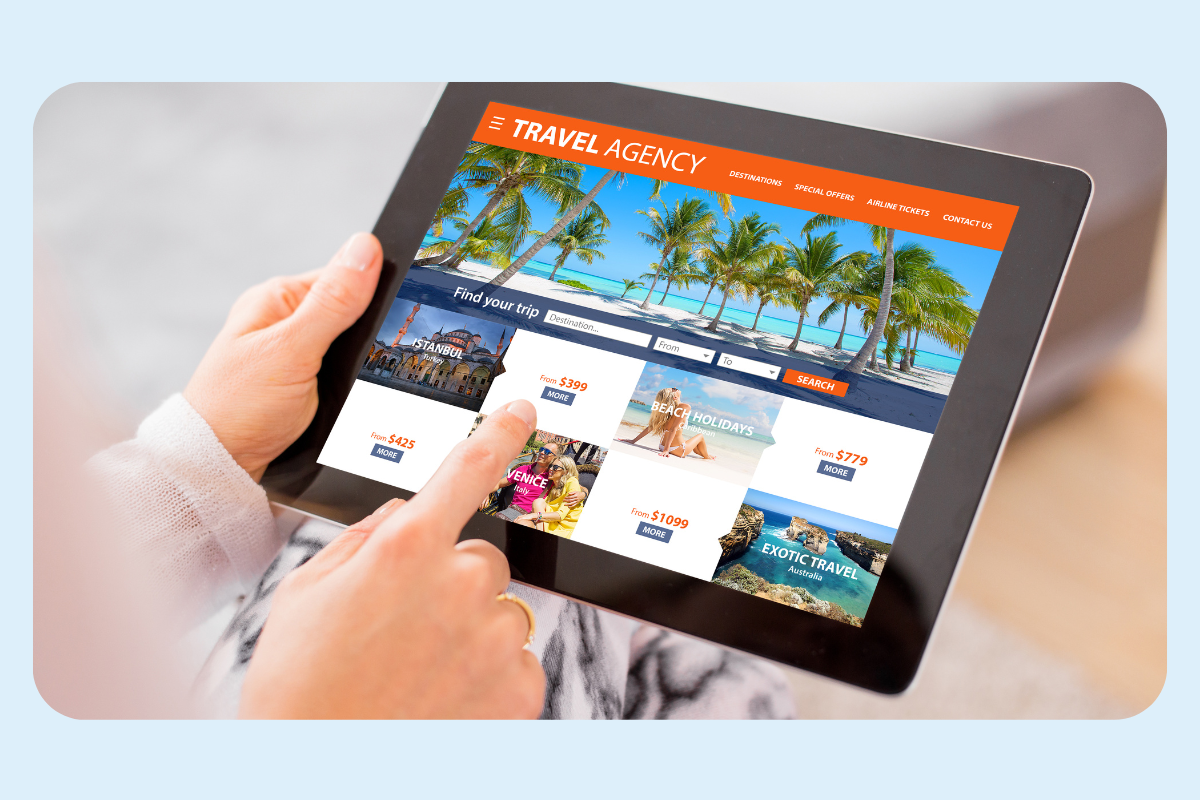
Is the operation of travel meta search engines complicated?
Meta search engines interface is similar to that of standard search engines and travel search engines.
These platforms aggregate and then present many types and categories to the user to make it easier to find a relevant offer and aggregate search results that best match the user’s needs. They often integrate third-party booking sites to expand their database.
In particular, a meta-search engine does not create its own database, but integrates the databases of other search engines, online travel agencies or websites and develops its own ranking method.
At the same time, it can remove duplicate entries and filter the search results to present users with more personalized and responsive listings. This integration helps users directly compare airfares and other travel-related costs.
For travel search engines to work effectively, online travel agencies, hotels, and other travel-related businesses need to provide key information on their web sites, such as prices, room availability, ancillary services, and seat counts . This enables direct comparison and booking .
To help travelers find the best deals, meta search engines check availability through an API interface with all suppliers and filter the data received according to the customer’s needs, facilitating reservations. This comprehensive approach ensures that users have access to a wide range of options and can make informed decisions about their travel plans.

[Read: What is a Global Distribution System ]
Global Travel Metasearch Engine Market Overview : Recent studies indicate a bright future for the global travel meta search engines market over the next 5 years. Valued in millions of USD in 2023, the market is projected to grow significantly by 2028, driven by a steady compound annual growth rate throughout the forecast period.
Regional markets such as North America and Asia Pacific are also expected to grow during this period.
The market includes major search engines such as Google Hotels, Trivago, Kayak, Skyscanner, Tripadvisor, and others, with the top three vendors accounting for a significant revenue share in 2024.
Sources: Global Travel Metasearch Engine Market Research Report 2023 .

During the work on the report The State Of Hospitality Distribution: Metasearch compiled by EyeforTravel and Fornova, the behavior of tourists coming from Australia, Canada, the United Kingdom, and the United States was examined.
According to the survey, 44% of respondents admitted that they “always used metasearch tools,” a group of 73% of respondents indicated that they “did so regularly,” and as many as 94% of respondents were “at least occasional users.”
So as you can see from the above examples, the trend of using a metasearch engine is steadily growing. Therefore, the travel industry must introduce new technologies and constantly follow the lead of the meta search engine to always be able to respond to these market needs.
Multiple search engines include:
It’s a German multinational technology company specializing in metasearch engine services, hospitality and accommodation products. The site compares the prices of more than 700,000 hotels on more than 175 booking sites, such as Booking.com.
It’s a metasearch engine for searching and comparing tourism-related information, including flight details, accommodations, car rentals, and vacation packages. More than 1,000 people work on the service, which manages seven international brands, including Cheapflights, SWOODOO, checkfelix, Mundi, and HotelsCombined.
Tripadvisor
It is one of the world’s most famous and largest tourism platforms based on meta search engines. Every day it helps many people worldwide plan trips, make reservations, or express opinions. The site has more than 1 billion reviews on nearly 8 million businesses. The company is available in 43 markets and provides content in 22 languages. Under the Tripadvisor umbrella are Bokun.io, Cruisecritic, Flipkey, Thefork, Helloreco, Holidaylettings, and others.
[Read also: Best travel management solutions ]

Google Hotel Ads
Google Hotel Ads is a dedicated tool for owners of hotels and other accommodation or tourism-related facilities.
It makes them more visible in Google search results, on Google maps, or in the company’s assistant. Google Hotel Ads considers only people who search for hotels and shows all data about the facilities in a very attractive way.
The ads appear in a particular module of an individual search engine, which can display not only their content but also photos, a list of amenities, or a direct link to the reservation.
Google Flights
Google Flights stands out in the competitive landscape of flight search engines, offering a robust platform designed for those looking to find cheap flights efficiently.
As one of the best flight search engines, Google Flights leverages sophisticated algorithms and a massive database to deliver a user-friendly experience that allows travelers to quickly compare prices, routes, and airlines.
Its intuitive interface and real-time price tracking set it apart, offering not only the cheapest flights, but also insights into price trends and suggestions for reducing travel costs.
The company was founded in 2001 by three IT specialists. In 2003, the first employee was hired to help with website development. In 2004, an office was opened in Edinburgh, and the company now employs about 150 people.
The website based on meta search engines is multilingual, offering flight searches in 20 languages. The major convenience is that users can search for flights without specifying the exact date and destination or compare prices.
Danish multi-search engine compares airline tickets, hotels, and car rental prices. It has agreements with many airlines and agents selling tickets online (OTC), making it easy to find tickets to unusual and not-so-touristy destinations.
Momondo also has a vast database of US airlines. It checks airfares for up to a year in advance, allowing you to group them by price and time criterion.
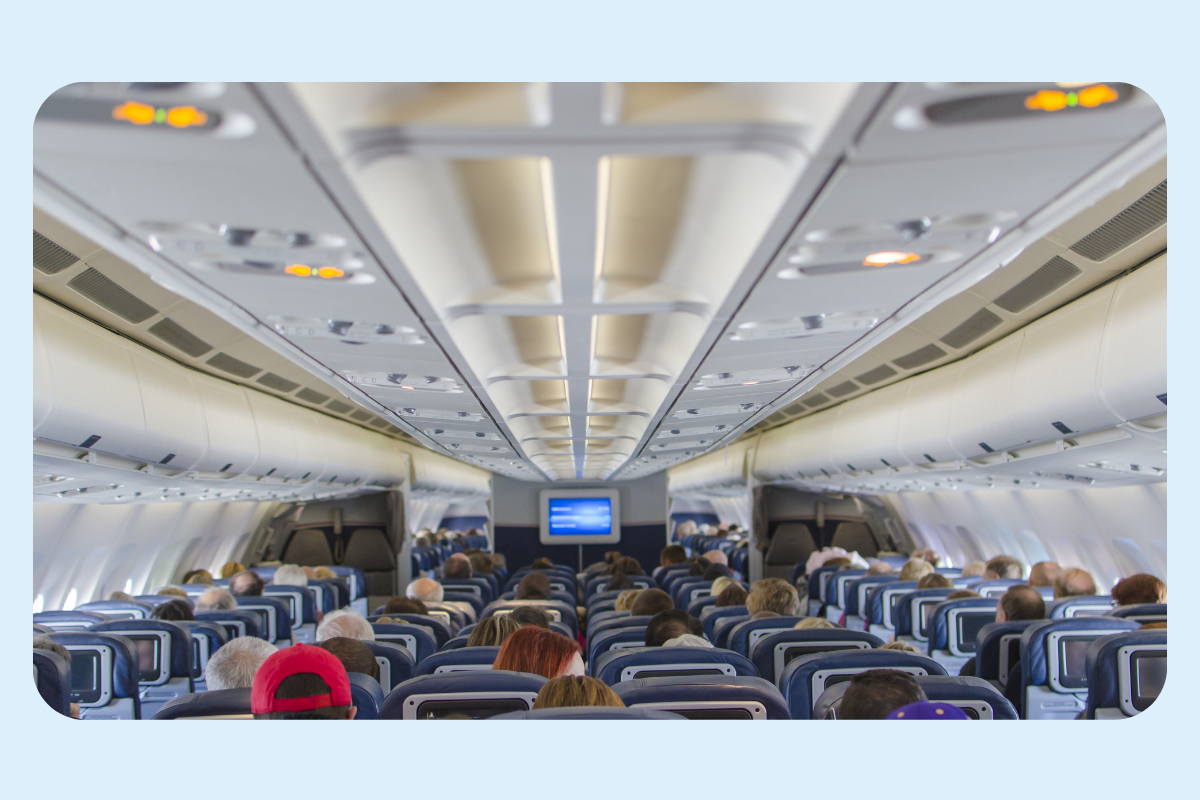
[Read also: Introduction to a hotel channel manager ]
Online travel agencies (OTAs) offer hotels located in different corners of the world, current prices, and provide descriptions and photos.
In addition, hoteliers can decide how many rooms they make available to customers through OTAs. Thus, travel enthusiasts can directly make reservations for a selected property through the OTA website. Examples of such activities include Expedia or Booking.
It is worth mentioning that online travel agencies spend considerable amounts of money on promoting their sites to be able to attract customers. So the offers of hotels and other tourist facilities do not appear there accidentally or for free – OTAs charge an average of 10-20% commission on each booking.
On the other hand, the travel meta search engine aggregates hotel rates from multiple booking sites and OTAs in one place.
This allows those planning a holiday or business trip to find all the most essential data in one place, price comparison, saving time and reducing effort. In addition, it is worth mentioning that meta search engines compare all available hotels meeting the criteria of the query directed to the search engine and redirects users to the booking site of their choice.
Through this, the meta search site does not take commissions from hotels but financially charges booking sites for clicks or visits sent to them.
[You may also be interested in: The Ultimate Guide to Property Management System ]
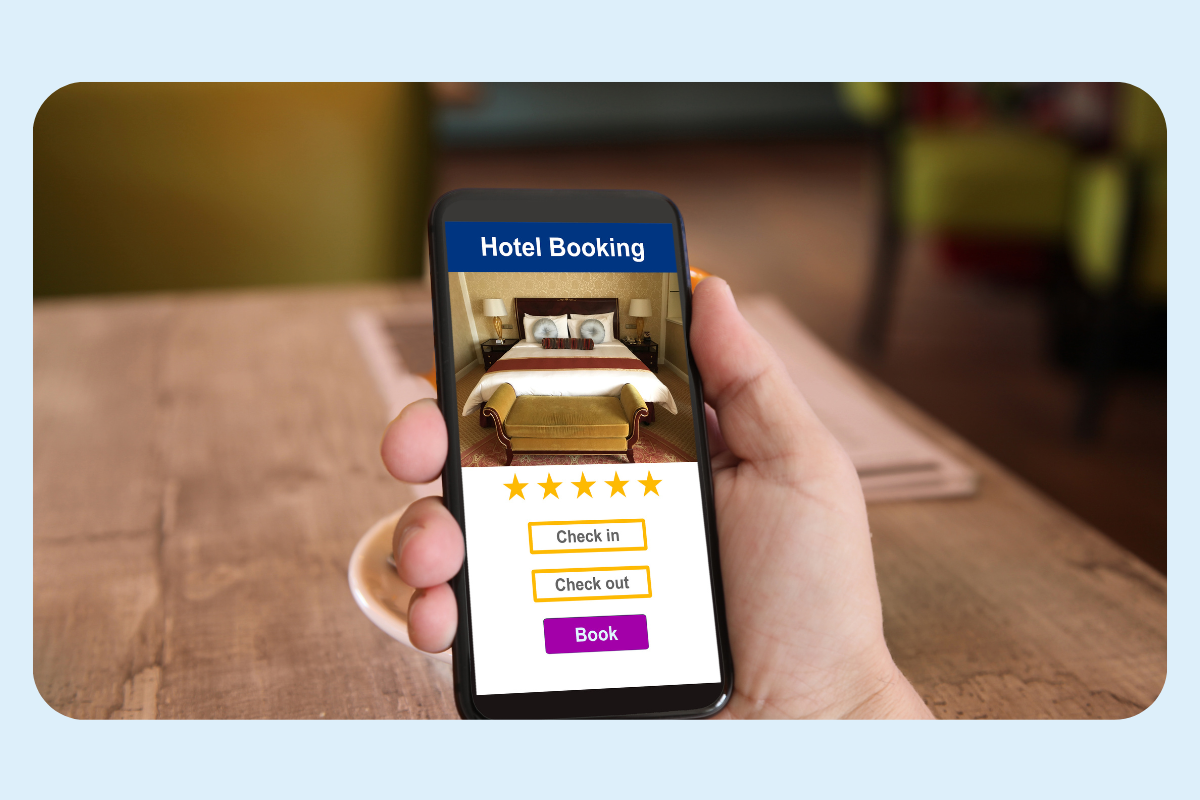
[Read also: How to Choose the Best Travel Agency Software ]
What are the advantages of travel meta search engines?
1. increased brand visibility on the websites.
Meta search engines allow you to increase brand visibility online significantly and higher ranking. For the competitive travel industry, this is very important. Notably, the meta search engine is a sort of an extension of partnerships with OTAs, which increases sales opportunities.
2. Preferential advertising rates
Meta search engines are also cost-effective for promoting hotels or other tourist facilities. This, in turn, optimally affects the marketing budget and marketing strategy. Using multiple meta search engines, there is no need to pay high commission rates, as these systems operate on a pay-per-click model.
3. Significant popularity of meta search engine among tourists
Many meta search engines are popular among people who like to travel. They make it easy to search for flights and accommodations in one place, thus saving travelers time and money.
he high interest in meta search engines makes it a thriving online distribution channel for the travel industry.
An example is the travel search engine handling 300 million queries daily, developed by Stratoflow . The implementation has reduced infrastructure costs by 80% and allowed it to drive 50% more traffic, with a significant reduction in response time by 60%.
4. Possibility to diversify distribution channels of offers thanks to meta search engine
The cooperation of hotels, carriers, and airlines with meta search engines allows combining several distribution channels. In this way, companies avoid depending on the services of only one provider and increase their chances of reaching a more comprehensive range of customers with their offers.
The demand for meta search engines comes at a time when the fragmentation of services in a given sector is so significant that a simple Google search leads the user to a multitude of web pages, the browsing of which is time-consuming, and the ability to compare a variety of offerings is limited.
A meta search engine uses metadata to aggregate and categorizes a considerable amount of dynamic information from multiple sources to return to the user with the most relevant search engine results.
With high-tech travel meta search engines , the market becomes more transparent, tourists can get a better deal at the price of their choice, and sellers are encouraged to compete on product quality and value.
Smaller hoteliers, often powerless in the face of enormous advertising budgets of world-renowned hotel chains, have, in turn, a chance to reach new customers and compete fairly with industry leaders.
[Read also: Yield Management: What It Is and The Best Strategies ]

Today, customers value the reliability of information and the ability to obtain it quickly. If you want to book a flight or hotel, you probably pick up a smartphone or use a laptop. The times when you had to visit a travel agent are practically gone.
People have different requirements, preferences, and budgets when planning a trip. They may be looking for a family vacation, a romantic weekend, a honeymoon, or a place for a corporate trip. With the help of a travel meta search engine, finding the perfect match is extremely easy – just enter the proper criteria to get a list of matching offers.
The speed of the meta search engines makes customers eager to book, and the efficient service builds a positive user experience.
Because of this, they are willing to share positive reviews of a particular hotel or carrier, thereby driving new customers.
[Read also: What is a booking engine ]
Meta search engines – use their potential in your business
There are many search engines available on the market. However, meta search engines have become particularly important for the travel, hotel, and airline industries, making it easier to reach potential customers. Thanks to their advanced search capabilities and fluidity, their users receive highly personalized offers, which significantly increase the chances of more direct bookings . Learn more about how you can build your own, custom travel search engine in this article: How To Build Travel Meta Search Engine: A Step-By-Step Guide .
At Startoflow, we understand the needs of the travel industry very well and have experience developing high-performance metasearch engines . So if you want to implement such a solution in your business, we invite you to contact us. We will be happy to help you and suggest a customized solution tailored to your needs.
Related Posts
- Best AI for Coding: 10 AI Tools and Assistants for Software Developers for 2024
- How To Build Travel Meta Search Engine: A Step-By-Step Guide
- Can ChatGPT Write Code?
- What Are Large Language Models: Definition + Best Examples
- Key Benefits of Artificial Intelligence For Modern Businesses
We are Stratoflow, a custom travel software development company . We firmly believe that software craftsmanship, collaboration and effective communication is key in delivering complex software projects. This allows us to build advanced high-performance Java applications capable of processing vast amounts of data in a short time. We also provide our clients with an option to outsource and hire Java developers to extend their teams with experienced professionals. As a result, our Java software development services contribute to our clients’ business growth. We specialize in building bespoke travel solutions like fast search engines, metasearch engines, booking engine services or channel manager integrations.
Testimonials
The developed software product was built from scratch with solid quality. We have had a long-term engagement with Stratoflow for nearly 10 years. We look at them as partners, rather than contractors. I'm impressed by their team culture and cross-team support.
Nathan Pesin
CTO, Legerity Financials
Stratoflow was a great partner, challenging as well as supporting our customer projects for the best outcome. They have a great pool of talent within the business - all very capability technologists, as well as being business-savvy and suitable for consultancy engagements.
Chris Goodall
Managing Consultant, CG Consultancy (UK) Limited
The bespoke metal exchange platform works great, it is easily accessible and richly functional. Stratoflow managed deadlines capably, meticulously documented their progress, and delivered a complex project at an affordable cost.
Bartlomiej Knichnicki
Vice Chairman, Supervisory Board
We are very pleased with our partnership with Stratoflow and, as we continue to grow, we expect to increase the numbers of developers that work with us on our projects. They have proven to be very skilled and flexible. They're extremely reliable, and they have a very good company culture of their own, which gives them a real edge compared to other providers that serve more as production shops rather than thought partners and creative problem solvers.
Andrew Kennedy
Founder & Managing Director, Tier 2 Consulting
Stratoflow successfully customized the system according to the specific functionalities and without bugs reported. The team was commended for their adaptability in the work process and for their responsiveness.
Joshua Blavins
Tech PM, Digital Agency
The features implemented have received overwhelmingly positive feedback from end-users. Stratoflow has an incredible technical expertise and a high degree of flexibility when it comes to changing project requirements.
Chief Technology Officer, Legerity
They have impressively good knowledge of AI issues. Very responsive to any amendments and findings. Very good communication. We received a finished project which could be implemented into production shortly after testing.
CO-Founder & CTO
Circular Fashion Company
They provided superb service with seamless communication and a highly professional, technical approach. The team displays impressive technical expertise and are willing to share information and engage in constructive feedback.
Filip Stachnik
Operations Manager, Otwarte Klatki (part of Anima International)
They're very skilled technically and are also able to see the bigger picture. Stratoflow can actually think about solutions, not just the technical task at hand, which they've been assigned.
Arnd Jan Prause
Chief Operating Officer, musQueteer
Stratoflow delivered the website successfully within the timeframe and budget. They assured that the output met the set requirements. Overall, the team's performance was excellent and recommended for their exceptional technical business expertise. They've been able to deliver all of their work on time and within budget, which has been very impressive.
Lars Andersen
Founder & CEO, My Nametags
Travel sector rebound after the pandemic is complete. We have fantastic global coverage of travel data distribution due to mutual agreements and data exchange between aggregators. Competition for the best price of limited resources degradates margins. How to win? Provide personalized experience and build your own products in the front-office. The missing bits: a traveller golden record collecting past activities and a AI/ML recommendation technology.
Michał Głomba
CEO at Stratoflow
- Our Approach
Metasearch and Travel: Cross-Channel Optimizations

For 15 years, Online Travel Agents (OTAs) dominated the travel market. OTAs such as Expedia and Booking.com established a chain of keywords that ranked high in the search engines. The search was both powered by organic and paid methods. This allows any hotel that ranked higher in the search engines to get the clicks and increase the chance of bookings.
However, the metasearch channels have now gained the upper hand. Popular metasearch channels include Google, TripAdvisor, Trivago, and Kayak. These metasearch channels used local and global positioning strategies through which the behavior of the internet users was changed.
What are Metasearch Channels?
Metasearch seems to be quite a fancy name. However, as discussed in our previous blog post , these channels are just like search engines. A user puts in their requirements for what kind of travel options they are seeking and the channel will return multiple results from hotels meeting the user’s requirements. These results are then compiled in one place.
How Do Hotels Benefit from Metasearch?
Given how metasearch is causing disruption in the travel industry, hotels, resorts and other travel authorities have been forced to make connections with them. This connection ensures that the hotels and their offered travel packages are featured in the results. Metasearch channels help increase the number of clicks by directing the traffic towards the websites of the hotels.
Taking It Beyond Traffic Generation with Metasearch Channels
Over the years, hotels have realized that metasearch channels are not just a tool for lead generation. The reason is that achieving a specific number of clicks does not mean that people will actually book a travel package. This discussion can be taken into much more depth given that not all leads are quality leads. The gist of the situation is that hotels realized the need of formatting their marketing campaigns so as to generate actual bookings through the metasearch channels.
Benefits of Metasearch Cross-Channel Optimization
Here is how an hotelier can benefit from metasearch cross-channel optimization : The number of metasearch channels is expanding. It is no surprise that hoteliers want to connect with them in order to optimize their current marketing strategy. The competition in the travel industry is always becoming tougher, especially given the disruption caused by metasearch channels. Cross-channel optimizations require strategy and testing between channels so hoteliers can manage multiple channels effectively.
Marketing campaigns need to be managed so as to get the required results. Managing each metasearch channel separately can cause mistakes. It will also be more complicated to determine how much success a hotelier is harnessing from each channel.
When there are multiple connections, there is big data as well. This data is quite significant to marketing research. Hoteliers need information on customer behavior and interaction to improve their marketing strategy.
How Metasearch Channels Affect Hotel Performance
Metasearch channels can be used way beyond lead generation. In order to benefit from them, metasearch channels must be viewed as marketing channels. An hotelier can increase their chances of direct booking if the elements of metasearch channel can be optimized.
Similar to Paid Search, each channel is evaluated and optimized accordingly. Let say the hotel would like to see each channel ROAS at 400% and above. TripAdvisor has much higher spend, but has a less efficient ROAS of 205%. Trivago on the other hand has much lower costs, yet the ROAS is much higher at 850%. Cross channel optimizations entail how we can improve TripAdvisor ROAS to meet client goals. By reducing bids and budget to TripAdvisor, and reallocating them to Trivago we can expect TripAdvisor ROAS to improve. As a result, you will likely see a decrease in Trivago. Hopefully remaining above the client 400% goal.
A metasearch channel can positively affect the performance if certain aspects are taken care of and accounted for. The hotel profile needs to be up to date. With cross-channel optimization, such activities are easier to conduct. On the other hand, never forget that metasearch channels toughen up the competition in the travel industry. This requires hotels to conduct regular rate parity checks. Determine where you can offer a better rate or how you can justify an increased cost.
One of the advantages of some metasearch channels is that hotels get access to real-time reviews. These reviews can either make or break the hotel. The reviews within the metasearch channels need management and evaluation.
It is also important to keep in mind that metasearch is bound to go through evolutionary stages. This will result in a more complex environment and also increase the demand for metasearch cross-channel optimization software. The increasing complexity of metasearch channels gives rise to the demand for better marketing strategies and improving budgets. Varying metasearch channels also have their unique approaches. Keeping up with each approach separately can heighten the pressure on marketing experts. Remember to consider each channel, test to find what works, and determine how to allocate budget and targeting in order to see improved performance across all channels.
Want to learn more on how Paid Search can help your business? Read our case study on how Revel Systems saw 429% increase in Lead Generation with a lower CPL .
You Might Be Interested In

100 Streaming Statistics & Trends for Advertisers [2024]
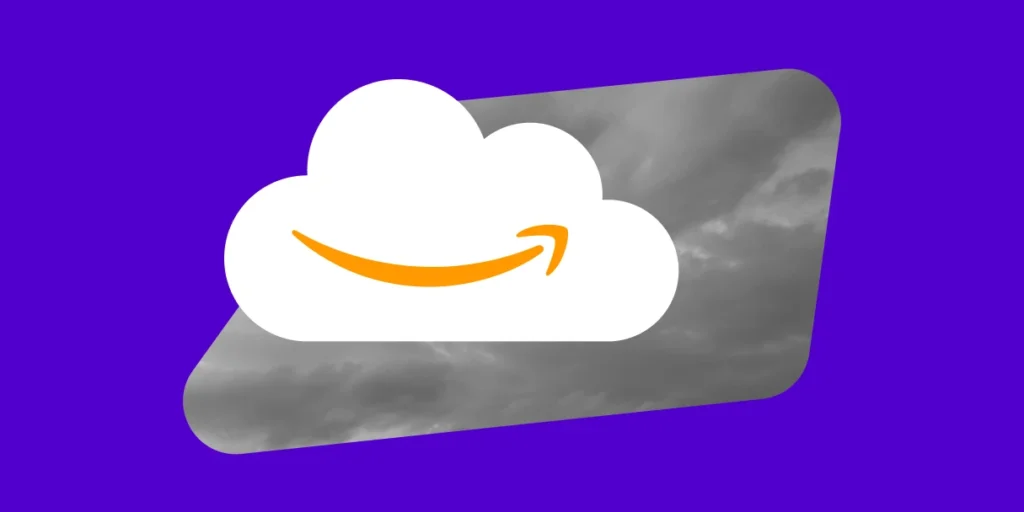
How Amazon Marketing Cloud (AMC) Works [2024 Update]

How to Prepare for Amazon Prime Day 2024: Seller’s Guide
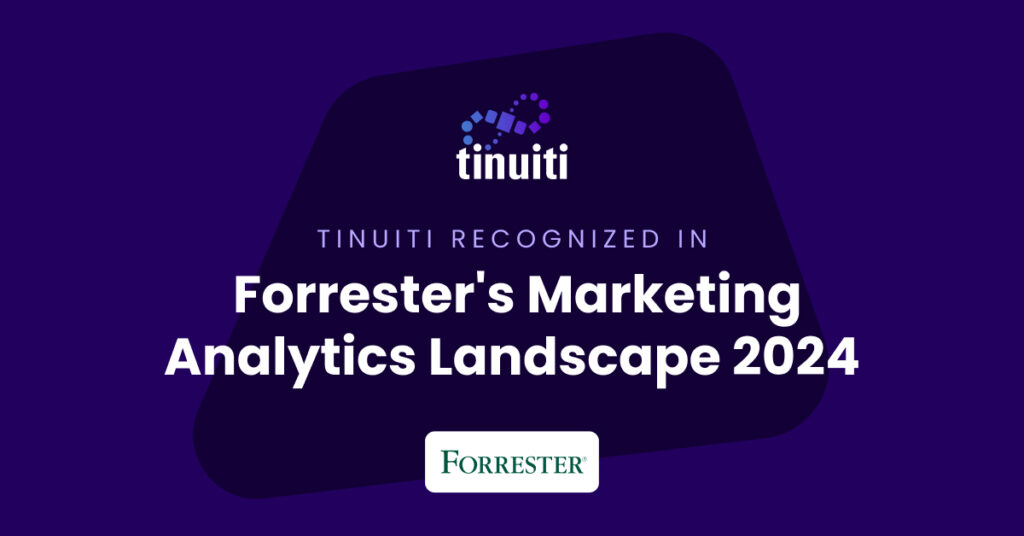
Tinuiti Marketing Analytics Recognized by Forrester
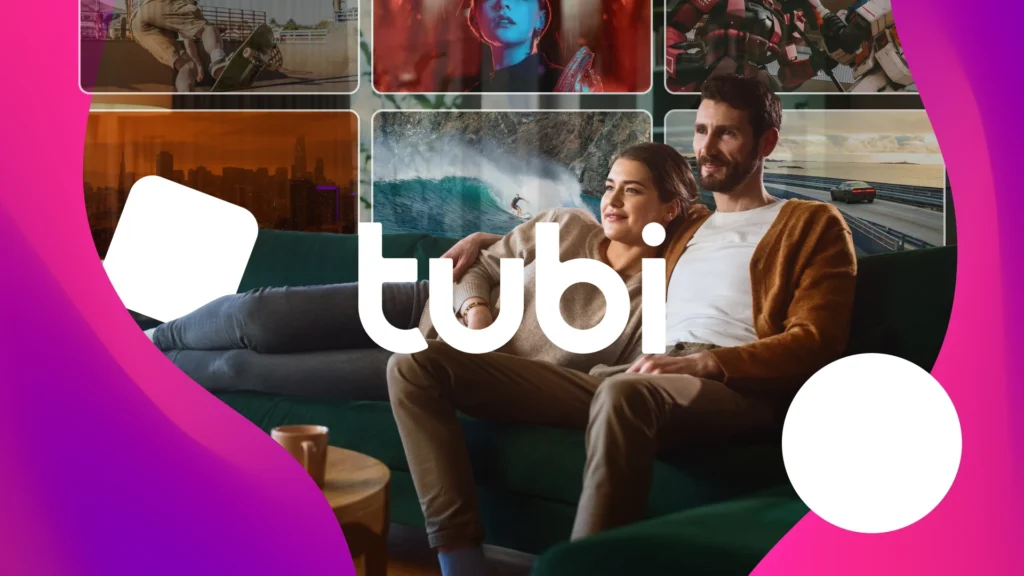
Tubi Advertising Guide: How it Works & Ad Costs

Roundel Media Studio: What to Expect From Target’s New Self-Service Platform

What’s Advertising Video on Demand (AVOD) & How Does It Work?

What’s Media Mix Modeling? [Marketer’s Guide with Examples]

What Are Free Ad Supported TV (FAST) Streaming Services?

Amazon Trends & Industry Predictions for Sellers
*By submitting your Email Address, you are agreeing to all conditions of our Privacy Policy .

GDS, OTA and Metasearch: What’s the difference?
Learn about distinctions between GDS, OTA, and metasearch platforms in the hotel industry. Understand roles and how they impact hotel distribution strategies.
Table of content:
Use GDS, Metasearch, OTAs to Boost your Hotel Online Presence
- Metasearch Engines…
You must have encountered these terms before, but the question is how exactly can they benefit your hotel to gain more online visibility and sell more rooms? Join me as we delve into this topic together.
GDS: Global Distribution Systems
The term GDS stands for "Global Distribution System" and is regarded as a prehistoric relic of the online travel industry. GDSs were initially developed in the 1950s by airline companies to expand the reach of hotel and car rental businesses. They did this by facilitating automated transactions between travel agencies (both traditional and online) and travel service providers.
The three most prominent GDS systems are Amadeus , Sabre , and Travelport . You can read more about them here .
GDS is a tool commonly used by travel agencies to access up-to-date information on the availability and pricing of flights, hotel accommodations, and car rentals across the globe. With this technology, travel agents can swiftly and efficiently respond to quote requests with accuracy and agility.
Typically, hotels offer a discount of around 30% when selling their rooms through GDS, as opposed to public rates. To make this possible, Central Reservation Systems (CRS) like Sabre enable hotels to sell their rooms to multiple GDS platforms simultaneously. Nevertheless, it's entirely up to the hotel to connect directly with one or two GDS or use a CRS. The exciting part is that different Channel Managers can connect with GDS systems as well.
GDS can be an expensive selling channel that primarily enables the bulk sale of rooms to big corporations (for their business guests) or travel agencies (for leisure travellers). As a result, smaller, independent hotels usually do not need GDS.
For more information on Global Distribution Systems, you can dive into: Global Distribution System (GDS) - The Complete Guide for Hotels
OTAs: Online Travel Agencies
OTA stands for "Online Travel Agency" and has become a vital component in today’s travel industry. With the increasing popularity of the internet, numerous websites have emerged that offer rooms for booking without the need for direct human interaction.
These websites have rapidly gained significant market share. Booking.com is the most renowned OTA, although Expedia (popular for corporate guests) and Hostelworld (preferred for budget-friendly accommodation options) are also well-known.
Travellers find these platforms extremely useful as they allow them to easily compare rates , reviews , and availability of various lodging options in one place. This makes it easy for travellers to book accommodations with just a few clicks.
Typically, hotels have the option to list their property on an OTA without incurring any fees. By providing your hotel photos, descriptions, available rooms, rates, and other relevant information, you can decide how many rooms you would like to sell through the OTA.
It's entirely up to you to determine the availability and rates on the platform. However, you should keep in mind that although listing your hotel on the OTA comes at no cost, you will have to pay a commission of approximately 15% to 20% each time you secure a booking.
We strongly recommend that hotels use OTA to be more visible online , as this offers an opportunity to reach potential guests on a global scale. OTA's typically allocate significant resources towards online marketing, resulting in their listings often outranking other search results for travellers on popular search engines like Google.
Instead of attempting to compete with them, it would be better to view OTAs as an additional sales distribution channel.
While it can be time-consuming to update daily availability and rates by logging into each OTA's extranet, you can simplify this process significantly by utilizing a Channel Manager . This will let you automate or streamline these tasks. Additionally, you can use these few tips to maximize your hotel's online presence with the use of a Channel Manager .
Here’s our handpicked selection of the Top 10 Online Travel Agencies you should connect with today !
Meta: Metasearch Engines
Metasearch engines have emerged as a crucial element in the travel industry and have closely followed the advent of Online Travel Agencies (OTAs). These engines showcase up-to-date rates of hotels in a particular destination.
Curious to know the contrast between these and OTA's? Interestingly you may find varying prices for the same hotel, room type, and date on metasearch engines due to their retrieval of rates from multiple OTA's.
Have you ever stumbled upon a website selling your hotel rooms without your consent or knowledge? If yes, chances are high that it's a metasearch engine website.
These platforms, including Trivago , Kayak, Skyscanner, TripAdvisor, and Google , have all incorporated metasearch engine tools into their services.
Fortunately, there is also an option to include a direct link to your Hotel Website and your Booking Engine - as long as your channel manager has a compatible booking engine.
While OTA's typically charge a high commission for each completed booking using the CPA or " Cost-Per-Acquisition " model, metasearch engines use a bidding system and a " Pay-Per-Click " ( PPC ) model where you pay a fixed amount for each click on your link. Whether or not this investment is worthwhile ultimately depends on your calculations and decision-making.
In today's era, where travellers rely heavily on the internet to search and book hotels, it has become crucial to establish a robust online presence for your hotel. Gone are the days when travellers searched for a single keyword and booked the first available option.
Nowadays, they conduct many different searches and visit various websites before deciding. Therefore, the more frequently your hotel's name appears in search results, the greater the likelihood that potential guests will perceive it as the ideal place to stay.
There are numerous ways to boost your hotel's online visibility. While a GDS may be too expensive for smaller independent hotels, several other options can come in handy.
OTAs are a crucial aspect of the industry, and although metasearch engines may require a bit more technical know-how to manage, they can serve as highly appealing sales channels and are worth considering.

More about HotelMinder
Next up in: Distribution Management
Maximize your hotel performance with hotelminder.
HotelMinder is a leading advisory agency for hoteliers to maximize business performance with hands-on advisory & project management services; a free and unbiased hospitality knowledge platform with Tech, Marketing, Revenue and Operational content; and a marketplace for professionals from all over the world to find hospitality specific software and services that best match their vision and requirements.
Browse Academy
- Hotel Technology
- Hotel Tech Stack
- Operations Software
- Distribution Technology
- Hotel Website
- Revenue Management Software
- Guest Experience Technology
- Short Term Rental Technology
- Hotel Marketing
- Digital Marketing
- Content Marketing
- Website Marketing
- Search Engine Marketing
- Social Media Marketing
- Paid Advertising
- Distribution
- Guest Experience
- Hotel Revenue
- Revenue Management
- Competitive Analysis
- Forecasting & Budgeting
- Revenue Generation
- Performance Evaluation
- Hotel Operations
- Opening & Setting Up
- Front & Back Office
- Housekeeping & Maintenance
- Food & Catering
- Sustainability
Receive our latest articles directly into your inbox — subscribe to Newsletter
Find the best technology and expert services for your hotel business., hotelminder, it's all the help you need to transform your hotel's digital presence and maximize performance ., read more: trending hotel technology content.
Check out the latest Insights, News and Articles from our team and industry leading partners.
Discover more insightful articles written by Industry Leaders in HotelMinder's Open Hospitality Academy .
Firstly, we assess
We evaluate objective(s), defining opportunities and setting goals.
Then, we plan
We make a plan detailing what should be done to help reach set goals.
Step-By-Step Guide on How to Build a Travel Search Engine Website
Starting a travel search engine website is a different process for every startup depending on the business plans and goals. The general process includes designing the website and then choosing what type of integration to do, depending on budget, license or access and stage of development. The two main types of integration solutions are affiliate or API.

The Travelpayouts partnership platform provides all necessary tools to build a travel search engine website with flights and hotels. Signing up only takes a couple of minutes and you’ll receive access to over 100 well-known travel brands and various partner tools from basic to advanced. You can earn up to 20% on each booking for a travel service. In 2021 alone, Travelpayouts paid partners over $5M. To earn on the flights, hotels, car rentals and other travel services join the Travelpayouts partnership platform for free today.
Join the Travelpayouts Partnership Platform
Access exclusive tools and the best travel partner programs, including flights, hotels, car rental, insurance, tours and activities, all in one place.
Existing Opportunities for Creating a Travel Booking Website
- Direct database is when you manually create your own travel database. This is usually done when the host is creating a website. For example, a hotel chain or a tour company that only wants to sell their own hotels or tours, or an airline that is selling their flight tickets direct to consumer. A direct booking portal can also be created if a company establishes contracts with host travel suppliers to manually list and upsell specific deals/products.
- GDS integration is for OTAs (online travel agencies) to access full inventory of travel solutions to sell to their customers. GDS stands for the global distribution system that allows travel suppliers to distribute travel products, rates and relevant information for travel agents to sell. Some commonly known GDS providers are Amadeus, Sabre and Galileo, which is also known as TravelPort. GDS integration is only available for licensed travel agents that are ARC or BSP accredited. Once approved with the GDS, travel resellers have access to backend wholesale rates to buy services on customer’s behalf. When an agent wants to showcase the GDS database on their website, API integration is done.
- Affiliate integration is for start-up travel resellers who want to showcase a range of travel deals on their site to earn commission without having to be an agent. Affiliate is the easiest and most affordable solution, and is most often free to set up. Partners share their booking commission with the affiliate company that is hosting the deals. It is a win-win partnership where the promoter gets access to promote travel services in return for shared commission. Partners often have creatives to promote such as text links, banner ads, widgets and white label search engines. The partner’s referral code is coded into the promotional creatives, so that when setup on a website, the affiliate earns commission when their visitors are referred by them. For example, with the Travelpayouts digital partnership platform , you can create a travel search engine featuring numerous indispensable travel services from flights to travel compensation. All thanks to the fact that the platform is connected to over 100 well-known travel brands in different categories, such as Booking.com, TripAdvisor, Kiwi.com, and others. You can learn more about each of them in the brands directory .
- API integration is more advanced than affiliate, because it takes more development time to setup and most travel companies do not allow their API to be used freely. A partner may need to be approved for API access before they can setup. The earning potential varies depending on which company’s API you are setting up. Once approved, you will require an API developer to install the API, which can often require ongoing technical support. API stands for a set of functions or procedures allowing the creation of applications that access the features or data of an operating system, application or other service. When relating to travel development, APIs are used to showcase another travel company’s inventory on your site, so that visitors can browse directly on the website and the deals can show in conjunction with other deals from other travel companies to create a comparison search engine. API is advanced integration and is not a quick setup process. It requires a properly trained developer to assist with setup. Learn more about Travelpayouts API in the knowledgebase .
A search engine website focused on travel is any website that provides customers with the ability to search for deals related to their travel inquiries. There are various types of travel sites including OTA (online travel agencies) and meta search (aggregator search engine), along with direct booking airline, hotel and tour websites to book directly from the hosts.
The approach you take to the development project depends on what type of travel website you are looking to build for your business. If you do not have web experience, projects both large and small require a development team or developer to manage the travel web design and set up the on-site deals and database. It is recommended to work with development providers who specialize in the travel industry to get the best solutions for your requirements and to save time and money in the process.
The web platform that the site is developed on can differ based on project requirements including PHP and WordPress , as some of the most well known. PHP is more suitable for custom projects that require a custom-made admin. WordPress is more common and suitable for start-up websites that can operate using the dashboard provided with WordPress admin, which includes blogging capabilities and plugins.

Plugins are add ons that can be added to websites for additional features that don’t require custom coding. The benefit of using plugins is that you can save time and money in the development phase by using third party solutions rather than creating features uniquely for your site, which can be time extensive and costly. Travelpayouts offers an automated travel booking plugin for WordPress to build your site.
Once you have determined which platform the site should be built on, the next step is discussing your preferred design and appearance of the website. Usually, the developer or designer will request reference sites to be sent to them to give them an idea of what look and feel you want your website to have.
Modern websites such as Trivago and Kayak have a very simplistic homepage, which has become popular. They also display the travel search engine immediately, which directs visitors to input their travel details and instantly start searching for deals.

The design is an important factor in the process of building your travel search engine website, as it is what initially will separate you from your competitors. When a visitor first arrives at your website, they should feel like they are in good hands with a professional design that is captivating and will make the customer want to stay as well as be directed to do something.
This is called a “ call to action ” and is what makes the visitor interact with the website. The appearance of the travel page will influence the bounce rate and initial interest in your business.
Integrating travel deals onto your website is done in various ways including direct database and GDS (global distribution system), along with affiliate and/or API.
What Is the Best Solution?
The best solution for your integration depends on your budget and the type of travel company you are creating.
- Affiliate is the easiest and the lowest cost option. White label is very competitive, and providers such as Travelpayouts and SkyScanner offer this.
- API is the best option for comparison sites, but requires approved access and a time consuming setup process with specialized developer.
- GDS would be best for classical travel agents who are working offline and looking to access full inventory.
- Direct booking is best for businesses that have already established their services and sell directly to consumers or resellers who are willing and able to create relationships and contracts to resell.
If you are looking to build a travel affiliate-based search engine website, here is a five-point step-by-step process on how to go about it.
How to Build a Travel Affiliate-Based Search Engine Website
- Step 1 – Create a website plan. Budget accordingly and purchase your domain and hosting if required. Register your name at any registrar like GoDaddy.
- Step 2 – Design your web page. While determining the design of your site, you can use ThemeForest to gain inspiration and ideas with thousands of pre-made themes.
- Step 3 – Build your website for free on WordPress. If you do not have experience with developing, you can hire a travel affiliate web developer who has expertise in the area, like TravSell.
- Step 4 – Research and sign up with travel affiliate partners . Gain access to text links, banners, widgets and white label search engine codes.
- Step 5 – Integrate travel search engines and/or affiliate codes. Set up travel deals on your website according to your preferred method.
If you use Travelpayouts, login to your dashboard to access the integration solutions available to use. They are all available in the tools section:
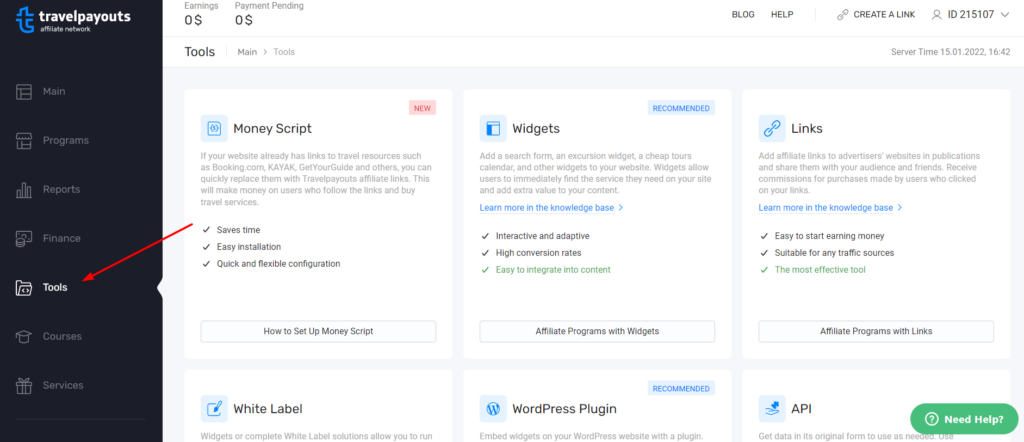
Commission can be tracked from your dashboard as well, which will show confirmed bookings and commission.
You have three main options on how to integrate Travelpayouts flight and hotel metasearch:
- Use a widget and send traffic to Aviasales/Hotellook or to your White Label project
- Build a White Label project. If you do not want to send traffic to Aviasales or Hotellook, and want to keep it on your own webpage, you have to create White Labels. Create two white labels for flights and hotels respectively. You can integrate the logo and navigation of your main website on the white labels. Here, you will find the guide on how to set a White Label on your project.
- Build a stand-alone meta-search based on API. For those who need more flexibility, there’s API. You could use it, for example, to offer something for the user based on his location using Travelpayouts Data API. You can also use API to show the popular directions from the user’s city .
White Label and API Alternatives
If you don’t want to create a White Label project or if you don’t understand the API, you can simply integrate the search form on any page of your site. It’ll only take a few minutes.
For example, you can add a search form widget from the WayAway partner program to your website. Implementation is quite easy. Just copy the code of the widget to your page:
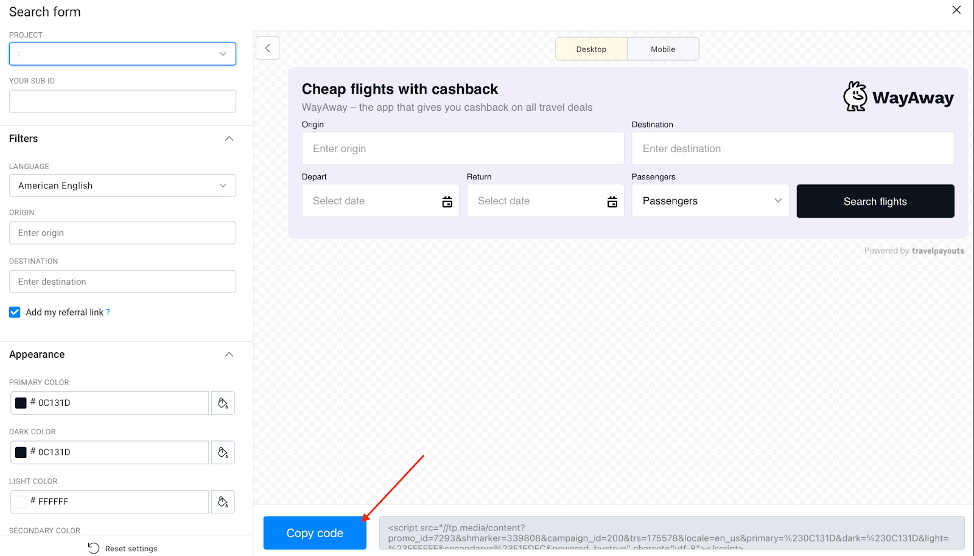
This code must be embedded into your website where you want the form to be displayed:
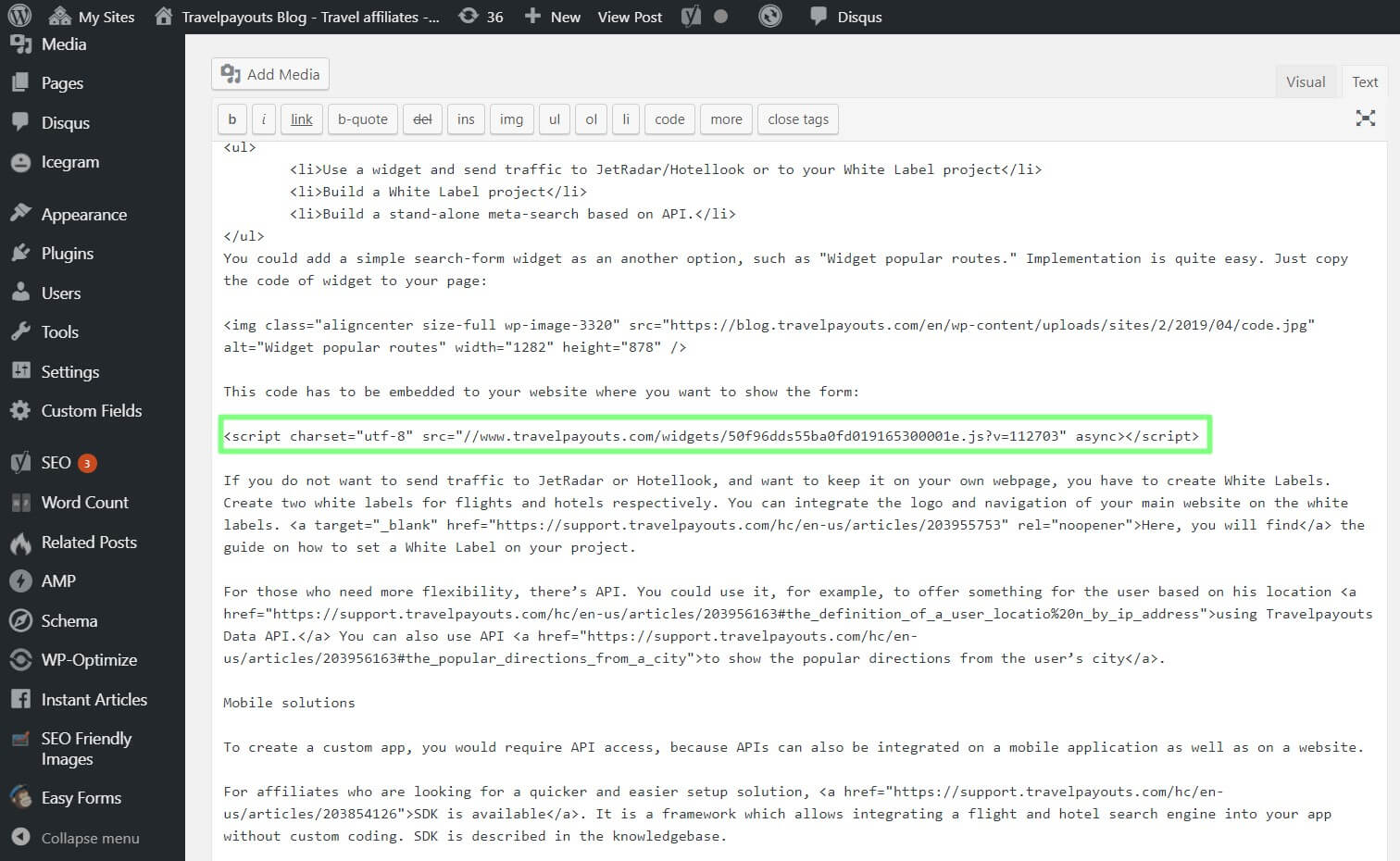
If your users search for and purchase tickets with this widget, you’ll receive a 50% revenue share reward for each sale.
In addition, pay attention to other WayAway partner program tools , which you can quickly and easily integrate into your project. For example, travelers can take advantage of the useful price calendar, flight charting, or prices for flights to popular destinations.
Mobile Solutions
To create a custom app, you would require API access, because APIs can also be integrated on a mobile application as well as on a website.
Travelpayouts provides partners with Travel App template application , which can be customized and placed in the application store.
You could also make a White Label app , which is currently only available for iOS. You can learn about these options from this Travelpayouts webinar:
Do I Need Special Website Hosting to Run a Travel Search Engine?
No, you can use basic website hosting offered from most hosting companies that allow cPanel access, so you can update cNames in the DNS for white labels.
What Are the Other Costs Involved?
Costs may include designers, developers and marketing expenses. Marketing is an ongoing expense, whereas development costs are usually a one-time setup fee.
How Much Money Can I Earn as a Travel Affiliate?
The travel affiliate programs you work with determine the commission earned on bookings. There are two types of affiliates, including Pay Per Click and Pay Per Sale. Read the program’s FAQ and commission page to find out the exact commission details. With Travelpayouts, you will earn 1-10% from the total price of the travel service that is sold thanks to you. The Travelpayouts commission policy is described there .
If you need more information about the earning potential of the platform and what you need to get started, watch this video .
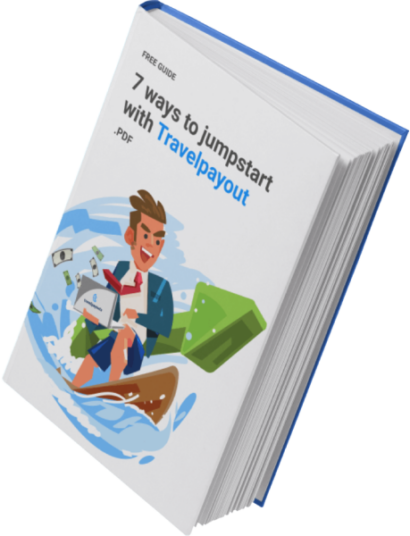
7 Ways to Jumpstart With Travelpayouts
What is the best way to market my website.
There is no universal technique that is best and works every time. To start, you could choose a specific niche and/or location to separate yourself from competitors. Then, dominate your market with an aggressive search engine and social promotions using Google and Facebook. Follow the Travelpayouts blog to stay informed about the best ways to market your site.
Can I Change My Integration Type After Setup?
Yes, you can continue to modify your website with further development support from your developer or team. It may require extensive changes to your business model. Once a site is aged with traffic and bookings, the travel reseller has more income partnership opportunities.
Aside from all the options, API is the most flexible solution. It gives you unlimited freedom to develop your own travel website.
What Else Should I Know?
Consistency is key when growing any business. It takes time and effort to establish a loyal customer base, but the travel industry is constantly growing and changing with new opportunities. Make your business unique to stand out and don’t be afraid to try new things.
Confident travel starts at KAYAK.
Since 2004, kayak has been revolutionizing the travel industry. metasearch for travel no one was doing it. until we did..
Today, we process billions of queries across our platforms each year for travel information, helping millions of travelers around the globe make confident decisions. With every query, KAYAK searches hundreds of travel sites to show travelers the information they need to find the right flights, hotels, rental cars and vacation packages.
In over a decade, we've grown from a small office of 14 employees into a company of over 1,000 travel-loving teammates working across 7 international brands; KAYAK, SWOODOO, checkfelix, momondo, Cheapflights, Mundi and HotelsCombined. Together, we make it easier for everyone to experience the world.
In 2013, we were acquired by Booking Holdings, the world leader in online travel.
KAYAK by the numbers.
Our passion for data informs everything we do. Every team member at KAYAK knows our business inside and out, down to the numbers.
Interested in a career at KAYAK?

Hallo, Berlin.
View map of eu technology center.

Hello, Cambridge.
View map of global technology hq.

Hej, Copenhagen.
View map of momondo hq.

Hola, Miami.
View map of latin america office.

Sveiki, Kaunas.
View map of technology center.

Alright, London.
View map of uk business office.

Hello, Stamford.
View map of global business hq.

Grüezi, Zurich.
View map of eu business hq.

Olá, Sao Paulo.
View map of brazil business office.

Hello, Concord.

歡迎, Taipei.
View map of taipei business office.

Hello, Sydney.
View map of sydney business office.
Top International Flight Routes .
Cheap flights, hotels , rental cars and travel deals:
KAYAK searches hundreds of other travel sites at once to find the best deals on airline tickets, cheap hotels, cheap cruises, vacations and rental cars.
Not what you’re looking for? Find thousands of other hotels , flights , car rentals and package deals with KAYAK.
- Request a Demo
- Signup Free

- Travel Portals
- B2B Travel Booking Portal
- B2C Travel Booking Portal
- Airline Reservation System
- Cruise Booking System
- Hotel Extranet
- Travel Agency Software
- Arabic Travel Booking System
- Flight Reservation System
- Hotel Reservation System
- Car Rental Reservation System
- Cruise Reservation System
- Travel APIs
- Hotel + Flight API
- Excursion Management
- Financial Accounting
- Fleet Management
- Mice Solutions
- Online Reservation System
- Travel Booking Engine
- Flight Booking Engine
- Hotel Booking Engine
- Trade Shows
- Central Reservation System
- Amadeus GDS
- Galileo GDS

Travel Meta Search Engine
Taking advantage of metasearch engines can boost your visibility and increase revenue., clients and partners.
Trusted by 1000+ companies around the world

At Travelopro, we believe that Latest technology strengthens all successful, modern travel agencies. Traditional approach of people resources and quality does not work any longer. Travelopro is here to Digitally Transform your Business. Travel Agencies now increasingly expect technology to be the agent of change and expect us to devise strategies that are driven by ideas. Every one of our customer’s portal is built on a strong, dynamic and innovative technology stack ensuring that our clients receive excellent service around the clock.

TRUST IS EARNED
The First & Only Company to offer Worldwide Flight, Hotels, Car, Transfers, Tours APIs on a Single Platform. Don’t settle for the same thing everyone else is doing.
We’ll help you bring more vibrant Travel Products and colorful digital marketing. Hire Travelopro to Transform your Business to make Digital Real for your Customers .

Awarded #1 Travel Software for the Online Travel Industry
Our service never stops with the sales of our softwares or API Solutions. It goes on in the form of after-sales service since we understand that our products are designed to satisfy your requirements for many years to come.We’ve an established and efficient system in place to deal with all of your after sale support needs.

Exceptional Commitment to Customer Success
Every project we take on starts with the aim of being our 'best yet', so you can be assured that our attention to detail and high quality work is present in every job we craft. We want our customers to be as excited and proud of the end product as we are, and we strive towards that goal every day.

Cloud based Technology fueling for High Performance
Let us put the #1 managed cloud based travel technology solution work for you.
Whatever your Business requirement, Travelopro offers completely managed best fit travel technology solution.

Generate more bookings & delight travelers through a powerful mobile engagement platform
With travelopro’s online platform you can grow your revenues, streamline your operations and extend your digital reach.
- Configure credit limit and deposits
- Multilingual travel websites
- Add offline travel bookings
- Distribute white labels
- Dynamic fare caching
- Commissions and markup control
- Advanced Reports
- Manage multiple branches
- Sub Agents can create and manage multiple branches and users
- Optional cross selling platform
- SMS gateway
- Multi currency transactions for agents and suppliers
- Business intelligence reports
- Online travel booking engine
- Multiple sales channels - B2B, B2B2B, B2B2C
- Centralised mid-office
- Ability to connect multiple GDS, LCC, and third party APIs
- Complete Reservation Management
- Travel Agent Management
- Transactional Accounting
- Accounting System Integration
- Comprehensive system to manage rates, discounts and allocation
- Payment Gateway Integration
- Multiple Supplier APIs
- Add direct contracts
- Redistribution API
Travel Meta Search Engine - Drive Direct Bookings
Connecting to meta-search with travelopro allows your direct price and booking engine link to appear alongside otas in this fast growing channel..

What Is Travel Meta Search Engine For Travel Industry ?
A travel metasearch engine is a price comparison website that compares hotel rates from several sources across the internet, OTAs (online travel agents) or directly from hotels.
Travel meta search engines offer your best chance to get in-front of those searching for accommodation in a particular location.
Metasearch engines act as a middle platform. They are available as separate websites that take queries from the travelers. These queries are then used to generate search results that are based on information from another search engine.
These platforms work like an aggregator taking data from various sources across the internet like the OTA’s (online travel agents) or directly from the hotels. Although, the travel metasearch platforms are not booking channels. They just serve as a search engine platform for several travel booking channels.
Metasearch engine services usually includes flights, hotels, and car rentals; some even provide packages to rival OTA’s discounted prices when booking services together. This type of search engine can be an incredibly helpful tool to grow the hotel’s business and reach a large number of travelers all at once.
With the help of metasearch search engines, customers also save time, as data from several sources is available in one place – so they don’t have to browse various sites and search for offers on their own.
When visitors type in a destination online, Metasearch engines collate and display results for hotels in the area, aggregating results across the web including listings from online travel agents .
These engines merely take input from the clients and send them to third-party search engines. The information obtained from the third-party engines is formatted and ranked accordingly to be presented to the customers.
Although meta-search engines are now changing the hotel marketing game, they do not offer the complete value proposition to potential clients. They assist guests research price and availability by selling click-based ads and help hotels by exposing their listings to millions of viewers.
How Does Meta Search Work In The Travel Industry ?
A metasearch engine is a program that sends queries to several search engines and delivers a result based on a combination of the answers from the different search engine databases. Metasearch engines are a unique search engine that can help make the booking process for travelers more convenient.
To make travel metasearch engines operate, it is up to online travel agencies, hotels, or other companies in the travel sector to provide key data on their websites with all the data about prices, availability of rooms and additional services, or the number of seats.
To make a booking, the customer can click on one of the links and will be taken to the booking source to complete the reservation. On some metasearch sites, customers may also have the option to book the hotel without leaving the site.
Customers input queries based on their needs in these travel metasearch engines. Results will be offered filtered according to rates parity, the length of the trip, location, check in date, etc.
The metasearch engine enables leisure seekers to conveniently browse offers – photos, descriptions, or additional services – without browsing several travel sites and platforms.
With the help of metasearch search engines, users also save time, as data from several sources is available in single place – so they don’t have to browse various sites and search for offers on their own.
The most leading metasearch platforms in the hospitality industry include Google Hotel Ads, Tripadvisor, KAYAK, Trivago, and Skyscanner. Some metasearch sites also aggregate information for flights, car rentals, and activities, enabling travelers to plan a whole trip from one travel site.
Why Is Metasearch A Booming Trend In The Travel Industry ?
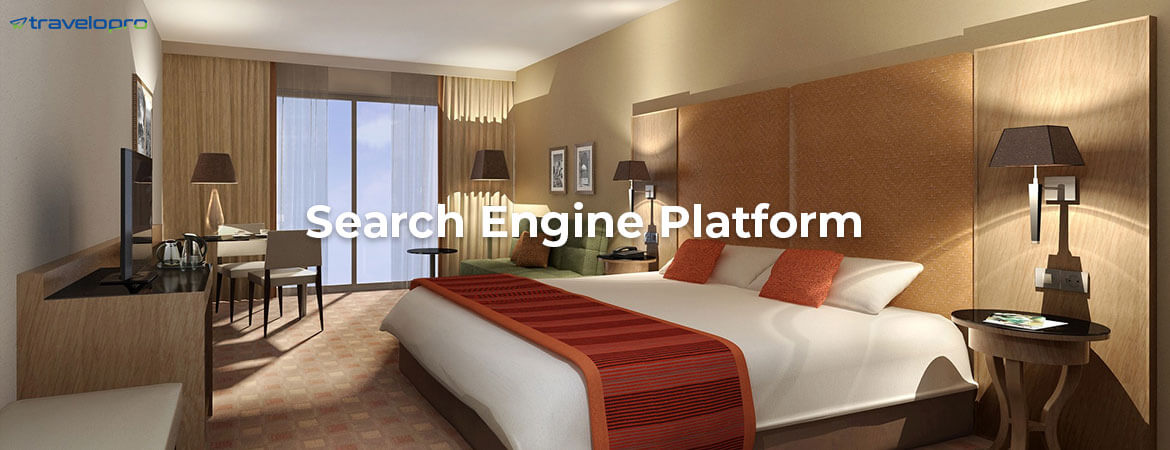
Meta search engines also known as aggregators. Based to customer input data and query these search engines uses third party search engine data to display search results response rather than using individual core resource data like conventional search giants such as Google, Yahoo and Bing.
Meta-search engines provide consumers a time-saving solution for searching for the best deal, through aggregation of several hotel, flight and other travel sources into one website. With new competitors leveraging information at the top of the funnel, meta-search engines turn to new services and monetization strategies.
Therefore metasearchers allow travelers to search and compare comfortably in single place the same prices that they would have found scattered in several websites, after hours of research, the greatest benefit of metasearch engines is to make the consumers decision making process easier and to allow them to find the best price available for the services they intend to hire.
This makes it much easier for travelers to compare rates across several channels to make the most efficient booking decision. The key difference is that metasearch engines don’t directly sell their own inventory allotments.
On a hotel metasearch , all the rates—aggregated from several channels—of all available rooms in a hotel are visible in the search results. This comprehensive approach increases the chances for a hotel to receive a booking.
Some metasearch sites are starting to provide the option of reserving with the hotel directly (such as TripAdvisor). This, thus, offers advantages from both the metasearch and an online travel agent.
In essence, a metasearch engine enables a user to enter a single query and field results from several sources. The idea is that this breadth of information enables users to get the best answers as quickly as possible.
In short, metasearch provides consumers a quick and comprehensive view of product choice and almost instantaneous purchasing options, by directing the buyer to the site providing the option/price he has chosen – seamlessly. This is why it is growing in popularity and this is why all travel product suppliers need to take it passionately.
Why Travelopro For Meta Search Engine ?
Travelopro is the solution to facilitate and manage Meta search connections. Plus, it also optimizes the marketing opportunities. Travelopro not only quickly connects GDS data and content with metasearch engines, but also allows the supplier to manage, analyze, and optimize the campaign.
Our Metasearch engines provide information on hotels and once the guest selects your property it takes them directly to your website where they can complete the booking.
We also offer connections to major regional meta-search platforms. Our meta-search platform also supports various third-party booking engines , central reservation systems and channel management tools .
Whichever connections you select, we make sure accurate pricing & availability is displayed, consistent with your inventory and revenue management strategy. If you prefer, we can handle your meta-search campaigns for you and monitor rate parity too.
We can support your Metasearch business and airlines alike in an easy, fast and sustainable way, so you can connect with just a click and start earning money.
Travelopro is a worldwide travel meta search engine to compare cheap and best flight deals.
One of the world’s leading flight comparison engine and starting point for your OBT business.
Partner with several airlines and OTAs with more than 50 options to provide best and cheap flight availability.
Next generation technology allows seamless transactions for accurate airfare representation and route to partner’s site.
One stop platform which save times and money for both travel agencies and travelers.
Fare aggregator gives value to our partners by providing them business analytics platform.
As a trusted partner, millions of travelers book their dream destination with Travelopro.
Search and book cheap flight tickets at last minute to travel in any place in the world.
Connect to the world leading travel solution to increase your business.
We are a team of travel professionals to achieve the highest conversion rate for our partners.
What Are Major Travel Meta Search Engines, And Who Owns Them ?

Here are the most well-known travel metasearch engines among travelers, which have earned recognition by providing the best user-friendly tools and rates.
Google Hotels
Google Hotels is arguably the market leader. The metasearch engine leverages google maps and Gmail to give personalized recommendations to travelers. Google Hotels brings travelers price tracking and deals directly to their inboxes.
It is one of the most recognized metasearch engines globally, known for its security when buying tickets online. It contains a filter called ‘Everywhere’ that allows the customer to find the best prices and destinations from a particular departure location.
Trivago is a famous engine for hotels and was consistently one of the big players before Google started to overtake the metasearch field. It shifts through hotel rates and availability provided by different booking sites, showing the aggregated results in single place. The booking sites pay them a fee if the customer clicks on the particular deal, which leads to good revenue possibilities for your hotel.
TripAdvisor
TripAdvisor is also a well-known travel metasearch engine. You should have your TripAdvisor account up and running as soon as your hotel starts accepting bookings. The existence of your hotel brand on Tripadvisor provides you wider reach and acceptability. TripAdvisor Metasearch offers travelers direct booking and enables comparison shopping.
Wego launched out of Singapore in 2005. They give support in more than 50 countries but place most of their efforts on the Middle East and India. Their results are generated by searching various OTAs and providing users with all pricing and availability options.
It is one of the most comprehensive engines since it not only acts as a search engine for flights, but also for hotels, cruises, and car rentals, being a good option to book everything in one place. The easy design makes Kayak an easy-to-use tool. Along with, it has a feature for flexible dates and a search option by destination and price.
Wrapping Up:
Meta-search addresses all four prerequisites needed by online travel consumers when shopping for a hotel stay: location, hotel information, customer reviews and real-time rate data and availability.
Meta-search marketing is only the starting of dynamic price marketing in travel and hospitality. Meta-search enables hoteliers to shift share from the OTAs to the direct online channel .
Particularly used in aviation and hospitality, Meta Search Engine platforms present prices and availability for flights or hotels. Collected from several sources, according to the dates previously chosen by customers.
Although, now, meta search engines such as TripAdvisor and Google have started displaying instant booking buttons that enable travelers to book directly from the meta search results giving you more direct bookings.
For support on hotel distribution and technology options, please contact us today.
What Are The Most Efficient Ways To Leverage Metasearch Engines ?
The following list provides the most effective ways to work with metasearch engines.
Displaying updated pricing and room availability
Total spend on clicks
Booking conversion ratios and cost to your organization
Ensuring pricing consistency across OTAs
Monitoring online reviews
Key Benefits of Meta Search Engines are:
Meta search engines increase online visibility across various platforms and enrich your partnerships with OTAs.
As your outreach strategy will cover various channels, you will not be dependent.
Meta search engines enable your own sales page when you don’t want to work with OTAs.
You can promote your hotel cost-effectively as you will pay per click.
Your brand will be on powerful distribution channels that attract millions of travelers regularly.
Typical Travel Meta Search Engines Features:
Real-time online booking confirmations
Worldwide inventory
Several XML APIs Integration
Not require to implement Checkout Process
State of the art centralize product images, descriptions, amenities, location and maps data
Without Payment Gateway Integration
Custom UIs and mobile compatible Responsive Designs
Access the best deals
Easily compare prices
Get your travel business online
If there is one thing you do today, get your travel business online. everyone are talking of going online. provide yourself and your agents with their own b2b/b2c booking engine. travelopro platform consist of many components assembled to get your one stop travel software and travel technology, to automate travel business process and configured in many ways to meet your business goals. here's what you'll get (its affordable, easy and profitable)..
Destination
Fetaures of Online Reservation System:
- Fast and Flexible booking engine
- Secure, scalable and robust reservation architecture
- Fully customized booking engine
- Cost-effective solutions
- User friendly interface
- Integrated Payment Gateway
- Multi-language support
Travel Technology Platform You can trust
Powered by our Industry Leading Travel Technology – Including complete inventory and Global Fares – Travelopro gives you the highest quality travel technology solution to power your brand.

Need an Airline Ticket? Meta-Search is Where Most Travelers Start
By Frommer's Staff
Tribune Media Services
Conventional wisdom says most airfare searches start at an online travel agency or airline website.
But the conventional wisdom could be wrong.
Asked where they begin a ticket query, a new survey points to so-called "meta" search sites such as Hipmunk.com , Kayak.com and Mobissimo.com , which cull fares from multiple airlines and online agencies and then display the choices.
A slim plurality of travelers in a new Consumer Travel Alliance poll (37 percent) say they click on a meta-search site first. Another 35 percent begin with the airlines' own websites, such as AA.com and Delta.com .
About 1 in 5 travelers go directly to an online agency, while only 7 percent call a travel agent and 2 percent visit a search engine like Google or Bing .
The survey of more than 800 air travelers comes at time when a coalition of online agencies is fighting a proposal by Google to acquire ITA Software, which develops airfare search applications for several major travel sites and has its own site, ITAsoftware.com , that is something of a cult favorite for meta-searches.
The coalition, which calls itself Fair Search, claims Google's acquisition will create a monopoly that would raise airfares, and is pressuring the Justice Department to stop the sale.
It also comes as online travel agencies are fighting airlines over how tickets are distributed online, according to Charlie Leocha, director of the Consumer Travel Alliance. None of the major airlines currently disclose their ancillary fees, such as extra charges for baggage, meals and reservations, to travel agents in a meaningful, systematic way. (Full disclosure: I helped found the Consumer Travel Alliance and am its ombudsman.)
Google's pending purchase of ITA would further distort what consumers see through a Google-dominated search, since most meta-search engines use ITA software, he says.
"The airlines move towards obscuring airfares and fees, combined with possible Google manipulation of search results to keep advertisers happy rather than provide unbiased prices, bodes poorly for consumers," he says.
A closer look at the way air travelers buy their ticket suggests they are adaptable, savvy and somewhat frustrated as a group. Perhaps more so than the industry is willing to acknowledge, at least publicly.
"I always start with Kayak.com," says Jack Vanesko, a retiree who lives in Ajijic, Mexico. "Then I go to the specific airline I think I will be using, and make the reservation directly with the airline. I have yet to find an easier way."
Tom Logue, a market researcher from Memphis, plays an agency off an airline when he goes shops for a ticket.
"First I go to Delta, my airline of choice," he says. "If the fare seems outrageous, I will go to Expedia to compare fares, hoping that I can justify a purchase through Delta. Either way, I always buy through the airlines rather than other sites."
Marti Mayne, a frequent flier from Yarmouth, Maine, does it the other way around, beginning with Expedia .
"I guess that's because I'm used to their format and it allows me to scan different airlines and prices and schedules quickly and easily," she says. "I then move on to Travelocity and Orbitz , but usually don't find anything very different there."
But Mayne always books the final ticket through the airline, because airlines take better care of direct-booking customers.
"I've been screwed too many times and ended up having to spend the night in the airport because I had an Expedia-issued ticket, and the airline wouldn't do anything to re-book it when delays occurred," she says.
Barbara Gorman, on the other hand, typically shops for the lowest price.
"I start at Orbitz.com to do a search to see which airline has the lowest fare but then I normally go directly to the airlines site of one of the few airlines I prefer to travel in order to earn my frequent flier miles," she says.
If all of this seems like a game, that's because it is - at least to many of the air travelers who participated in the poll. If there were a place -- either online or offline -- where they could be assured of a reasonable price and service, they say, they'd choose it every time.
"I feel that we have been forced to spend inordinate amounts of time searching online ourselves for the best deal, the best times to fit our schedules so that we can take a trip, and then after we make tentative decisions about those, we have to wade through all the a la carte charges for everything," says Sylvia Prast, an exasperated frequent traveler.
Finding such a place to buy airline tickets could be a tall order.
Christopher Elliott is the ombudsman for National Geographic Traveler magazine and the host of "What You Get For The Money: Vacations" on the Fine Living Network. E-mail him at [email protected] .
(c) 2010 Christopher Elliott. Distributed by Tribune Media Services, Inc.
Talk with fellow Frommer's travelers on our Air Travel Forum.

- All Regions
- Australia & South Pacific
- Caribbean & Atlantic
- Central & South America
- Middle East & Africa
- North America
- Washington, D.C.
- San Francisco
- New York City
- Los Angeles
- Arts & Culture
- Beach & Water Sports
- Local Experiences
- Food & Drink
- Outdoor & Adventure
- National Parks
- Winter Sports
- Travelers with Disabilities
- Family & Kids
- All Slideshows
- Hotel Deals
- Car Rentals
- Flight Alerts
- Credit Cards & Loyalty Points
- Cruise News
- Entry Requirements & Customs
- Car, Bus, Rail News
- Money & Fees
- Health, Insurance, Security
- Packing & Luggage
- -Arthur Frommer Online
- -Passportable
- Road Trip Guides
- Alaska Made Easy
- Great Vacation Ideas in the U.S.A.
- Best of the Caribbean
- Best of Mexico
- Cruise Inspiration
- Best Places to Go 2024

IMAGES
VIDEO
COMMENTS
A travel metasearch engine is a price comparison website that compares hotel rates from different sources across the internet, OTAs (online travel agents) or directly from hotels. It must be noted that these metasearch engines are not a booking channel. They are merely a platform through which booking channels can market themselves.
Step 1: Requirement Analysis. The first step in building a custom search engine is to thoroughly understand and analyze the requirements. This involves working with stakeholders to gather their needs and expectations. The team defines the scope, goals, and specific functionality that the search engine must provide.
An Online Travel Agency is a website that traditionally offers both search and booking capabilities. OTA services usually include flights, hotels, and rental cars, with some also offering vacation rentals, cruises, and events/activities. A Metasearch Engine is one overarching search engine that aggregates data from various sources (including ...
Metasearch helps travelers with one the most important factors when considering travel: price. Travelers use metasearch when they're ready to book, making it a bottom of funnel tool with a high ...
TripAdvisor Metasearch offers travelers direct booking and allows comparison shopping. Skyscanner. Skyscanner is both a metasearch engine and travel agency. The booking tool is quite popular among gen-Z and millennials. Skyscanner offers its users' destination research and booking travel products like flights, hotels, and cabs. Kayak.
In general, however, meta search sites do a better job of finding "airline-site-only" fares than do online travel agencies. On the other hand, online agencies offer air plus hotel packages that can sometimes save you serious cash, whereas meta search sites don't. Bottom line: you need to consult meta search sites, online travel agencies, and ...
Whether it is a price comparison site (metasearch engine) or an OTA (online travel agency), the difference is usually whether only the airfares are displayed and you are redirected to the actual airline site to complete the booking, or whether you complete the booking directly with the online agency and thus do not book the ticket directly with ...
In general, however, meta search sites do a better job of finding "airline-site-only" fares than do online travel agencies. On the other hand, online agencies offer air plus hotel packages that can sometimes save you serious cash, whereas meta search sites don't. Bottom line: you need to consult meta search sites, online travel agencies, and ...
Travel metasearch companies such as Kayak, Hipmunk, Room 77, and, in 2014, TripAdvisor are increasingly using a branded booking model (Book via Kayak or Book on Hipmunk) in which the user can stay on the metasearch site or app to book, although an online travel agency or supplier partner in the background is the merchant of record, handles ...
As the standard methods of doing business — bookings for OTAs, referrals for metasearch — evolve with new technology, the relationship between online travel agencies (OTAs), and metasearch continues to evolve. Metasearch sites such as Kayak originally presented travelers with a spectrum of inventory before sending to an OTA for booking, Now ...
An online travel agency can easily help you find the best airfare, hotel rooms, cruises, and more. These are the best travel agencies to use for booking your next trip. ... Kiwi is a metasearch engine that scours and pieces together itineraries from various airlines (even if they don't have a codeshare agreement), considers multiple airports ...
Meta search engines allow you to increase brand visibility online significantly and higher ranking. For the competitive travel industry, this is very important. Notably, the meta search engine is a sort of an extension of partnerships with OTAs, which increases sales opportunities. 2. Preferential advertising rates.
The competition in the travel industry is always becoming tougher, especially given the disruption caused by metasearch channels. Cross-channel optimizations require strategy and testing between channels so hoteliers can manage multiple channels effectively. Marketing campaigns need to be managed so as to get the required results.
Here's our handpicked selection of the Top 10 Online Travel Agencies you should connect with today! Meta: Metasearch Engines. Metasearch engines have emerged as a crucial element in the travel industry and have closely followed the advent of Online Travel Agencies (OTAs). These engines showcase up-to-date rates of hotels in a particular ...
A screenshot of Tripadvisor hotel metasearch comparing rates from Hyatt, for example, with those on Booking.com, Trip.com, and Agoda. Source: Tripadvisor. For its part, Trivago notched a net loss ...
Step 3 - Build your website for free on WordPress. If you do not have experience with developing, you can hire a travel affiliate web developer who has expertise in the area, like TravSell. Step 4 - Research and sign up with travel affiliate partners. Gain access to text links, banners, widgets and white label search engine codes.
Metasearch for travel? No one was doing it. Until we did. Today, we process billions of queries across our platforms each year for travel information, helping millions of travelers around the globe make confident decisions. With every query, KAYAK searches hundreds of travel sites to show travelers the information they need to find the right ...
A travel metasearch engine is a price comparison website that compares hotel rates from several sources across the internet, OTAs (online travel agents) or directly from hotels. Travel meta search engines offer your best chance to get in-front of those searching for accommodation in a particular location. Metasearch engines act as a middle ...
Travel agency websites selling travel and tourism services. Fare aggregators and metasearch engines ... Metasearch engines often make use of "screen scraping" to get live availability of flights. Screen scraping is a way of crawling through the airline websites, ...
DuckDuckGo: DuckDuckGo is known for its privacy stance, but it's also a metasearch engine that pulls in results from its own web crawler, as well as Bing, Yahoo!, and WolframAlpha. DogPile: Dogpile is one of the oldest general metadata search engines out there. It pulls results from various search engines like Google, Yandex, and Bing.
About 1 in 5 travelers go directly to an online agency, while only 7 percent call a travel agent and 2 percent visit a search engine like Google or Bing.. The survey of more than 800 air travelers comes at time when a coalition of online agencies is fighting a proposal by Google to acquire ITA Software, which develops airfare search applications for several major travel sites and has its own ...
4.7 star rating. Add to Safari. Google Flights, Kayak, and Skyscanner are probably your best bets out of the 24 options considered. "Ability to compare price for many dates at once" is the primary reason people pick Google Flights over the competition.